#like I understand metaphors for 'othering' and the concept of monstrosity but I feel like that gets a little lost if there isn't anything
Text
Can somebody please explain to me what the appeal of vampires is.
#I'm genuinely curious#people seem to go absolutely feral over this concept and I want to KNOW I want to UNDERSTAND#and there are some really excellent vampire aus that I love and I want to love them MORE because I want to GET IT™#because all I see are like...societally conventionally attractive people with fangs. who maybe (depending on The Lore™)#can't go out in the sun. and that just...doesn't resonate with me?#like I understand metaphors for 'othering' and the concept of monstrosity but I feel like that gets a little lost if there isn't anything#actually UNPALATABLE about them. like if they just look like what we culturally have idealized in human appearance then how can#they serve as a metaphor for ostracization or being misunderstood?#is it primarily an aesthetic thing? is it a *danger is sexy* thing?#but ordinary humans can be plenty dangerous too (see: 90% of the female characters I'm obsessed with)#so is it in the sense of you can vicariously experience that danger and heightened emotion in a situation that's removed from reality#so it feels less overwhelming when you're watching/reading the piece of fiction???#like I have seen this used effectively as a metaphor for marginalization (undead murder farce) and an exploration of how society#defines a 'monster' (shiki) but that doesn't seem to be the way most people or works engage with this concept#is it just that people like when characters are covered in blood because I DO understand that one lmao#I just feel like vampires have been branded as a Key Aspect of Bisexual/Gay Culture and I feel like I am on a separate plane of existence#because It Is Not Clicking For Me#(tbh I feel like there are a lot of Quintessential Queer Experiences™ that don't apply to me but. that's a whole separate thing.)#ANYWAY would love to hear people's thoughts!#I am cooking up a Meta Post™ about fandom reaction to the concept of monstrosity and I want to gather as much information as possible
9 notes
·
View notes
Text
As the "dealing with grief and other big feelings dredged up by the 🌟Gay Pirate Show🌟" thing appears to be sticking around I thought it was time for a master post about my new favorite thing:
Healing thru fanfic!
I should say up top that a) I usually prefer fic that's canon-compliant or only slightly canon-divergent, especially for healing purposes because I think it helps with immersion and b) the list is short right now but it's definitely gonna grow as time moves on. Anyway, recs beyond the cut:
Fallow Land & Bigger Sky: I've already mentioned before how reading (and sitting with and processing) Fallow Land & Bigger Sky was so incredibly healing but here I am, doing it again! And even if the emotional appeal doesn't get you to read it, you should try it for the beautiful imagery, poetic writing, and carefully and lovingly crafted (and canon-compliant) character study of one Edward Teach.
It's the kind of writing that makes contemplative manual labor, stunning vistas, a mischievous nun, a cute little black lamb, and gallons of homebrewed wine all feel as essential to the fandom experience as any other way we spend time with our blorbos. I literally cannot believe how beautiful and well-executed this story is sometimes.
Brace Yourself and Nestle into Me: I literally just read this one this morning, and it's actually what inspired me to make this post. The premise is that Ed and Stede figure out that they're into each other around episode 7, and they're deliriously happy to know that they feel the same way about each other. But Stede has some (understandable) sexual dysfunction around being queer thanks to the horrible society that he grew up in. Ed is a darling trying to help him through it all, and along the way he realizes he also has some of his own hangups he needs to work through together.
I appreciate that this one doesn't treat healing like a straight line because it never is, and emphasizes that trust can't just be implicit, you really have to talk it through as a crew, even if it's just a crew of two broken middle-aged men who are desperately in love with each other. It also gets into some of the stuff I've been talking about on here about grieving your former selves and the selves you never got to be, which was validating as hell. That sounds heavy and there are concepts that are literally part of modern therapy modalities woven into the story, but there are also warm and loving and hilarious moments too, including this gem:
“Also can you just imagine how proud little horny baby gay Stede would be know you would be to know that whatever he went through, today you’ve got your own ship and are getting completely railed by Blackbeard? I mean, just absolutely dicked down by the most famous pirate in history? He would lose his mind.”
To paraphrase the author notes, the "Healing Power of Gay Sex" won't fix everything, but I put it to you as a reader that reading and thinking about it also helps. And sometimes it can shake something loose you didn't know you were holding onto! Which is great!
Adrift Between the Dreaming Seas: Based on my usual filtering on ao3 I probably never, ever would have come across this fic if it weren't for a recommendation someone posted on this hellsite. It's got fantasy elements, allegory, metaphors stacked on metaphors, talking animals, and so many other things that would have kept me from ever discovering it on my own. My life would be poorer for it.
Basically Stede is cursed to be a lighthouse keeper on an island that seems to move around the world. Animals show up and the ones who talk to him are members of the crew, and Ed is an actual kraken. It's all this symbolism about monstrosity and trauma and maladaptive coping and the messiness that is Stede's kindness scraping against his self loathing. I shed tears of many kinds along the way, and it made me think hard about community and recovery and the things we do to and for ourselves and others.
It's just a lovely little gem of a story that made me feel so much so deeply while also making me laugh much more than I was anticipating. I'm so glad I gave it a chance.
[that's it for now, more as I keep up my deep dive into the ao3 archives]
#fanfic recs#go ahead and grieve yourself#let's heal together yeah yeah yeah#my therapist would be proud#healing through literature#disenfranchised loss#never underestimate#the healing power of gay sex#ofmd#our flag means death#gentlebeard#blackbonnet#edward teach#stede bonnet#our flag means death#ofmd fanfic#ofmd meta#grief#grief processing#shit to talk about in therapy#don't be afraid to bring up media that speaks to you in therapy#therapy#therapist: 1 me: 0
18 notes
·
View notes
Text
The Subtle Horror of Evangelion
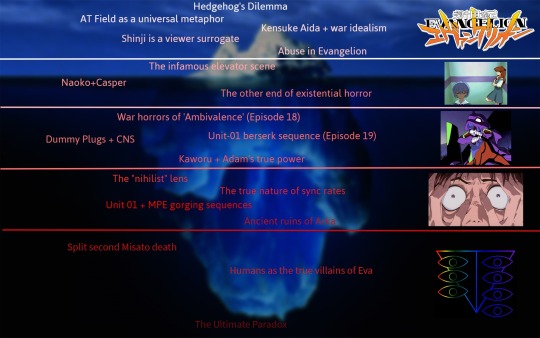
What keeps us all hooked to Eva time and time again? You get through your initial, confused watch of either Evangelion endgame, probably sometime in your adolescence wondering what the hell it is you just watched. The original source material is suffused with unsettling imagery, and sometimes too-close-for-comfort shorts. It’s so much to process that one watch is never enough. The imagery isn’t enough, however, because the mid-to-late-90s series comes with things you’ll pick up the more you focus on certain characters’ struggles or the interesting world-building. They arise little by little with every re-watch, adding onto what interested you in Eva to begin with.
There’s always that little voice asking you “What it is that really draws me here?”
Oh. The horrors.
The tragedy of it all.
These things never leave you the second you bear witness to them, whether you become aware of them or not. You’re disturbed over it, a tad worried, no doubt, but you’re strangely hooked.
Horror works better on limitation, it’s why found footage capturing pale, ghastly, monstrosities of the deep wood will always stand as exponentially terrifying. While most all of us have taken cracks at Eva’s budget at some point, that’s what really drives these terrors home. Its low budget nature made it work.
Evangelion has commentary which forces a viewer to reflect. Most no one enjoys that. It’s the fear, however, that has its audience come back. Evangelion’s reflection alone isn’t what gives Eva it’s charm decades after its run. It’s the little things, most everyone misses, the anxieties, the terrors, all of it. Most of those things, fly over a lot of fans’ heads.
Buckle up, there’s a lot to go through…. (warning for mentions of abuse, body horror, means of suicide, nudity, blood, and gore)
Table of Contents
I. Icebergs for Dummies
Tier 1: The Tip of the Iceberg
II. The Hedgehog’s Dilemma
III. The AT-Field as a Universal Metaphor
IV. Kensuke Aida + War Idealism
V. Shinji is the Audience Surrogate
VI. Abuse in Evangelion
Tier 2: Just Below the Tip
VII. The Infamous Elevator Scene
VIII. Naoko + Casper
IX. The Other End of Existential Horror
Tier 3: The Body of The Iceberg
X. War Horrors of ‘Ambivalence’
XI. Unit-01 Berserk Scene
XII. Dummy Plugs + CNS
XIII. Kaworu + Adam’s True Power
Tier 4: Pre-Abyss
XIV. The “Nihilist” Lens
XV. The True Nature of Sync Rates
XVI. Unit 01+ MPE Gorging Scenes
XVII. Ancient Ruins of Arka
Tier 5: The Abyss
XVIII. Split Second Misato Death
XIX. Humans Are The Villains in Eva
XX. The Ultimate Paradox
XXI. Conclusion
I. Icebergs for Dummies
For those unaware, the iceberg image illustrates that things are much deeper than they appear, just like an actual iceberg. You’ve probably seen this selfsame iceberg--- separated by tiers--- a few times looking through late night internet rabbit holes (Putting it out in the open: I’m personally guilty of this!), fictional or non. It helps you understand why you’re so enticed to certain material, that you’d revisit them. The highest parts of the iceberg are the things in the material most everyone knows, the surface level stuff. The lower you go, however, the lesser known the parts of the material are. These are the things the person are aware of.
Eva has some iceberg illustrations if you look around, albeit they don’t go through the more saddening, sometimes graphic factors of Eva, only theories navigating through Eva’s universe. Evangelion is so deceptively packed with blink-and-you’ll-miss-it subtleties that if an iceberg were centered on that, the diagram would be packed. And I’m being generous as I write this.
A few ground rules, before we begin: The iceberg will deal with the more obscure and dark material as the tiers get higher rather than it only being relegated to obscure bits. The lower the tier, the higher the iceberg and the more subtler the anxieties which graduate into horrors the deeper you go.
Yes, Evangelion is occasionally horrifying. No, Evangelion is not lovecraftian. I think people use the term lovecraftian way too freely. It’s not enough to see something with (sometimes too many) limbs twisted in ungodly angles. Or legs where legs shouldn’t be. The same applies for creatures assuming forms we don’t entirely comprehend. Eva has never delved into the angels being incomprehensibly terrifying specifically because they come from a cosmic expanse.
Some of these actual horrors, big and small, hit you after adolescence, something that makes you feel deeply for the characters’ dilemmas. It’s a feeling that grows and sometimes aches, rather than fades over time for many of us.
Tier 1: The Tip of the Iceberg

II. Hedgehog’s Dilemma
III. The AT Field as a Universal Metaphor
IV. Kensuke Aida + War Idealism
V. Shinji As the Audience Surrogate
VI. Abuse in Evangelion
II. Hedgehog’s Dilemma
Evangelion has its hand in so many psychological and philosophical cookie jars, from Freud, to Maslow, Johari, as well as Dostoevsky. The very tip of the Subtle Horrors of Evangelion Iceberg is something viewers are introduced to in the fourth episode of the series. It is one of the many psychological concepts dotted throughout the original show. Out of all those psychological concepts, this is the most explicit and most recurring.
The Hedgehog’s Dilemma describes the conundrum of two hedgehogs. The closer two hedgehogs become to one another, the more they harm each other with their spines. If you want to properly live, you need the closeness and intimacy of others. By allowing yourself to be close, however, you end up at great risk of being hurt. It’s the very reason what drives those who live to become guarded. Being perpetually apprehensive or building up walls isn’t a remedy for pains, however. The Hedgehog’s Dilemma isn’t just about why people become guarded after relationships ended on bad notes. It’s about the overall inevitability of pain.
Life is a continual push-pull of relationships, because we’re all creatures of comfort. We guard ourselves to varying degrees and sometimes even tell ourselves we won’t get close again, but personal comfort is one of our most ultimate drives.
The Hedgehog’s Dilemma not only describes that harm happens to us anyway, but illustrates that because comfort is universal we seek companionship regardless.
III. The AT-Field as a Universal Metaphor

The AT-Field is the most crucial rabbit hole in understanding the largest meta-narrative of Evangelion.
If Hedgehog’s Dilemma explains the what and the why people become more or less guarded, then AT-Fields explain the how. People build up walls around themselves all the time. You walk away from someone because they crack a smile at you... and it seems off.
Because you feel an anxious pang.
That’s an AT Field.
AT-Fields, or Absolute Terror Fields bear a few metaphors, one of which being boundaries. You see it as Shinji’s fear of becoming intimate, knowing the future implications or Asuka’s masculine protest (putting up a front). We can see an excellent example of the AT Field used by Asuka, her “Wall of Jericho” in episode 9.
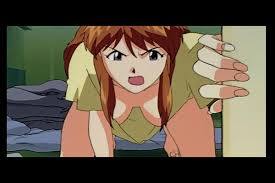
You also see it manifested through the angels, the strange creatures in Eva who supposedly desire to merge with Adam, their mother. Seeing this in the angels makes you realize that the AT Field is actually a metaphor for boundaries which implicates us all. In episode 22, Arael, 15th angel, seeks to understand Asuka. The angel uses its AT-Field (a beam of light) no, its boundary, to breach Asuka’s boundaries.


AT-Fields can be used to not only build up personal walls but to breach them as well. The irony of Arael’s action is that Arael’s AT-Field being erected while it floats just over Earth’s gravitational field makes it immensely similar to the Second Child; they’re both guarded.
The AT-Field is a funny sort of thing because it also sometimes explains how two people who are so alike can be guarded from one another. Sometimes you gain contempt for someone because they’re too much like your least favorable traits. You see this with Shinji and Asuka, both children without their mother desiring validation. Shinji calls Asuka a child midway into episode 9 and Asuka isn’t shy on voicing ideas of Shinji as dense or immature. They’re throwing stones in glass houses.
AT Fields are used to get the user out of dangers both physical and perceived. Sachiel, 3rd angel in the original series’ pilot episode, uses its AT-Field, in the form of flotation, to get itself from enemy fire. It never shows this until it is attacked first.
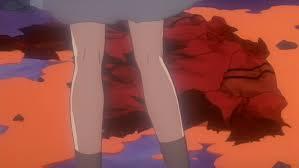
AT Fields are also responsible for one’s identity and physicality in Eva. Without the AT Field you don’t really exist. When Rei assumes the form of the person the character being cast into Instrumentality loved most in End of Evangelion, she’s causing the character to give up their AT Field. With that gone, they lose their physicality, turning into LCL (given the lovely term ‘tanged’ by fans). The ‘tanged’ individual suffers metaphorical death. Evangelion argues that in order for one to exist, others must perceive you and you must perceive you, a point best illustrated in episode 16. Since everyone is converted to LCL, no one really ‘exists.’ Rei describes this unnerving state as the inability of differentiating who you are and others, since everyone lacks a physical state without AT-Fields. Metaphorical death can be argued as worse than physical, since we all exist to make an impression of some sort. It’s what ties all the Eva cast together and the cause of their dilemmas. Validation. You can be living, yet very much forgotten or simply unknown.
There is living and there is “living.”
You can’t “die” unless someone knows you. You were never there.
AT Fields are the thing that make us live, but as a drawback, prevents us from understanding each other fully. Kaworu states in episode 24 that AT Fields are the wall of the mind and the heart of the soul, an unapproachable piece of sanctuary. When all else is taken from us, all we have left is our place of respite.
I’d also like to pitch the saddening reality that the AT-Fields are what prevent us from understanding angels as a whole, our genetic siblings as scared of this world as we are. The psychological angels want to understand us, that much is true. The angels, however, use forms of communication at the expense of our boundaries. Because people greatly value boundaries it makes it hard for us to comprehend angels. The creatures are hardly malicious when you realize they wonder why we all do things that actually hurt us, as well as the fact that they do understand our minds. But, because they breach our boundaries, we become even more wary of the (mostly) unknown. Angels may be us, but the strange forms they take are something we aren’t familiar with. The feeling is mutual with angels, wondering why there are many of us, our forms and outward appearances so identical. It’s a truth as old as time that we all fear the unknown.
The anxiety of an AT Field means comprehending that there’s very little chance to 100% get others. Because we’re all wary in some degree, because we’re set in an idea or perception of someone, even if the someone in the past no longer applies. It’s not healthy for you to continue dwelling on relationships not meant to be, keeping yourself up at night asking why, because both of you have closed off each other for good. There’s always that chance the other can come back and if they do seek to understand despite past hardships, that’s good. If they don’t, all you can do is move on and accept it.
IV. Kensuke Aida + War Idealism
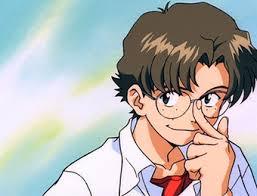
Kensuke is one of Shinji’s classmates, a supporting player in the series. He’s close with Toji Suzuhara, a boy who takes his anger on Shinji, after finding out that his sister has been injured during Shinji’s fight with 3rd angel Sachiel. As Suzuhara beats him down, Kensuke downplays the incident. Kensuke’s and Toji’s relationship is particularly interesting because the latter is affected to some degree by war (the war by humanity to prevent our destruction by angels). Kensuke glorifies the sentient, implicitly eldritch, multi-armored war-machines.
Kensuke can be best described as the ‘wow, cool robots’ drawing you’ve probably seen floating around. This is in relation to Gundam’s war commentary, but replace Gundam with Eva. Kensuke is enamored with the Evangelions and totally, willfully ignorant to the war horrors. Adolescents are forced to be the salvation of humanity, feeling every bit of damage to their own bodies whenever the Evangelion takes any hurt. Even after the war for humanity is long over, the pilots will be afflicted with traumas that will always hang over them.
Kensuke’s glorification is also what draws him to be Shinji’s friend. He uses Shinji’s status as a way of becoming a pilot himself by meeting up with Misato, putting himself at the cockpit of a strange creature magnificent machine.
When Toji becomes hospitalized after his battle in a hijacked Unit-03 vs. A Dummy System-controlled Unit-01, Kensuke expresses discontent at not being a pilot. He’s annoyed because “everyone” but him is a pilot.
Thing is, Kensuke isn’t heartless, just ignorant. Idealism is one of the uglier things that runs thick in the heart of Evangelion. His is one of many cases of unhealthy idealism in Eva, another example of making it difficult for those living to understand one another.
V. Shinji as the Audience Surrogate
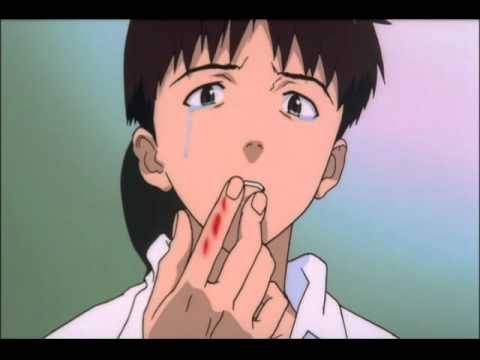
Shinji as the audience surrogate isn’t always touched up on, but is sort of understood subconsciously by a lot of the viewers. Shinji’s character is specific, yet so generalized that him being a surrogate for the audience just… works. Don’t believe me? Shinji gets two psychological exploration-based episodes whereas Asuka and Rei each have one. Episodes 16 and 24 are both psychological angel episodes, albeit the latter is more in-series subversive. The 24th episode doesn’t involve a breach of subconscious boundary, but the pilot (Shinji) is in the hot-seat, being made aware of their issues. Leliel, 12th angel, contacts Shinji in the former of these. Both characters talk to one another, shown as a series of horizontal lines and vertical lines, sometimes intersecting. These lines are a strong reference to the Johari Window, a tool in psychology which helps someone become more aware of themselves. The Window’s quadrants are as follows
1. the part known to the self
2. the part known to others
3. the part known to the self and others
4. the part known to no one
Leliel also states that the self only exists of one perceives themselves as well as others. The angel also states that Shinji could better his reality, to which Shinji absolves himself of responsibility by arguing the horrible state of his reality. It’s a subtle pushing to Shinji and by extension the viewer into free will. Kaworu builds up on these concepts with Eva’s in-universe concept for boundaries. Free Will versus Determinism is brought up here, with the idea that AT-Fields are brought up because the living (again, not people – emotional complexities aren’t only human) will them into existence. By exercising free will, it means enduring pain, one of Shinji’s, and again the audience’s greatest fears. Any relationship has pains and conflicts. This is all a buildup of free will, determinism, self-awareness, and the Hedgehog’s Dilemma. Understanding all of these means swallowing the “pain is inevitable” pill. The problem with much of us is that we like the idea of relationships rather than being in one. We want to feel validated but without the conflict, even if the conflict can be solved. We’re all Shinji because we’re all aware to life’s hellish catch-22s, so we run. There’s times in our lives where we run as far as possible from these woes, these truths, but there’s pain in running too. It’s why escapism seems like such a viable action for some of us.
Pain is inevitable, but pain can be mitigated.
More damning evidence to Shinji being a viewer stand-in lies in either endgame of Evangelion (pun intended). In EoE, after the Komm Susser Tod sequence of everyone on Earth being tanged, we’re treated to a shot of EoE’s live audience.
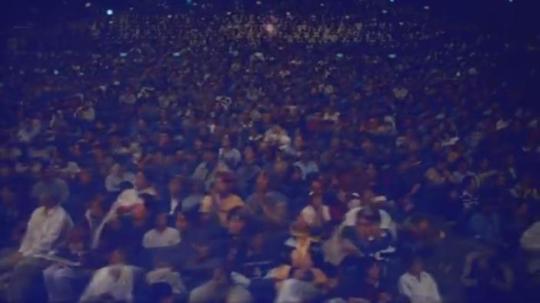
We hear Shinji’s voice about his reality while he talks to Rei toward EoE’s end. There are shots of the city, of people going about their daily lives cementing that this is about us. End of Evangelion shows us a less favorable side of Shinji, a departure from the lauded end series “Congratulations” scene, in which he does understand free will rather than perpetually dwell on negatives. Shinji reacts unfavorably toward Asuka in EoE after his mother’s speech to the audience that ‘anywhere can be paradise’ and Shinji stating he doesn’t know where his happiness resides. Shinji (We) still has a ways to go if he wants to be a better person.
It’s probably why many of us are either inclined to champion Shinji or harangue him, and either reaction is fair. Many of us are aware of audience surrogates, but never to this extent. Shinji isn’t his best person, but he can be. Being his best means self-reflection. Droves of people who first were exposed to Evangelion were teens, and again many of Shinji’s woes are specific yet so generalized, hence our feelings of defense and possibly disgust.
No one likes scathing, yet accurate call-outs on their person, but they’re paramount for us to understand ourselves and others.
VI. Abuse in Evangelion
One of the worst things recurring in all of original Evangelion is a bevvy of abuses.
Abuse comes in many shapes and forms and it’s many characters’ realities. Abuse happens not because the universe ‘wills it’ (determinism aka, ‘that’s just how people are’). Abuse, be it conscious emotional absence, actual neglect, among other ungodly acts fly though the cast.
Abuse is cyclical and a lot of those doing it often get away with murder because they have power.
Much of Eva is comprised of children being forced to sort through adults’ emotional baggage. Those children become adults and the cycle continues.
We all know a Gendo. Or even perhaps a Misato. Hell, even a Ritsuko.
Anno states that Gendo’s character is of a societal meta-text, which explains many viewers’ ire in relation to the character. He’s responsible for many of the seedy goings-on in Evangelion be it the financial (see: Jet Alone’s orchestrated out-of-control nature to give NERV more funding) or abuses (see: Rei, Shinji, Ritsuko, and, Naoko). It’s for this reason why Gendo’s actions are a sore spot for a lot of fans.
Anno: I’m not sure that it’s a real father [that Gendo represents]. Well, not a father in the sense of a parent with a blood relation to his child, but more, I think, [in the sense of being] a representative of society or the system. That’s why he has that expression.
Takekuma: So, he’s kind of amorphous.
Anno: The angels are the same. I made them appear amorphous in that way because, for me, society is unclear, the enemy is unclear.
Takekuma: Gendo is [a representation of] the boundries or the pressure of society itself.
Anno: That might be it. Perhaps Gendo is [a representation of] society itself.
http://wiki.evageeks.org/Statements_by_Evangelion_Staff
After many re-watches of certain Eva episodes, it just hit me, as I’m writing this why I’m sometimes apprehensive on an adult-exclusive lens of the show. This happens a lot in adolescence and our struggles are made trivial because of the mishandled baggage. As children, you’re meant to be subservient to parental whims. You have this sort of obligation to solve their problems. Give them closure. It doesn’t even need to be parental baggage, but just from adults in general. You see the way the adults act not just with the children but with each other. You see the way Gendo justifies neglecting Shinji, objectifying Naoko and Ritsuko or Naoko’s emotional absences as a mother to her daughter (also manifested through the MAGI). It’s these immature excuses as to why they can’t extend empathy to those around them.
It’s always excuses.
Eva’s original series has always been a show about children.
Tier 2: Just Below the Tip

VII. The Infamous Elevator Scene
VIII. Naoko + Casper
IX. The Other End of Existential Horror
VII. The Infamous Elevator Scene
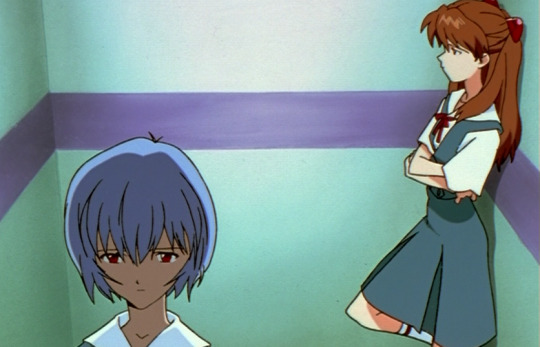
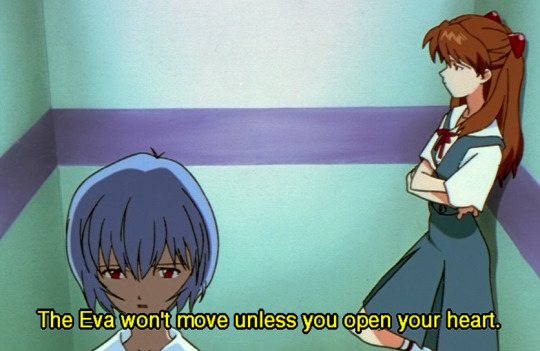
The Elevator Scene is a sequence that sometimes gets glossed over due to Evangelion’s fleeting budget. It took me years to realize the true gravity of the awkward silence of both the 22nd episode and its Director’s Cut version. The Director’s Cut version has Asuka abruptly jerking in the silence, but that blink-and-you’ll-miss-it moment speaks volumes. Understanding the scene means understanding why Asuka quietly stews in her anger. Understanding why Asuka stews means understanding Asuka from her debut to her emotional breakdown.
Asuka’s appearance in the 8th episode, Asuka Strikes!, is marked by a bold persona that carries on until the end. She isn’t shy on imparting her prowess to Shinji, stating that Units 00 as well as 01 were the prototype and the test type, respectively. Her Evangelion, Unit-02 is the finished product. She even states that she graduated from university. Despite these impressive feats so early in adolescence, the only time in which they’re noted is when Asuka talks of them. Misato takes in both Shinji and Asuka, but only ever “dotes” on Shinji. Gendo pays attention to Shinji because he pilots Unit-01, and 01 contains the soul of his late wife. Rei is the clone of Gendo’s late wife, hence Gendo’s attention and overall creepy, selfish obsession with her. Asuka and Shinji’s relationship, with Misato as their caretaker strongly mimics a Golden Child and the Second Fiddle. The only difference is, Shinji gains more attention due to Gendo’s and Misato’s respective baggage. Again, Eva is a series where children are forced to handle the baggage (with no break in the cycle) and when the child doesn’t have anything the adult particularly can clue in on, they become neglected.
That’s Asuka’s dilemma.
It’s why Asuka forces herself to grow up.
It’s why Asuka is driven to be competitive to Shinji and Rei, later growing contemptible at both.
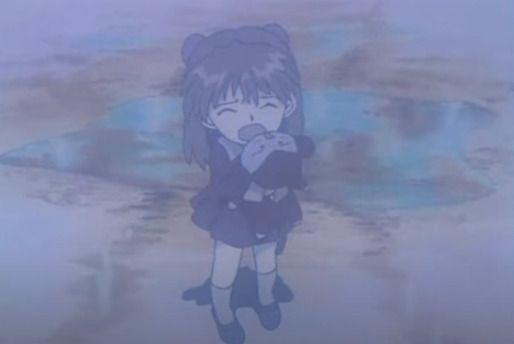

Asuka suffers a few curses, one of which being the youngest, the inevitability of being consciously sidelined dawns on her, leading to her selfsame breakdown toward series’ end. She aligns youth with trivialization, so naturally, she’d front with the opposite. She never gets help in relation to her period. Misato and Ritsuko realize something is up with Asuka but they never really offer her the support.
There’s also the flashback to her trauma in episode 22’s beginning. She’s replaced by her mother post-Contact Experiment (which led to a deterioration of her mental health) via a doll that looks like her, red hair in pigtails. It’s the leading factor to her feigned boldness, her ego. The way in which she is marginalized in the series brings it all back.
Rei breaks the silence with a few words of compassion and all Asuka can do is express disbelief. She mistakes compassion for contempt.
For pity.
The idea that anyone would extend kindness, especially now of all times, is unbelievable.

Asuka also experiences a dilemma here, a dilemma those like her face. She already knows what it means to be vulnerable and deeply hurt, but she needs to make herself vulnerable because now, more than ever, she needs the support. Being vulnerable will cause past traumas to flood back in full force, but by stewing she deprives herself of any support. Rei offers that support, but a few words of support in a wave of trivialization can’t help but feel a bit too strange.
Asuka’s greatest anxiety is realized in the twenty second episode. It’s of being and staying second fiddle, that she’s always been set up to fail. Even 2 episodes after the fact, in which she actually starves herself does she realize once more how she’s permanently ‘below’ others.
Asuka’s curse finds itself in real life, and it’s for that reason why I believe some find themselves resonating with her. Asuka’s gradual descent into bitterness is something I find myself waking up some nights thinking about after 7 years going through Eva; hers is a cautionary tale on being emotionally distant to cries of a damaged youth. Casually imparted knowledge of past achievements, and the competitive attitude mixed with embitterment, some of which from a genuine place but also a product of neglect. We were forced to play second fiddle, we forced ourselves to grow up to feel more legitimate, forced to carry an ire that stews because it seems no one listens.
VIII. Naoko+Casper
The late Naoko Akagi is a woman of multitudes. Those multitudes are compartmentalized into the 3 MAGI. They are Balthasar, Melchior, and Casper.

Casper shows itself to be the most prominent aspect of Naoko’s personality, her as a woman. Ritsuko states that, after the defeat of Iruel, 11th angel, that Casper is the part of her mother which remained that way to the end.
Balthasar and Melchior have been bested, be it by rival MAGI, or Iruel’s assault. This calls back to the fact that Naoko’s other facets aren’t anywhere near as prominent. Naoko has cited her own emotional negligence, of only showing emotions should it ever benefit her.
Casper on 3 occasions fights tooth and nail, Iruel’s assault, an attack by multiple MAGI in End of Evangelion or the defiance of Ritsuko activating the self-destruct sequence. Ritsuko does this to seek vengeance against Gendo for coming to the immense realization that he never genuinely cared for her. Gendo has always used Ritsuko for her body. This would destroy NERV, meaning killing herself and Gendo.
Then you realize why Casper overrides the sequence.
Casper’s stubborn behavior wasn’t actually to defend NERV but to protect Gendo. Casper’s defiance aka Naoko’s emotional absence toward her daughter allowed Gendo to kill a bewildered, rightfully angered Ritsuko.
The saddest part of Casper’s, no, Naoko’s choice is that Naoko got away with murder. Evangelion is a story about children dealing with the selfishness of adults and the adults never receiving justice for their wrongdoings. The relationship between Ritsuko and Naoko is an excellent example that this doesn’t just implicate the young pilots. Ritsuko dies in End of Evangelion with the truth that her mother, as a woman, in the end chose the man who manipulated both of them.
IX. The Other End of Existential Horror

Some spend their whole lives trying to make a mark. Others can’t help but be known.
People get smart sometimes to get themselves out of a current situation. Kaworu and Rei’s existences are such that they’re deadlocked from living. Their existences are the product of an experiment, to be later heavily watched and raised as the Last Messenger. The latter is the result of Gendo’s obsession with his late wife.
Kaworu and Rei’s existential crises are opposite from the rest of the cast; while others do their damndest to become known, they cannot be unknown. Rei’s character centering more around her identity than other characters is also initially and sneakily alluded in the opening.

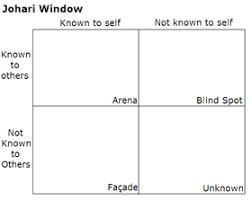
The Johari Window is a tool encouraging self-awareness in the person, alluded to twice in the show, with the second time being in the sixteenth episode. Both usages of that illustration, for Rei, and Shinji drive home crucial aspects of the meta-text.
This would also tie Rei to Shinji in End of Evangelion forcing Shinji to reflect on his own awareness and will. Rei is an astute, young girl whose arc is about her personal relationship with identity, something she is all too familiar with due to her objectified nature. Rei’s arc is even more so entrenched in identity than other characters that she is one of the characters imparting personal and universal realities.
Ayanami Rei’s existence from start to finish is inundated with the issues of others, causing her to internalize being always expendable. In Rei’s Poem in episode 14, it becomes clear that she sees herself based on usage. She likens herself to a field of flowers, which slyly alludes to the Dummy System’s “parts” 9 episodes later, other Reis.

Rei is seen as malleable vessel which houses thoughts rather than her own person and she can’t do anything about it. So she resigns to her reality. Even if she does tell off Gendo in End of Evangelion for his objectifying, she’s not even out of the woods. She never will be.
I used to think Rei’s “slap” to the face to the man with the (most) baggage was empowering. Then I learned about abuse during adolescence, how kids who lack a support system act while away from their abusers. Even saying an emphatic “fuck you” to your abusers isn’t enough to be a happy ending. Rei is a girl who lacks a support system and she suffers from it. Start to finish.
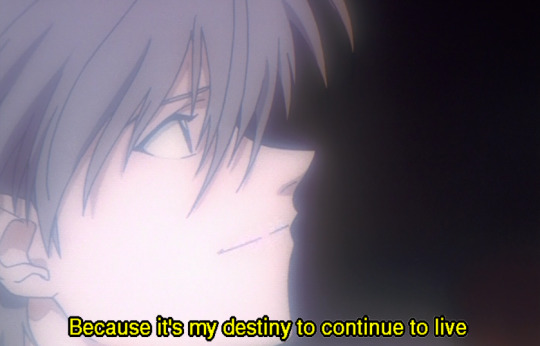
Kaworu’s crises are much trickier to pinpoint because there’s so little to work with. He doesn’t get an episode dealing with personal, subconscious explorations. Getting his character means first getting how Evangelion re-contextualizes what “Ode to Joy” symbolizes. It also means understanding the AT-Field and most people won’t pick that up on an initial foray. Or maybe even a second. Most people don’t pick up that the AT Field implicates anything living and physical or its metaphor for boundaries and identity. There’s the common misconception that Evangelion is a “human” show.
Kaworu marks off his appearance humming “Ode to Joy” while Shinji wonders who to turn to. It’s a song generally known for its jovial nature, but most importantly, Ode to Joy is:
known also as the “Choral” Symphony. Its finale is a musical setting of Friedrich von Schiller ’s “Ode to Joy,” a hymn to the unity and freedom of humanity.
http://www.dictionary.com/browse/ninth-symphony
The Choral Symphony assumes a more horrific context later on. Kaworu is the last messenger and what his action is would lead to the mass annihilation to lilin/human or angels. ‘Unity of man’ is changed in Eva’s context – it marks either unity of man or the death of man. It doesn’t matter who Kaworu allows unity to, because his hands would be stained with death anyway. Then you realize why Kaworu deploys his most powerful AT Field during his descent to Heaven’s Door.
This is his reality.
Kaworu’s status as the Angel of Free Will isn’t about him being the only complex angel, as a lot of people think. It’s about being the sole individual handing that freedom to others.
You realize his terrifying dilemma goes to the tune of being feared for his own existence as an angel (which he notes to Shinji) and not being able to properly live.
Sometimes you ”hurt” people by existing.
Sometimes people hate you for the simple act of existing.
Kaworu’s and Rei’s terror is the other end of existential horror, that you can’t help but forced to be known. Sometimes you have knowledge but aren’t allowed to do much with it.
Tier 3: The Body of The Iceberg

X. War Horrors of ‘Ambivalence’
XI. Unit-01 Berserk Scene
XII. Dummy Plugs + CNS
XIII. Kaworu + Adam’s True Power
X. War Horrors of ‘Ambivalence’
Episode 18 is where anxieties graduate into horrors both implied and visceral. Unease hangs over the episode, with the mystery of Unit-04’s disappearance and tests being done on Unit-03. Misato tells Shinji that because tests would be done, there’d be a pilot there. Misato uneasily withholds this info from Shinji and Kensuke breaks the silence with his recurring desire of being a pilot, still ignorant of the war horrors. There’s a subtlety that Shinji picks up on with Toji but not enough to put two and two together: that the big-eater himself isn’t feeling so hot.
The continual chirp of cicadas and birds nor the peel of the school bell are enough to break the unease of the viewer or of Toji. Toji goes from indirectly being affected by war vs angels to being chosen, drafted even, a child at the first line of defense for the apocalypse. We get a flashback of him beating down Shinji, before it cuts back to present day Toji. He will be in Shinji’s shoes.
Toji balls a fist, a recurring theme in Eva, to the tune of “What is your hand for?” Toji is finally about to take things into his own hands.
Asuka takes a few cracks at Shinji to Hikari that he hasn’t quite gotten the memo, but when Shinji asks her even she’s halted in words.
Then the day comes.
Tests are being done and suddenly Unit-03 goes rogue with Toji in her (note the Evangelions have the souls of the pilots’ mothers, save for Rei). Unit-03’s’s strange behavior is revealed to be the work of the 13th angel, Bardiel. Shinji’s ignorance is made worse by Misato’s absence (with Misato telling Ritsuko she’d tell Shinji the pilot’s info after the tests). Units 00 through 02 are sent out for the new threat and Shinji sees this new threat. Anxiety rises.
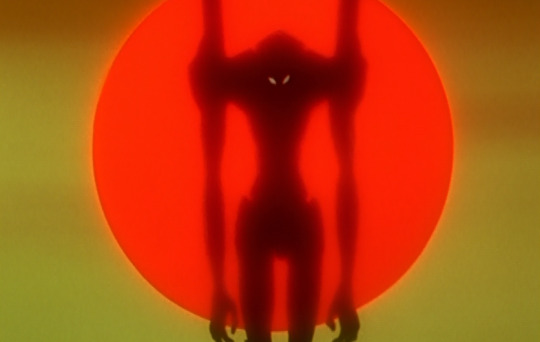
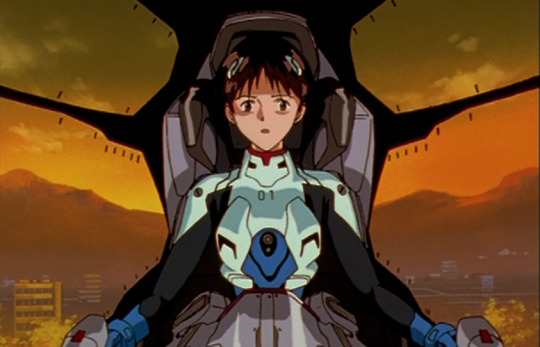
The song “Marking Time Waiting for Death” accentuates the anxiety. Unit-03’s silhouette eerily contrasts with the sun, her body slightly hunched and approaching slowly.
Fear washes over Shinji when he deduces that with an Evangelion inside, there must be a pilot.
Yet he still doesn’t know.
The other pilots are aware, and show reluctance to the revelation. A hijacked Unit-03 sets herself on Asuka, Rei, and even strangling Shinji. Shinji allows the angel-hijacked-being to strangle him, because killing another human being is simply horrific.

Eva has its hand in the war morals cookie jar here because Shinji stands at a conundrum, to other let this creature take his life or to murder flesh and blood. This dilemma goes double-time in war. Gendo asks why Shinji hasn’t dealt with the 13th yet, with a somewhat horrified Shinji pleading about the pilot. Gendo commands for the unfinished Dummy System to override Shinji’s controls and then suddenly...silence….
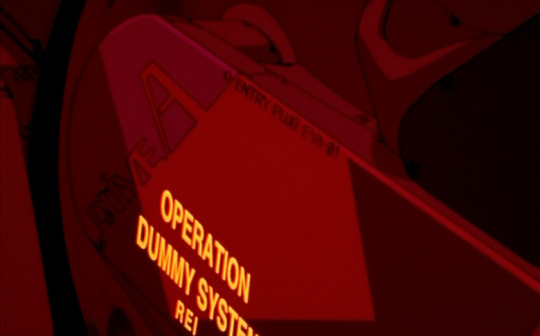
The Dummy Controlled Unit-01 springs back and we’re treated to a close-up of Unit-03/Bardi3l being strangled.


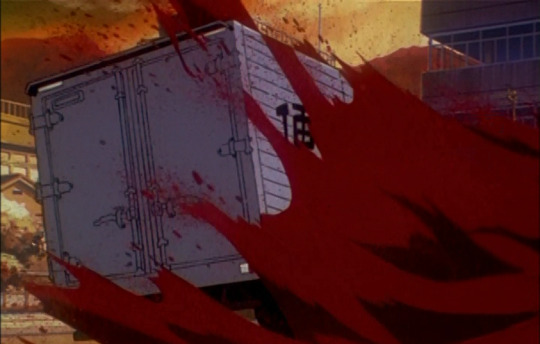
A nauseating crunch sounds and the unit goes limp. A controlled Unit-01 proceeds to raise hell on the incapacitated enemy, resulting in the unit’s blood and guts flowing through the streets. NERV’s personnel can’t do anything save for become fearful at the Dummy System’s capabilities. Terrible, visceral noises sound one by one as blows strike, as the unit’s severed limbs and blood splatters riddle the urban battlefield. Shinji hears every second, every squelch and splat.
Imagine the pain of 03’s pilot.
But the terrors don’t cease here.

01 doesn’t stop at just raising hell on the incapacitated 03, and we’re treated to another close-up shot of 01 tightly holding onto 03’s entry plug, before crushing it.
Somewhere away, Misato receives news that Unit-03 has been dispatched as an angel. Shinji feels the weight of having actually killed someone, before Misato actually breaks the news that the pilot is not only alive but that the greatly injured pilot is his classmate.
It never really hit me until now how this scene holds another horrifying subtlety. Compare this to episode 3, where Toji’s first interaction with Shinji involved him punching him, the very scene playing at this episode’s beginning. The 18th episode ends now with ,Toji and Shinji are both joined in the same camp, of children emotionally and physically marred by war, not able to fully control their situations.
XI. Unit-01 Berserk Sequence
Shinji stands in a situation where he can no longer take the terrors aligned with the Evangelion. He’s gone from sustaining injuries great and small from combat with the eldritch angels, to indirectly harming a friend through it. He resigns from his position as a pilot, understandably running away even with the approach of the 14th angel.
After a talk with Kaji about how he can control his future and he only, Shinji once again puts himself at the forefront of further pains. He must once more thrust himself to the terrors that align with the war-machines whilst struggling with other traumas.
During his fight against Zeruel, his Evangelion dies out and it all floods back to him. Shinji once again finds himself at a position of no power, frantically pressing at his controls to no avail.

He can only hear blow after blow of the 14th’s onslaught. He and Unit-01 are at their most vulnerable.
Until Unit-01 springs back.
W hat follows is the famous Berserk sequence, a scene whose terror can be thanks to Evangelion’s low budget.
We see the Evangelion in all her terror and the sort of off-ness that carries in this scene.

Episode 19 has no problems on treating us to front-row tickets to terror.
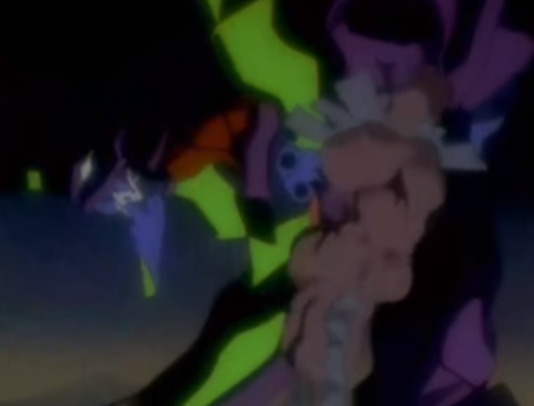
Unit-01 snatches part of Zeruel’s appendage and adds it to her mass. A sickening squelch sounds and her new appendage contorts into place in an instant.
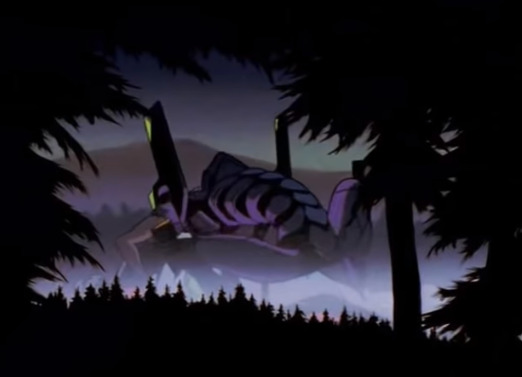

She moves over to her incapacitated, angelic meal and doesn’t hesitate to chow down. The shots feel too personal yet nowhere near in the sense of the show’s meta-textual reflections. It’s almost like stumbling on a cryptid and when she shoots a look at the viewer, it feels as if she’s looking at us, like we’ve interrupted her dinner. Or perhaps she did finish the meal... and she’s in the mood for seconds? Perhaps even thirds?
The bizarre and eldritch nature of the Evangelions goes full force with this imagery. Episodes 2 and 16 laid the foundation of how off the Evangelion Unit-01 was with how she openly mutilates her targets. Or even the unsettling roar of Unit-01 that’s not entirely bestial. The sound is straddles a line between the blood-curdling bestial and the human. But here? Eva Unit-01’s position, from her hunched figure, to her more feral position as she feasts, feels far too organic...and far too human.
The Evas themselves aren’t human, but the souls housed within are. Eva’s souls are souls of the respective pilots’ mothers, an example of the mother and child symbolism omnipresent in Neon Genesis Evangelion.
Shinji’s mother is Yui and as we go through the series, we realize the s2 engine appliance was intentional. An s2 engine offers infinite stores of energy and this is needed for Instrumentality. With the s2 engine within her grasp and the fact that Evas don’t subsist on anything, this would make the consumption of 14th completely recreational.
It’s super tempting to frame this scene as containing some abomination that now stands unchained and indiscriminate in its targets, but it isn’t. It’s sort of understandable because Units 00 and 02 don’t come close to exhibiting this sort of behavior nor were they in this circumstance. Neither Unit-00 nor 02 have any desires in regard to Instrumentality. In the end, we should look to Yui and her own endgame, because Yui’s running the show here.
XII. Dummy Plugs + CNS
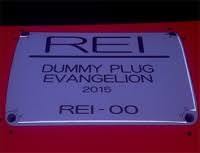
Ritsuko states the Dummy Plugs are machines which imitate pilot’s thinking. There’s a bit more than the possibility of this being 100% AI due to the apparatus Rei is in.
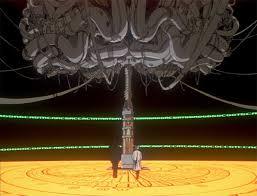
This very likely implies the respective person’s thought processes added with AI programmed in a way which best “describes” the pilot (basically how they are perceived). In episode 17, Rei is situated in this apparatus strongly resembling the central nervous system, the brain and the spinal cord.
{The central nervous system CNS is responsible for integrating sensory information and responding accordingly. It consists of two main components:
1. The spinal cord serves as a conduit for signals between the brain and the rest of the body. It also controls simple musculoskeletal reflexes without input from the brain.
2. The brain is responsible for integrating most sensory information and coordinating body function, both consciously and unconsciously. Complex functions such as thinking and feeling as well as regulation of homeostasis are attributable to different parts of the brain.
https://mcb.berkeley.edu/courses/mcb135e/central.html
Ritsuko imparts the unsettling revelation about Rei and by extension the Dummy Plant itself (after Misato coerced her into learning about Rei). The Reis are the core of the Dummy Plugs (and the System used to brutalize a hijacked Unit-03 and its trapped pilot). This scene adds more to the extent of Rei’s objectification, of her being replaced. It adds on to Rei III’s comment of being ‘the third.’
Rei isn’t savage by any means but the sheer brutality of Dummy System’d Unit-01 5 episodes prior may hint at her straightforward nature.
I’d like to pitch that Ritsuko’s approach to Rei’s Dummy Data was also the product of her subtle animosity toward Rei. When she refers to the Dummy Plug as a machine which mimics human thinking, she’s talking about Rei. She also refers to her similarly in episode 23 by referring to Rei as spare parts, as if Rei herself is some soulless machine whose parts can be switched out if need be. This could also call back to Rei’s poem, in which she calls herself a vessel which holds human thoughts.
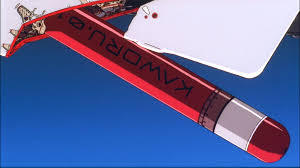
Another question remains: how does Kaworu play into this?
The MPEs (the Mass Production Evangelion series) use Kaworu’s Dummy data, meaning that there are cloned Kaworus stored off somewhere, perhaps floating with soulless smiles the same as Rei has.
Treated as spare parts.
This also implies that Kaworu is more or less reduced to an object.
What’s more disturbing is the nature of the MPEs gratuitous method of ravaging and mutilating Unit-02 and by extension Asuka.
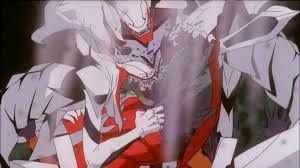
Kaworu hasn’t ever demonstrated any degree of malice, so this can’t really insinuate a ‘Kaworu is secretly evil’ narrative. But this can tie back to a recurring theme of humans fearing and despising angels. It’s because of this that the revelation of our genetically identical nature or the fact that they can comprehend our psychology is framed in-show as kind of shocking. It is because we’re so disturbed at the angels’ existence (or anything else we don’t comprehend) that we view them as inherently savage in nature. Kaworu’s quick-to-perceive personality most likely translated itself along with the AI. This would also rule in the somewhat strategic way in which the MPEs act against Asuka, exploiting her attack patterns through surprise attacks.
Some of Kaworu’s as well as Rei’s Dummy Data are the product of universal (Kaworu) and personal (Rei) contempt by people. Let that sink in.
XIII. Kaworu’s + Adam’s True Power
The bottom of the fridge horror portion of this iceberg is something that has subtly plagued me for years. We’ve only ever caught glimpses of Kaworu’s abilities in his debut episode. I picked up on it little by little with each re-watch of the episode, with every other time his abilities dawning on me. If I wasn’t focusing on how his character fits in the greater framework of Evangelion, I was cluing in on his abilities.

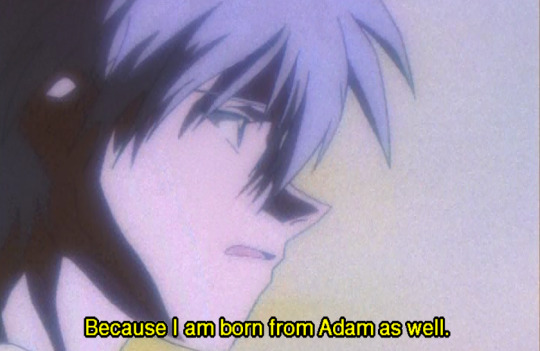
One of his abilities is being able to block out light, magnetism, and subatomic particles. Some of the forces which make up the universe. This witnessed by the viewer when he realizes the whole of humanity’s welfare hangs by a thread, due to the coexistence of angels and Adam.
Adam.
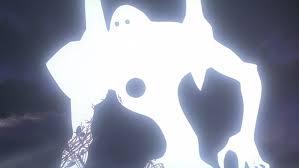
Adam’s soul lies within Kaworu. Adam. Who utilized an Anti-AT Field which caused Second Impact. An Anti-AT Field, which killed off much of the Katsuragi Crew in Antarctica.
This makes Kaworu the most powerful angel in the original Evangelion series.
Eva has shown that ownership of an angel’s soul (or partially, if you’re onboard the Rei I is in Unit-00 theory) allows the person to inherit the angel’s abilities through Rei. Rei blocks off Kaworu’s immensely powerful field with one of her own, canceling out both as a result. As we know, AT Fields for people are a figurative affair. People lack the physiology to exhibit a physical AT Field because they don’t have cores like angels do. Angels’ souls when possessed by humans have a sort of ability to circumvent parts of human physiology (if you’re looking for the whole package, you should eat angel’s flesh too). Rei also shows the ability to float, implied in episode 24 and shown explicitly in End of Evangelion.
But this raises a few questions about the last messenger is the ability to block out some of the forces of the universe Adam’s powers or Kaworu’s? Another ability that continues to plague me the more I think about it is Kaworu’s AT-Field usage on Heaven’s Door to bypass its lock.
We haven’t actually seen Adam’s other powers (if the angel has any) because the it’s anti-AT Field was halted via Lance of Longinus. Other than its ethereal appearance in flashbacks, we only see an incapacitated Adam in embryonic form. That’s it. We don’t know if Adam exhibits any other powers due to this impediment. If Adam does have more powers, this would add onto both the fridge horror factor of Adam and Kaworu.
Tier 4: Pre-Abyss

XIV. The “Nihilist” Lens
XV. The True Nature of Sync Rates
XVI. Unit 01+ MPE Gorging Scenes
XVII. Ancient Ruins of Arka
XIV. The “Nihilist” Lens
There’s something that implicates the whole cast. Something that goes beyond the meaning of the AT-Field, and the all-too-known Hedgehog’s Dilemma.
Eva is filled to the very brim with psychological concepts, but there’s one thing which ties this all together. It goes much larger than the desire to become validated or cycles of abuse and unresolved issues to a newer generation.
Free Will Vs. Determinism ties the entire cast together and is disturbing in its own right. It not only ties the cast together but also contributes to Eva’s meta-narrative.


Episode 16’s sequence with Leliel, Shinji, and the Johari Window gives little breadcrumbs to this psychological dilemma. Leliel teaches Shinji about his own identity as well as slowly ushering him to a sense of self-awareness. Leliel also attempts to usher Shinji out of filtering reality with only convenient parts. Shinji argues that he can’t really be held culpable for his actions, because the one and only reality is that reality is awful, bar none. Not his reality, but reality as a whole. This deterministic stance becomes ever more blatant 8 episodes later with the appearance of Nagisa Kaworu.
Kaworu’s designation is the angel of free will. The irony of this stands in the fact that Kaworu isn’t the only angel who can exhibit free will (with some of the angels before him taking the time to try comprehending people). Kaworu’s status comes from his identity as the last messenger, bringing about freedom for one species (humans/lilin or angels) at the expense of the other. Kaworu knows his reality well and in the end, seeks to better the reality of those around him. Eva doesn’t romanticize the prospect of free will, however, because Kaworu is so aware of his own person and how he can hurt those around him that it greatly bothers him.
The metatext doesn’t just position Shinji as being in the wrong, but also the audience. Remember the point I made before about Shinji being the audience substitute? It’s further hammered home from the series’ tail end and into End of Evangelion.
“That’s just the way things are.” is a common response to things in life we feel resigned on changing, because we don’t know how to change them. This quote is a parallel to Shinji’s “humans aren’t made to float!” in episode 16.
Shinji does know how to change much of his reality, but by doing so he’d be pushed into free will. Free Will is the solution and it means holding yourself accountable rather than believe that it’s everyone else with the problem. With the idea that you can change your reality, it offers you the opportunity to love yourself.
If you love yourself, then it becomes much easier to love others.
Eva’s free will and determinism metatext hammers home the extension of empathy.
Shinji/the viewer’s greatest problem is that because we don’t love ourselves it makes it difficult to extend the love to everyone else. Shinji’s love translates as idealism. Because of his unhealthy idealism, he is hindered from understanding people.
By ascribing your beliefs from determinism to free will, it opens your mind to an entire world of possibilities, but therein lies the terror. It is because of these possibilities that Shinji and by extension, the viewer, likely fears free will. Shinji finds ways make himself validated, but with free will, the argument could be made that it doesn’t matter. There’s the anxiety-crippling likelihood that none of it actually matters, because your existence doesn’t matter. If we’re going on this bent, acts of making an adequate impression on others are acts of personal denial. In the end, these are what they are, possibilities.
The greatest terror of it all is that we don’t know.
User power-chords makes an excellent point about the inherent darkness of an internal locus of control.
User power-chords posits the idea of existential absurdity for Shinji not as a certainty but a possibility. There’s always a likelihood that our desires to comprehend the world around us, to find ultimate understanding are in vain.
Cheesy as it sounds, people fear ambiguity because we seek a satisfying end. We don’t just seek answers. We want outside closure and inner peace, but we won’t always get it. It’s why we rationalize relationships that end on bad notes. Sometimes you worry about your falling-outs...and it hurts. You never got the answers your wanted so this pain carries, for months, sometimes even for years. Dwelling on the issue serves no purpose other than to keep that hurt with you. The best thing to do sometimes is to find your own closure, your own meaning.
No, Evangelion isn’t actually pro-nihilism, but it presents us with that likelihood. That’s what makes this aspect of the narrative so terrifying: The consideration that we find meaning in the meaningless.
XV. The True Nature of Sync Rates
The nature of injuries and having them in adds onto the innate horror --be it war or otherwise-- and themes of the Evangelion. The severity of the injury is based on how high the pilot’s sync ratio is. An average rate while sustaining damage will bring hurt to the actual pilot in the respective spot. Some examples:
Sachiel makes multiple headblows to Unit-01 and Shinji in episode 2, causing head trauma.
Ramiel’s, (5th angel), particle beam attack in episode 6, an attack so severe that Shinji needed medical care.
Unit-00 and Rei being infected by a Bardiel hijacked Unit-03 in episode 18. Toji’s condition in episode 18 stands as a large example of the innately disturbing nature of sustained injuries.
Toji’s condition becomes all the more nauseating when you see Evangelion parts and blood flow through Tokyo-3.
Toji could feel every last second of strangulation, body blow, and feel the unspeakable pain of his arm being severed. Let that sink in.
Asuka receives the worst of these considering the nature of her sync rate being high. The higher the rate the more kept the damage is. The circumstances behind Asuka getting the worst of it goes back to the AT-Field. Asuka understood the meaning of the AT-Field, that the more you open yourself up to others, the more hurt you become. The realization dawns on Asuka as her mother from within the Evangelion shields her from the onslaught of JSSDF troops.
It’s then that Asuka finally comprehends what the Absolute Terror Field is. Despite her emotional needs being neglected, realizing she’s set up to fail, and going comatose she still goes on.
Asuka, despite everything, takes a chance and opens her heart knowing the double-edged nature of the AT Field. What happens next?
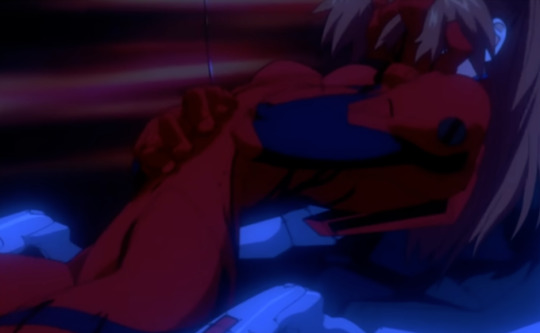
Asuka took a chance.
She opened her heart...
...and she got hurt all because she opened herself.
XVI. Unit 01+MPE Gorging Sequences
The brutality of both Unit-01 and the Mass Production Evas holds three layers: of visual horror, implied horror, and thematic horror. Unit-01, after taking Zeruel’s s2 engine into herself, proceeds to then brutalize the 14th angel by way of still gorging on it. The feeding was entirely recreational considering Evangelions don’t subsist on food to function. This was more about the sheer act of brutality for brutality’ sake.
The Mass Production Evas also fall under this category, the way in which they deal with Asuka after incapacitating her with a replicated Lance of Longinus is also sadistic and gratuitous. They also proceed to gorge on Asuka, her fate made worse through the simple fact that her sync rate is heightened.

The MPEs don’t even swiftly finish her off. She is in a state of tremendous and unimaginable pain. They fly above her slowly, circling above her mangled Eva.
They are almost mocking her as she can do nothing, save for writhe. Asuka’s seething, repeated “I’ll kill you...I’ll kill you….” is then silenced by the MPEs spearing her down.
The brutality doesn’t end there, as we see much darker implications of the damage sustained toward the end of the first half of End of Evangelion.
Shinji bears witness to the implications after seeing the decimated remains of Unit-02 being carried off by some of the Mass Production Units. The sickening reality of it all dawns on him and he is once more exposed to the woes of war and the nightmarish aspect tied of the Evangelions.
XVII. Ancient Ruins of Arqa
We’re ending the pre-abyssal end of the iceberg with Evangelion’s original proposal.
Eva’s proposal, a far cry to the show today, had a more sci-fi angle to it. Psychological concepts weren’t exactly pitched nor was it self-aware. The angels weren’t even referred to as the angels, but as the Apostolos. Instead of the 18 we were presented with in the original show and the movies, there were 28 Apostolos.
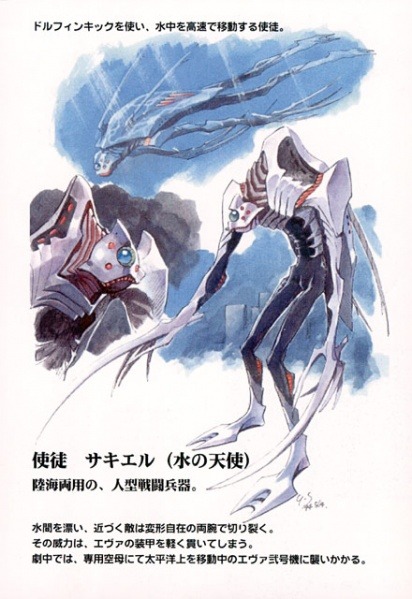
The Apostolos designs stand as testament to how far of a departure the proposal was to the final cut. They look far more menacing than the more amorphous, much softer defined, beady-eyed angels we’re used to. To top it all off, the Apostolos were the de facto villains of Evangelion’s prototype pitch. The Apostolos in the Proposal, toward the end, proceed their onslaught as a group rather than the series’ one by one. Toward the series’ end, the 12 strongest Apostolos begin their assault on North America, annihilating the continent in its entirety.
Only 12 of the creatures laid waste to a singular continent.
Episode 24: "Now, the Promised Time"
Rei breaks down. Her secrets are revealed. At last awakened, the twelve strongest Apostolos descend from the Moon. Both Eva Unit-06 and the American continent vanish completely. Humans acknowledge their helplessness in the face of the Apostolos' crushing power. The promised time, when people will return to nothing, approaches. A human drama in the depths of despair.
Episode 25: "Arqa, the Promised Land"
The laboratory holds the ancient ruins of Arqa, which have become key. In order to stop the twelve Apostolos, the United Nations' head members annul the Human Instrumentality Project and resolve to destroy the Apostolos. Shinji's father objects. Shinji and the others stay at the laboratory for Rei. A drama of people conflicting over incongruous objectives.
https://wiki.evageeks.org/Resources:Neon_Genesis_Evangelion_Proposal_(Translation)
The aforesaid creatures were so powerful in the original pitch that Human Instrumentality and the ancient ruins of Arqa would be the way of stopping the onslaught.
Tier 5: The Abyss

XVIII. Split Second Misato Death
XIX. Humans Are The Villains in Eva
XX. The Ultimate Paradox
XVIII. Split Second Misato Death
As the last and most explicit aspect of original Evangelion, it would only make sense that EoE specific content would take its place in Tier 5. End of Evangelion is a 90 + minute tour de force with disturbing imagery back-to-back. Split Second Misato Death refers to one of the most unsettling images sprinkled all throughout the movie. Here are a few of the many examples of EoE’s building up on Evangelion’s ugliest parts.
Everyone cites the infamous hospital scene not even 5 minutes into the film as the first proof, but user power-chords has pointed out, Shinji has actually attempted suicide (refer to the ‘Free Will v. Determinism’ part of the iceberg.)
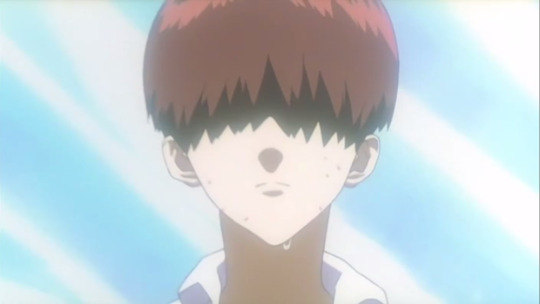
After Misato is mortally wounded and sends Shinji off in an elevator not long after, the JSSDF blow up that part of NERV. A few people have pointed out the most disturbing facet of this scene: through freeze-framing that you can actually see Misato’s body during.
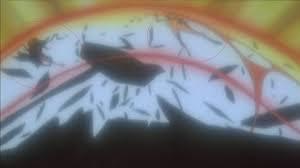
The JSSDF scene partway through End of Evangelion in which NERV personnel are summarily annihilated.
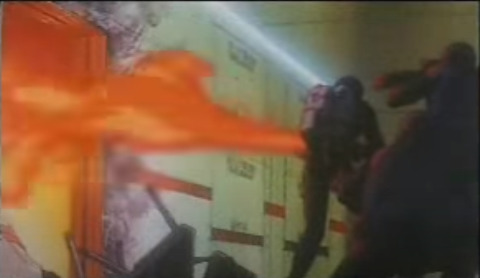
For those missing the small detail of Shinji’s attempted suicide ,Shinji’s depressed state is made more clear when the JSSDF locate him. When they do they attempt to kill him execution style. Shinji doesn’t move.
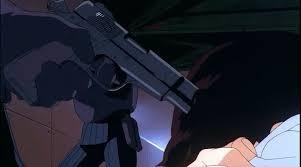
“I don’t want to die…!” during the JSSDF’s assault, Asuka is awoken from comatose state. She is protected by her mother via an AT-Field by Unit-02. She gains back her self-preservation after this realization, and multitude of images play. One of them is an extremely gruesome close-up of Asuka’s face. (extreme body horror warning, proceed with caution)
The Komm Susser Tod scene beginning with Shinji strangling Asuka in harsh coloring, Naoko’s same action toward Rei plays right after. A few disturbing child drawings follow after, predominantly featuring death. (seizure warning, body horror warning)
End of Evangelion’s flooring nature comes from the fact that it builds up on the subtly horrific and makes these terrors explicit. Whatever existed beyond closed doors becomes now available for us to see,
XVIII. Humans Are The Villains in Eva
At the penultimate point of the abyss lies a horror as old as much of time. Of the humane being more disgusting than the monsters.
That we can be monstrous.
This fact becomes known with the appearance of the JSSDF as dispatched by SEELE, methodically mowing down NERV personnel with little to no weaponry of their own. We’re treated to NERV’s personnel in their hallways, some forced with the moral dilemma of leaving their own to die while surviving or helping their own while both end up being gunned down.
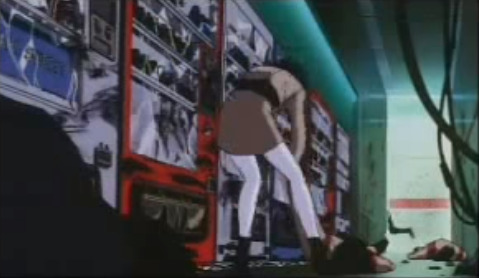
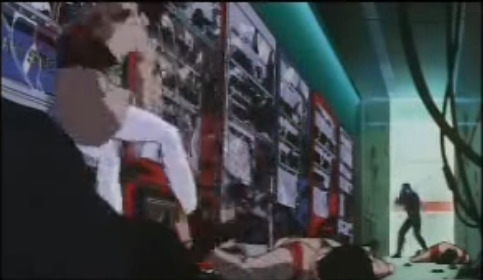
It becomes apparent that SEELE has been gradually, intentionally chipping away at NERV’s Defense Budget, getting rid of the (little) competition they have after the defeat of the Last Messenger.
There’s a degree of contempt and casual sadism that comes with how they kill the personnel. In one instance, a NERV worker surrenders to the JSSDF, before being killed off in execution style in the distance (one headshot plus two extra shots for good measure).
When you look back at it, this sort of sheer, unabashed brutality wasn’t felt about the angels. Human attitude about the angels is largely fearing, anxious. This attitude accentuated itself through a sometimes nervous soundscape. Of observing these weird, ghastly creatures as they creep and swim. And the feeling’s mutual. The problem is that we don’t know.
But here? We do know.
When the JSSDF move in, the anxiety of angels graduates to the full-force dread of creatures that have killed before. The greatest enemy to humanity has always been with them all along, forcing them to a catch-22. The dread falls on Maya because she understands this perfectly. NERV has only ever shot at targets rather than living flesh…
...and SEELE knows this.
SEELE’s slow, but sure suppression of NERV’s budget is kicking a man while he’s down, but the man in question is a child instead. The JSSDF have more than enough firepower, calling it overkill goes beyond an understatement.
The JSSDF demonstrate the lack of remorse further with the discovery of Third Child, Shinji Ikari. One of the members presses the barrel to Shinji’s head before Misato steps in and kills the members.
The JSSDF isn’t the only damning evidence of how ugly members of humanity can be, however.
Humanity’s on-occasion grossness shows itself in small ways throughout the series, in dislike and conscious emotional distance for individuals, or beliefs of the angels being unintelligent and/or savage. Other times it manifests fiscally, in orchestrating more ethical approaches to stopping certain destruction to go seemingly haywire in order for NERV to receive more funding. This all due to a rival company of NERV challenging the very idea for its usage of child soldiers.

The worst of this damning fact is that many of the morally repugnant members exist on a higher echelon of society. There are Gendos running around, doing as they so please and they’re the tip of their echelon iceberg.
XIX. The Ultimate Paradox of Evangelion

“Anywhere can be paradise as long as you have the will to live.”
We’re treated to these words as Shinji finds himself on shores surrounded by an isolate hellscape, with Asuka next to him. The strange and altogether horrific nature of End of Evangelion has gotten fans believing on End of Evangelion’s endgame was in certain, nihilistic. But Eva dipping its hand in the likelihood of meaning in the existentially meaningless isn’t even the ultimate terror of Eva’s self-aware universe, nor is it the tendency for man to become contemptible towards itself.
Evangelion greatest terror is the paradoxical nature of free will.
Yui’s words to her son as she drifts off into the ever-expanding cosmos, her status as a deity realized, is that paradise is universal. EoE assumes this unconventionally positive approach to a whole series worth of characters’ woes. The issue is: finding paradise is ultimately conditional.
Free Will’s paradoxical nature is what gives credence to the ongoing Free Will vs. Determinism dilemma. People can use their free will to take away yours entirely and this is most evident with Rei. Her existence is the result of a man’s unhealthy attachment to his wife, her lack of self-preservation the result of being conditioned as a multi-purpose vessel; her desire to merge with Lilith to become an omnipresent mother-figure was not hers. The nature of disallowing free will exists on a spectrum, as people can use their free will not to take away the whole of others’ freedoms, but to disallow them proper emotional growth. The adults around Asuka weren’t around for her during the series, leading to her eventual downfall.
Unit-01, throughout much of the second part of EoE holds the power to give or deny people’s physicality due to her status of having both Fruits of Life (the s2 engine held by angels) and Wisdom (from the Lance of Longinus merged with the Eva earlier on). This gives Unit-01 her deity status and while within Lilith-Rei, Shinji realizes that not everyone would be there in his life, that he can’t be in the center of others’ lives. It’s for that reason why he denies people’s physicality (“They can all just die.”), which turns people into LCL.
Shinji gives allows people the ability to come back from Instrumentality after realization arises that without other people, there’s no way to tell if Shinji, himself exists or not. Kaworu and Rei also give him the reality that with people back, pain will become an inevitability once more. With all the souls gathered by Lilith-Rei, they are released after her death.
With the souls of those cast into Instrumentality dispersed, those turned into LCL now hold the ability to come back from Instrumentality if they so choose.
While the idea of anywhere being paradise rings true, it’s not entirely satisfying to say that EoE is unconventional in its uplifting message to the viewer. Evangelion is at its core a cautionary tale. It warns the viewer into extensions of empathy and openness that others would properly live. This goes double for those with power. Without that compassion, we’ll have Asukas, Misatos, Ristukos, as well as Reis, those in the world whose downfalls come from emotional absences, neglect, objectification, and forced baggage. We would have Shinjis, those wanting to be at the nexus of others’ importance because they were deprived while young.
Kindness is a powerful thing and the lack of compassion present in all of Eva implicates most everyone. It leads to yet more abusive cycles, with the only thing breaking that cycle being a hand for those in need.
XX. Conclusion
What more can be said over this juggernaut which is a host to a bevvy of darkness? Evangelion is testament that anxieties and horror don’t need to start out as blatantly shocking or visceral to make an impact years down the line. They also don’t need to be out in the open to initially hook you either. You pick up on a few anxieties as well as horrors and you realize deep down, there must be more, which drives many of us to engage in this often times unabashedly dark source material.
Some of us are doing it later in the throes of adolescences, others are doing so well into their 20s, possibly dipping into their 30s. Point is, it draws in a lot of us and for a lot of us, it doesn’t ever let go.
Some of its charm could be chalked to the visceral ways in which characters interact. Even after years of re-watches, I’m still learning new things about the child soldiers, and I’m quite sure there’s others finding small details. There’s also the possibility of Eva’s approach to terror. I think Evangelion “humanized” its horror. It didn’t make horror a universally human feeling, but made it so that the true big bads looking to cause apocalypse weren’t actually the eldritch. Many of the angels are more or less lost kids looking for their mother (I still think Ramiel’s “singing” in episode 5 was it calling for its mother!).
With those newer details after 20+ years, there will be more added to the iceberg. Hell, there should be more added to the iceberg. This iceberg is the tip of an even greater iceberg. I’m still learning about their adults and their desires as well, how cyclical their actions are. For others, the draw-in factor lies in its low budget. Personally, it’s all of these for me: the low budget helped cement these darker aspects of the series due to horror and the genre’s overall relationship with limitation. It works best on limitation and had Eva worked with a much higher budget, I don’t think the content would be as effective, or perhaps it’d be much more difficult to make it so.
Evangelion is such a well-done, deceptively compact series that each lens a fan assumes has its own interesting rabbit hole. Your circumstance shapes the experience, and this too involves how you navigate the series’ menagerie of terrors.
I’d also like to thank the reader for getting through the largest rabbit hole in Evangelion. I’d also like to thank you for getting through the whole of this meta from a fan who slowly began to resonate with the characters as the years went on!
#neon genesis evangelion#shinji#kaworu#asuka#rei#seizure warning#body horror warning#suicide mention#correct me if im wrong#credit goes to twitter user decoratedboar for the iceberg picture help#and fixes
3K notes
·
View notes
Text
☕ Morning Coffee ☕ Malcolm Reynolds
So everyone seemed to enjoy my Morning Coffee imagine with Hannibal Lecter so I thought I’d do one with Malcolm Reynolds. In synopsis Morning Coffee is a simple concept, it follows your morning to the start of your cup to the end of it. Hope you enjoy!
---

written in the mind-frame of a Female!Reader but there are no pronouns mentioned nor gender specific anatomical body parts.
Warnings: None, fluff, my attempt at humour.
Word Count: 1,812
---
Malcolm Reynolds
Dinosaurs in space. You suppose you've dreamed of weirder but when a T-Rex in a spacesuit came at you you'd decided it was time to wake up and stay up. So here you were now, feet kicked up on the dashboard beside the plastic mini monstrosity that had decided to terrorize you. You hadn't questioned the little knick-knacks when you'd agreed to pilot this Firefly, there were a number of things you hadn't questioned like the fact there was some interesting to say in the least patchwork on this chair, patchwork that might've hinted to what kind of nightmare had actually happened here. But there was a sadness around the cockpit and no matter your curiosity you knew it was best to not ask. Plus Zoe scared you a little bit too much to ask, she already didn't seem to like you as a pilot as nothing you did seemed to impress her and Gorram had you tried to impress her to get on some good footing but so far it seemed like you were on your knees. “Do you even have teeth?” You wondered out loud.
You leaned forward and for the first time actually touched the hard plastic figurine to inspect it, it was worn down and the paint flecked off of it and as for the teeth your nightmares told you to be afraid of? Fused together. This T-rex couldn't have eaten you if it wanted too, couldn't even take off a toe. You stretched your arm out and the picture of a dinosaur in space was kind of funny especially as your tired eyes focused on the T-rex and the space behind it became blurry. “Ya, having fun?”
If this chair wasn't attached to the ground you're sure you would've taken it with you to the ground but with the limited amount of motion you just managed to flail like an idiot in front of the Captain. “It fell. I wasn't touching it.” You let out.
You felt caught, like a child with their hand in their parents wallet. A small chuckle let you know however that you weren't. “It's fine, space is yours now anyhow.” He shrugged.
The words didn't have any malice but they didn't feel honest and even if they were you'd never throw out these toys. You got ahold of yourself and put the T-Rex back near its Stegosaurus friend before looking over at Mal and to your surprise he had two cups in his hands. “Double fisting some caffeine?” You teased.
“Funny.” He remarked as he came over and offered a cup out to you. "Saw you was up, figured you'd want a cup.”
“Oh.” That was awful nice, wow. “Thank you.” You said taking it.
You expected him to leave since that's what everyone does, you'd pretty much had the cockpit to yourself since you'd signed onto the crew but instead he went over to the other seat and sat down with a sigh. He leaned back into the seat and the way he stared around at his ship was with contentment, free hand giving the arm of the chair a pat. There had always been something sort of heartwarming about the way Mal treated the ship, it was almost like he was giving her moral support and you'd be damned if there hadn't been times where it'd felt like that really was the only thing holding her together. “What? I got something in my hair?”
You were brought out of your thought. “Huh?”
“You were starin’.” He let you know.
“Was not.” You insisted, heart pumping at the idea of being caught gawking.
“Your eyes just stuck?” He teased.
“I was...” You paused and you swore steam was about to come out of your ears you were thinking so hard to come up with something plausible. Shit, shit, shit--maybe? No--Got it! “I was just making sure I wasn't dreaming, don't usually have anyone up here with me.”
Got it? Really? You got nothing. You couldn't even smile at your own garbage excuse as all you got with a small shrug and nod from Mal before he looked away from you. Was it possible to dig yourself a hole while in space? It seemed like against all odds it was. You took a deep breath and focused yourself on the coffee in your hand, you couldn't say anything dumb if your mouth was full so you took a sip. The warmth helped to eat away your nerves and the taste distracted your mind. “I get it right? I've seen you have coffee once and I tried to replicate the way you desecrate it with sugar.” He joked.
“One, ouch. Two, sugar brings out the notes in coffee. And three, yes you got it spot on, shiny.” You admitted almost defeatedly at the end.
“That might pass as a reason for that much sugar if this was actual coffee, the only notes in instant is dirt.” He jokingly scoffed.
“I'm a pilot, I don't like dirt. Gotta drown out that taste somehow.” You joined in teasing yourself.
It earned you a smile that you couldn't help but to return. Mal's smile was weathered but Gorram if it wasn't contagious. This time however you made sure not to stare too long and got yourself to look out the front instead at the stars that the ship swam through. “Anything worrying gotcha up?” He asked.
It was nice to him to check, as far as Captains you've piloted for so far Mal had been the most caring, still rough around the edges but it wasn't all he was made of unlike some of the Fèihuà Captains you'd crewed with. “Dinosaurs.” You admitted sheepishly.
“Dinosaurs?” He checked.
“Dinosaurs in space.” You clarified as if that made it make more sense.
“Suppose I've heard weirder before.” He shrugged with a chuckle. “’Least with you it ain't some kind of poetry I gotta unwind.” He remarked.
You knew he was talking about River, sometimes what she said was easy to understand and other times it felt like you were trying to solve the Da Vinci Code. “You don't know that, I could be talking metaphorically about the ancient dangers of space.” You tease.
He chuckled as he looked over at you, eyes crinkling at the corners with joy that some might consider unnatural this early in the morning. “Oh yeah? Enlighten me to these ancient dangers then.” He challenged quirking up an eyebrow.
Your brain practically whirred trying to think. “You know I just don't know if it's possible to bring you to my level of enlightenment over the complex subject that dinosaurs in space.” You settled on, nodding every time your mind came up with the next part of the sentence to make it comprehensible.
You accented your brilliant statement with a loud sip of coffee. “One can only dream of such enlightenment.” He settled on.
“It was actually a dream that led me to this enlightenment.” You let him know.
He looked at the plastic toys. “They are a might frightening, certainly turn the legs to jelly.” He teased.
You let out a small laugh and even though it was teasing you enjoyed it, it was lighthearted. “What about you, anything got you up? Metaphoric ancient dangers or otherwise?” He pauses at the question before letting out a small exasperated sigh and shrug, his free hand opening and closing to accompany the shrug. “Come on I told you about my fear of space dinosaurs I think you can tell me about whatever is running through that pretty head of yours.” You insisted trying to keep the lighthearted tone going.
He scoffed with a smile. “Pretty head of mine? Ugh, you're our pilot so tell me you don't need glasses.” He scoffed.
“Don't ‘ugh’ me.” You chided, copying his dissatisfied noise. “My eyesight is perfectly fine.” You insisted.
He rolled his eyes and shook his head a little but you could've sworn you saw the tips of his ears and cheeks tinge with a little bit of red. You had to take another sip of your coffee to hide your grin over that. “Beg to differ.” He settled on.
“Then beg.” You quickly quipped.
You almost spat out your coffee in glee of his reaction. You managed to choke down the liquid in your mouth before falling into a fit of giggles at the look of astonishment on his face. Even he had a good laugh at it once the shock had subsided. “That's good, I'll have to remember that.” He chuckled before calming himself down to take a sip of his coffee.
You nodded along in agreement before taking a sip of your own coffee only to be greeted by a whole lot less liquid than you expected. You stared down into your cup to find it now barren expect for the small flower Kaylee had probably painted on the bottom staring up at you. It was just a pretty little daisy that had no business being as cute as it was, speaking of pretty things having no business being a cute as they were you brought your attention back over Mal. He still looked amused as a small smile kept the corners of his mouth turned up. “Glad to hear you've come to your senses and agree with me.” You let him know.
“I didn't say that.” He insisted.
“I certainly don't hear any of that begging.” You remarked.
He looked over at you a little unimpressed but his smile was still there so you just smiled bigger, practically daring him to do it and he knew it. He silently conceded with a small head shake before taking the last sip of his own coffee and he too seemed to stare down at the little flower in the bottom of the cup for a moment. He took a deep breath as he got up. “You finished?” He asked before heading towards the door.
“Yes, unless you're offering a second cup?” You cheekily asked.
“Oh, now I see, you were just buttering me up.” He accused with a smirk.
“Only if it worked.” You agreed offering your cup out.
He let out a small amused breath before taking the cup out of your hand which only made you smile more. “Be a waste of perfectly good sugar if you didn't have another cup since there's so much left in here.” He reasoned before heading out.
“Whatever you convince your pretty head of.” You nearly sang.
You heard him chuckle as he made his way down the steps and you smiled to yourself as you looked out vastness of space, a vastness you'd gotten used to over the years. You gave a pat to the dashboard of Serenity as a thank you to her for letting you on to enjoy the vastness of space with this crew.
---
~Admin Coral 🍒
Buy Me A Coffee?
---
Note: Fèihuà 废话 roughly translates into bullshit in Chinese.
#Firefly#Serenity#Malcolm reynolds#Firefly imagine#serenity imagine#malcolm reynolds x reader#female reader#female!reader#F!reader#I know it seems like I'm adding an odd amount of female reader in here but it's just so anyone who doesn't want to reader it from a female#perspective can use work block and not have this come up in their feed#fluff#firefly fluff#space dinosaurs my dude
47 notes
·
View notes
Text
4/13/2021
Whispering from the quiet parts of my mind I hear the truth, or what can only be the reasonable explanation for this tragedy. This isn’t a normal one at that either, it’s far more complex. I’d compare it to a lover but as I, where the windows of the soul were opened and tried, a war was had and I gave it everything; every part of me until I lost the person I was entirely. Like I became this different person, transforming into another human because all I could do was love but it wasn’t for me, it was to be against me. To never be okay, because breathing was only for the concept of breathing, to stay alive but holding onto my breath to survive because the pain is that sickening. So, I leave it to the monsters that I’ve kept hid inside to devour it over time, it hurts and feels like I’m being taken over by the haunting and a ghost appears for flashes at a time, like on a lens where a video is taken and you see just a ray of white, a passing of smoke or darkness and it flashes, only to leave quickly because the burden of understanding something like the paranormal within myself would darken the light I’ve held onto; it would mean there’s something else that resides, that lives and has created a home in my mind as if it were theirs to claim… but then I realize I’ve given these monsters the life as they fed. I couldn’t admit it, rather I didn’t want to admit the reality of what I know… the belief that an inner being, another human could be inside of me, and be so manipulative, so wrong and daunting causing physical pains and sensations that had me begging, pleading, screaming…. To the point of threatening, threatening myself with self harm until the day I actually tried it. It relieved the craving to feel something that only I caused physically to myself, rather than what caused me physicality’s I’d rather not get into. I no longer feel desire to do this, maybe because now I know that pain is pain no matter how it plays out and its just not worth blood that stains.
What I find as the saddest part, is that I’m still trying to cover up who this really is about, comparing it to a lover and a ghost that is both me at the same time, but isn’t… instead is exactly the way I’ve worded it in the literal sense, not just as a metaphorical lover, but a real one that now haunts my dreams as the ghost that resides alongside me. And again, I think about typing his name, but that would be more damaging than just trying to forget; proceeding to pretend that it’s me who’s deserving of regret.
Instead of just realizing the harshness of how parts of him became me and still cause disruption plainly, so I tell myself as if it were and has only been me this entire time. Even still. Because life continues to try me and try me again as if I’m standing on trial and he’s set as the only participator in a jury. Dictating whether what it is I do is wrong or right, or telling me to change, or blatantly telling me I’m not a woman, and I’ll never amount. So, I make the issue seem simplistic, shaming who I am instead of who I loved. But it was him and it has been all along. He maintains this monstrosity to the deepest parts of me, and I still mask it claiming it as a comparison to someone I once loved as if it weren’t the truth… but misfortune knows it is.
I call him, him… the him I neglect since letters of his name can’t seem to find this page. I’ve dealt with this process through ways of retreat as I pull back tears and live presently. Reminding myself constantly what it is I am doing right this second, not a minute before or what I will do later; at least I try to. It reminds me where I am, that I’m safe and that I’m here. It’s the only way I know how to accept what is in a slow manner, where thoughts are lingering, but not quite shoved to the surface because I have to do this quietly. I have to understand what is actually the disguise by acknowledging it, but brushing it away as imagination because it’s easier that way, and the rather is too much. So maybe, emotionally numbing is called a crutch, but maybe it’s saved my life from where I could have gone. I won’t lie, I know more than I admit, I play dumb to myself, and I literally mean myself now. It’s not that I do this to be someone I’m not, it means I know my limits. I used to claim the limitless concept as my own, that no one could bring me down or hurt me, but I’ve been hurt and I’m still hurting. It doesn’t mean I’m incapable or trying to be someone I’m not, it just means that sometimes being me is too much. I feel more than others, insanity’s role takes its toll on me every day in a new way; and I find myself exhausted at 6 pm because I’m tired of pulling out the light within me that keeps me breathing, because without it there is no air I want to breath. Numbing might be a crutch, but it saves me slowly, quickly, and sometimes at a moment’s notice from losing my light entirely. I think it’s called faith, this feeling of having the courage to carry on when everything explains to me its best to run. I want to, but I fight. Because if I don’t fight, I lose it all… I lose my light.
#prose#poetryportal#poeticstories#writtenconsiderations#writeundertheinfluence#twcpoem#poetrycorner#prosecorner#prosepoetry#creedatelier#inkstay#spilled ink#spilledink#writerscreed#poetrycreed
33 notes
·
View notes
Text
how to never stop being sad
Summary: Following his brother's acceptance, Roman's life felt like it was falling apart. His family was turning against him, that awful snake was being allowed in their home, and worst of all, he still couldn't seem to do anything right, no matter how hard he tried.
How does he choose to deal with it?
Not in a good way, that's for sure.
Warnings: Gore/Death/Violence (none actually occur but it is described), food mention, cursing
AO3 link
Chapter 1
Repeat to yourself that they’re not really gone
Time has proven
That fooling yourself into believing a lie
Is the most effective way
To deal with things you have no control over
Roman was fine. Completely 100% percent, absolutely fine, and he would tolerate no thinking to the contrary. Things were abnormal, sure, but he was coping. Maybe he felt a bit (a lot) guilty for letting things in the Mindscape get so bad, but it’s okay! He’s managing! Maybe he’s surrounded by people that barely tolerate him now, but he’ll fix it!
...eventually.
Right now, though, he’s in his room. Alone, as is usual these days. Usually, he’d ask Patton or Virgil to hang out with him, but after the last video, things were… Tense, to say the least.
Patton wasn’t mad at him, of course; he wasn’t ever truly mad at any of them. However, Roman would have to be stupid not to notice the disappointed looks Patton gave him when he thought he wasn’t looking or the way that after Roman left the room, he always made a point to talk to Janus afterwards, as if he needed special attention just for enduring Roman’s presence.
Things were a little better with Virgil, but he was frustrated with Roman for tolerating Janus’ presence at all. Despite his obvious vitriol towards him, he still outright refused to talk about what exactly Janus had ever done to him. So Roman was forced to choose between Patton, his father figure who’d never meant to do him wrong (who had acted like Roman was unreasonable for sticking to the very moral rule set that Patton had imposed on him since they were children), or Virgil, who Roman had been wrong in not listening to before, & who was obviously extremely hurt and betrayed by both Janus, and now his own family.
He still hadn’t quite been able to choose, straddling the line between adhering to Patton’s kindness policy towards Janus and respecting Virgil’s feelings. It didn’t really work-- rather, it just seemed to leave them both dissatisfied. Roman could hardly stand it.
...but it’s fine. Really. It’ll blow over eventually. He isn’t quite sure how, exactly, but things always turn out alright in the end, right? There’s always a happy ending.
Except when there isn’t, but… bad endings only happen in Remus’ stories, & he doesn’t have power here in the Mindscape.
...except he sorta does, now. After his video, he’d (albeit reluctantly) been accepted. His ideas were considered, even valued, now. Sometimes, he was even chosen over Roman. Not only by Thomas, but also by the other sides, at times; Logan may think he’s slick, but Roman’s seen him specifically request his brother’s assistance in the Imagination, in the living room, in the archives, in his room- It made Roman sick to think about, and whenever he walked through the house, he could see evidence of his brother’s influence littered throughout. For the life of him, he couldn’t understand the appeal. When had society fallen so far as to value a duke more than a prince?
---
Roman hadn’t thought he’d been in his room for long; he’d only meant to duck in to get a breather after having to endure Remus’ maniacal ramblings for nearly half an hour, but it seemed he’d been brooding long enough to attract Logan’s concern. He heard a knock at his door and broke out of his haze, looking towards it.
“I apologize for bothering you Roman, but I was wanting to inquire whether you were alright. It’s been an hour,” Logan said. Had Roman really been away for that long? No wonder Logan was checking on him.
“Yeah, Specs- Sorry. I’ll be out in a minute, just finishing a project,” he lied. Logan was so cold, calm, rational- Surely he would look down on Roman’s groveling simply because he couldn't deal with his brother for more than a few minutes. As much as Roman was full of himself and proud of his work, he thought if Logan talked down to him, he’d break down and cry.
“We’re currently 'hanging out' in the common room. You’re welcome to join whenever you finish. I look forward to hearing about what you’ve been working on.” Roman could hear his footsteps slowly grow farther from the door.
Shit. Now Logan thought he’d been working on something, so now he had to do something-- he couldn't just show up empty-handed. They’d see through his lies in an instant. He’d be just as bad as Janus, imagine what Virgil would think--
He took a steadying breath. Okay, yeah, he’d lied, but that wasn’t so awful, he just had to make it right. He just had to make something, and that shouldn’t be so hard, right? That’s his job! He’ll just think of something real quick, and it’ll be done in a jiffy, and then it won’t be a lie anymore, and on top of that, he’ll have something to talk about! Talking parts were hard to come by sometimes when you had to find something that would include the two people you hate most, your former-enemy-turned-best-friend, your dad and your colleague (as he insisted to be called), but everyone was always eager to hear his new ideas, so this would be perfect.
---
It was nothing special, but it would do. He hadn’t had the time or energy to think of a concept for a whole scripted video, so instead, he’d written the next Shoutout Sunday. Simple, but it had to be done, and it was already Friday, anyways. He closed his notebook, and stood up, keeping it under his arm. He never knew when inspiration would strike, so he tried to carry it with him whenever possible. He opened his door and stepped out from his room, making his way down the hallway past the multicolored doors of the other sides, pointedly avoiding looking at Janus’ signature black and yellow-colored door. Out of sight, out of mind.
As he walked into the commons, the conversations faltered for a moment, but everyone quickly returned to what they were doing. Remus was noticeably absent; Patton and Virgil were curled up on the couch, sharing a blanket between them and speaking in excited whispers; and Logan and Janus were speaking across the counter separating the living room and the kitchen while Logan made dinner on the stove and Janus leaned with his hands crossed under his chin.
Roman lingered by the stairs for a moment, caught off guard by the lack of greeting, but continued to the side of the couch not occupied by Patton and Virgil. He’d hoped to share his script with Logan, but he was busy at the moment, and he so rarely was this casual with the others; Roman figured it better to let him be for the time being. He pulled his notebook from under his arm and summoned a pencil from his desk. If he couldn’t share his idea, he might as well get started on the next.
He spent around five minutes doodling a new creature to introduce into the Imagination when Logan finally seemed to notice he was there.
“Ah, Roman! Apologies, I hadn’t noticed you were here. What was the idea you were working on?” he asked. He turned off the stove and fully turned to Roman, looking past Janus. Roman was almost ashamed to say he felt a certain degree of satisfaction that Logan had put aside his conversation with Janus in favor of speaking with him. Keyword being "almost."
“Well, it is a most illustrious, melodic creation--” Roman sunk down from the living room and rose into the kitchen, laid his now open notebook on the counter, and gestured towards it with a bow-- “Behold, the newest Shoutout Sunday!” He smiled and rose from his position, bouncing on his feet a bit as Logan rested his chin on his hand, looking thoughtful, and read it. Logan gave a slight, satisfied smile.
“So you’ve worked ahead of schedule, then. Wonderful! Good work, Roman."
“I know,” Roman replied, beaming, “I shall have a new idea by the morn-- perhaps I can even start the next video script!”
“So long as you do not burn yourself out, Roman. Otherwise, I look forward to your next contribution.” Logan closed Roman’s notebook, handed it back to him, and then opened a cabinet, gathering bowls for… Whatever healthy monstrosity was in the pot on the stove. Roman could only guess what it was. Some sort of soup, maybe? “Will you be joining us for dinner tonight, Roman?”
“I’m afraid there are simply too many ideas and too little time, I must return to my work!” Roman replied. Janus narrowed his eyes at him from across the counter.
“I wouldn’t be witnessing any self-neglect right now, would I, Roman?” his voice dripped, cool and patronizing. It carried a lilt of care, but it was clearly faked-- Patton would have scolded him if he’d been listening. Roman rolled his eyes.
“No, I am simply dedicated to my craft! Creations don’t come from thin air, do they?” he replied. Logan tilted his head, brows furrowed.
“...They do,” he said. He raised his palm, and atop it, a paper appeared. “As you can clearly see, I’ve just summoned this piece of paper- Now, it’s not on par with many of your creations, of course, but I’m sure you understand my point. Just last week, you summoned me a new Rubik’s Cube. Don’t you remember?”
Virgil snorted from across the room, and Roman sighed. “Yes, Specs, I- I remember. I meant that metaphorically.”
“That was not a metaphor. According to Oxford Languages Dictionary, a metaphor is 'a figure of speech in which a word or phrase is applied to an object or action to which it is not literally applicable.' Would you like an example?”
“Not now, Logan. I’ll be taking my leave-”
“Aw,” Patton interrupted, “why not stay? You’ve spent so much time up in your room- Now, I know sometimes we need our alone time, but spending some time with your famILY won’t kill ya!”
“Did someone say kill?” came Remus’ shrill, excited voice from by the lamp where he’d just appeared.
“Not that kind of kill!” Patton rushed, “there will be absolutely no killing on my watch, mister!” Remus put his hands on his hips and blew a raspberry at that, exaggeratedly pouting at him.
“You’re no fun,” he replied. “Nothing wrong with a little casual murder to pass the time! Everyone dies sometime, might as well make it exciting.” Patton grimaced as Virgil’s eyes went wide and he groaned.
“...Everyone dies sometime. We are going to die. Thomas is going to die. Death is inevitable,” Virgil mumbled shakily, though it was still quite loud once the tempest tongue kicked in. He put his hands in his hair, but before he could pull at it, Patton led his hands away.
“Now Remus, that may be true, but there’s no need to dwell on it, especially when you know it will upset Virgil,” Logan said with a strict tone.
“Oh oh, I wonder who’ll go first when Thomas dies? Think it’ll be all at once, or one by one? I vote Roman-”
“Won’t you just shut up?” Roman spoke up, voice raised. “You’re harming Virgil and you know it. Keep your ideas in your side of the Mindscape; We don’t want them here.” His fists balled up as he glared at his brother. Oh, what he’d give to be able to walk up to him, to punch him square in the jaw. He’d love to unsheathe his sword and bury it right in his fucking stomach, to watch the emotions flicker through his eyes as they slowly went glassy and he collapsed to his knees, the blade continuing up through his skin like it was paper, the blood leaking through his clothing and pooling around him on the floor-
Roman blinked hard, brows furrowed. No one had responded to him yet, because it had only been a moment. What kind of thought was that? Certainly not one becoming of a prince. Was Remus messing with him somehow? Roman knew he could project thoughts into Thomas and the others’ heads, but Roman had never experienced it himself-- Why would Remus give him an intrusive thought right now, especially one so gruesome as to include his own gory death by Roman’s hands? He didn’t look like he had done anything, but he had to have, right? Roman didn’t come up with ideas like that. He was light creativity, he was good creativity!
Patton must’ve noticed his distress, as he quickly looked between the two. “Oooookay,” he began, “Remus is being a little inconsiderate of Virgil. And that isn’t okay! But that doesn’t mean we don’t want him at all. Everyone messes up from time to time!”
“But he’s doing it on purpose!” Roman exclaimed. He gestured his arms towards Remus and waved them incredulously. “I mean, look at him! He doesn’t even care!”
Remus didn’t respond, continuing to stand in his spot, smiling and unblinking. Janus cleared his throat, gathering their attention.
“I’m sure Remus just loves being talked about as if he isn’t here. Regardless, it’s hardly fair to criticize him for one incident that’s a result of his function as intrusive thoughts, especially considering that you’ve shown a pattern of worse behavior over the past… What, three years?” He looked towards Logan for confirmation.
“Yes, approximately that long, although that’s a misleading usage of the information. He’s improved over time,” Logan responded.
“Only if you consider his treatment of Virgil exclusively. Regardless, you've proved my point,” Janus said, sounding satisfied. “If it took Roman three years to warm up to Virgil, why does Remus only get a few months? Not to mention that he’s just being told that he’s unwanted and to leave, you've never experienced despite your actions, and which is preposterous notwithstanding.”
Virgil finally ripped his hands from Patton and covered his ears, shutting his eyes tightly.
“Shut up shut up shut up!” he said frantically. Patton bit his lip and looked around the room.
“Listen, usually I’d encourage a healthy family discussion, but now’s really not the time to be doing this-- Roman, please go to your room. Remus, I’m not mad at you, but I’d really appreciate it if you would go ahead and leave for the night, too.”
Roman stared at Patton for a moment, mouth agape and brows furrowed. “My room- Patton, I’m not five! This isn’t even my fault-”
“Don’t argue, Roman,” Logan cut him off, “Do as Patton said. We’ll discuss this more in-depth later.”
Roman gave a loud scoff as he trudged across the room and began making his way up the stairs. He gave one last glare to Remus, who’d finally begun to move, and then continued to his room, where he fell backwards onto his bed. He closed the door with a flick of his hand, and stared at the ceiling, letting out a resigned sigh as he reminisced. Why was everything so backwards nowadays, he wondered? When had the dastardly acts of his brother become the new norm, overshadowing his own heroism and creativity?
It wasn’t as if Roman could even do anything about it, either; Patton’s decisions on what was right and wrong was like the word of law in the Mindscape. Sure, Roman could challenge his thinking, but he hardly wanted a repeat of his… Frog incident. He couldn’t bear it if he distressed him that much again. All Roman could hope for was that one day, sooner rather than later, someone would either talk some sense into him, or he’d come to the realization himself that Remus was merely a parasite to their famILY.
For now, at least, Roman could dream.
‘Patton loves me just as much as the others. He’s a dad! Dads love all their children equally.‘
‘Even if it seems like it sometimes, no one really hates me- Well, besides Remus.’
‘...And even if they do, I can fix it.’
Even if it meant lying to himself.
#Roman Sanders#Remus Sanders#Virgil Sanders#Logan Sanders#Janus Sanders#Patton Sanders#Sanders Sides#Angst#Fanfiction#gore TW#death TW#weapon TW#sword TW#blood TW#food mention TW#cursing TW#Please tell me if I've missed any warnings!#MyWriting#oh writing tag.. you've been so neglected for so long.#lmao#I'm getting back into writing it seems! It's nice#I have many many WIPs
25 notes
·
View notes
Text
monster theory 101
So anyone who has even glanced at my blog knows that a lot of my work is built around an area of literary theory called ‘monster theory’, which is far from a major theoretical discipline. As such I thought I’d give a little run down on what it is and resources that are good in terms of getting started.
Monster Theory is loosely described as the study of monsters, fictional characters that we (humans) deem monstrous. This is usually rooted in the concept of norm/other, which becomes human/monster. The basis of modern monster theory is built on the work of Jeffrey Jerome Cohen, who published a paper in 1996 titled Monster Culture (Seven Theses) which included seven different and overlapping views on what monsters are, why we create them, what they mean and how they fit into both literary canon and our society. These seven theses are (very quickly and loosely);
The Monster’s Body Is A Cultural Body: a monstrous being “is born only at [a] metaphoric crossroads, as an embodiment of a certain cultural moment.” Meaning a monster created for a work of fiction is generally an embodiment of a certain cultural anxiety or fear occurring in a specific socio-cultural moment. For instance, during the 70s and 80s, during the AIDS crisis in the US, you’ll notice a sharp rise in the number of vampire films (creatures who transmit a kind of ‘death’ through bodily fluids, through a highly sexualised penetrative contact).
The Monster Always Escapes: a monstrous being is, in part, so threatening because it is pervasive. The monster might appear dead, only for the corpse to be missing in the final shots of the film. This builds upon the previous point; a cultural anxiety does not immediately vanish simply because the personified monster of it is slain, issues like disease, poverty, homophobia, racism, ableism will ultimately again rear their ugly heads.
The Monster Is The Harbinger of Category Crisis: monstrous beings refuse “to participate in the classificatory ‘order of things’,” and resist any kind of systematic structure. In a culture so obsessed with binary oppositions and classifications, things that refuse classification are often a threat to that very system of classification. If the system is not all-encompassing, it fails altogether. This can cause monsters to shake established systems of understanding culture, identity and knowledge.
The Monster Dwells At The Gates of Difference: “...the monster is difference made flesh [...] monstrous difference tends to be cultural, political, racial, economic, sexual.” Monstrous beings are, as previously mentioned, a cultural body, which also means generally they take on traits of ostracised members of a culture, and act as stand in’s for fears, phobias and ostracisation of these social groups. For example, in a later work by Cohen, Undead: A Zombie Oriented Ontology, he states of zombies; “...we feel no shame in declaring their bodies repulsive. They eat disgusting food. They possess no coherent language; it all sounds like grunts and moans. They desire everything we possess.” And further notes that the generally accepted method of dispatching them is a gunshot to the head--a war crime against another human being. This same rhetoric could easily be applied to conservative white opinions of immigrants--and in fact, the origin of the word zombie can be traced back to the Haitian slave trade route.
The Monster Polices The Borders Of The Possible: to live in the dynamic the monster is predicated upon (norm/other, human/monster), there must, therefore, be a border between the two. The monster can therefore serve as a warning; transgress the boundaries by which you are human, and become monstrous; “...the monster prevents mobility (intellectual, geographical, sexual).” The most popular examples of this theory comes in the form of a Disney film: Beauty and the Beast. The Prince does not extend hospitalities to the old woman seeking aid, acting outside an accepted code of conduct for their society, and is therefore rendered monstrous as a result. While this is a more direct example, the trope is pervasive even among works and genres not featuring the supernatural.
The Monster Is Really A Kind Of Desire: the monstrous is often associated with a kind of transgressive or forbidden action, like say...the fact that female villains will often take on intense temptress roles, this is usually in an attempt to enforce and normalise the opposite behaviour. “The same creatures who terrify and interdict can also evoke potent escapist fantasies; the linking of monstrosity with the forbidden makes the monster all the more appealing as a temporary egress from constraint.”
The Monster Stands At The Threshold...Of Becoming: This thesis is really only a paragraph and is possibly my favourite piece of writing ever so rather than try and explain it I’ll simply let it stand on it’s own: Monsters are our children. They can be pushed to the farthest margins of geography and discourse, hidden away at the edges of the world and in the forbidden recesses of our mind, but they always return. And when they come back, they bring not just a fuller knowledge of our place in history and the history of knowing our place, but they bear self-knowledge, human knowledge--and a discourse all the more sacred as it arises from the Outside. These monsters ask us how we perceive the world, and how we have misrepresented what we have attempted to place. They ask us to reevaluate our cultural assumptions about race, gender, sexuality, our perception of difference, our tolerance towards its expression. They ask us why we have created them.
It is important to note that while this essay is considered fundamental in the concept of monster theory and it’s study, Cohen’s work is built upon work like Julia Kristeva’s Power of Horror: Essays on Abjection, and Barbara Creed’s Monstrous-Feminine. Additions to the field have been added since then; collected editions like the Ashgate Research Companion to Monsters, Monstrous Children and Childish Monsters, as well as essays in journals, collected editions on other wider topics (like horror, fantasy, sociology in literature). But the field is still relatively small at this point. I’ll be putting together a sort of reading list at some point in a post about where you can really get a good overview of the area, but the central starting point for monster theory is decidedly Cohen’s essay (which is the introductory chapter to an entire book on the subject).
#Monster Theory#Jeffrey Jerome Cohen#monsteracademia#i don't know what to tag things as i didnt think that far ahead
8K notes
·
View notes
Note
How /did/ things change after 2001? I was born in that year and everyone says it was different before, but I've never really gotten a sense of how.
It is difficult for me to emphasize just how different the world you see on the evening news is now, from what it was like before 2001, at least as I remember it. There’s a scene in Farscape, where after years of trying to get home, the astronaut protagonist John Crichton finally makes it back to Earth with his alien friends in tow, and when he’s reunited with his father, he’s shocked to discover his dad has gone from this optimistic, forward-looking, hopeful dreamer to a nervous, jingoistic conservative. His attitude is basically, “yes, there’s dangerous aliens out there who may or may not be trying to kill us--but the galaxy is a place full of wonders you’ve never dreamed of.” His father, in the meantime, has retreated from his hopes for a science-fiction future, and views his new alien friends with suspicion.
It’s not a subtle metaphor, but it’s true. The 90s--at least in the US, at least as I remember them--were a relentlessly optimistic period. Even if things were not yet at their ideal state, there was very much a sense they were heading there; politics was mostly down to what exact flavor of the neoliberal consensus you preferred, Clinton or Bush, and the international triumph of liberal democracy was either a fait accompli (cf. the erstwhile USSR), or just around the corner (cf. hopes for China’s liberalization in the wake of market reforms). Yes, in retrospect, this was kind of a dumb world view. If you actually lived in Russia in the 90s--to say nothing of the Balkans--it was a rough decade, and a lot of the relentless optimism of the period in the United States was down to the privileged position we viewed the world from.
The blunting of that optimism--the reminder that we were still embedded in history, and the final triumph of everything good and just was not foreordained--would not in itself have been a catastrophe. Terrorism was not a strange concept in the 90s, and even Al-Qaeda-style terrorism had its predecessors in attacks on American ships and embassies. 9/11 itself was confusing and chaotic and sad, but 9/11 wasn’t the catastrophe. The catastrophe came after, in how we responded.
I think something broke in America between 1945 and 1991. Something shifted, in a nasty way we didn't realize while we were occupied with communism and stagflation and the civil rights movement. I don't mean to say that America before 1945 was the Good Guys. But the American state and the American political class viewed the world with... humility? Like, sure, the can-do Yankee spirit before 1945 had its own special kind of arrogance (and greed, and hideous bigotry), but it still thought of the world in terms of obligations we owed other countries. By the time the Cold War ended, and the US was the sole remaining superpower, that wasn't how we viewed the world. It was still sort of how we told each other, and our children, what the world was like. We certainly talked a big game about democracy and human rights. But as soon as that principled stance was tested, we folded like a cheap suit. What we should have done after 9/11 was what we had done after every terrorist incident in or against the United States before then: treated it like the major crime it was, sent a civilian agency like the FBI in to investigate, and pursue the perpetrators diplomatically. What we did instead was treat it like the opening salvo of a war--in fact, invented a war to embed it within, to give ourselves narrative justification for that stance--and crank every element of paranoid jingoism instantly up to 11. It has never abated since.
Some of this is the little things. The TSA and the Department of Homeland Security--a name I thought was creepy Orwellian shit right from the get-go. The terror alert levels. (God! remember those?) The fact that airport security--despite being just as ineffective today as it was on September 12--is still routinely humiliating and invasive and just a total waste of everybody’s time. Some of it is the big things. The way security, and the need for security, trumps all other demands including the state’s obligation to protect civil rights. And the fact that this just isn’t even up for debate anymore. 9/11, as Chomsky presciently observed, was a boon for authoritarians everywhere. Suddenly, “counterterrorism” was the magic word that let you get away with anything, like “anti-communism” twenty years prior. At the most extreme end, this led to things like anti-atheism laws being promulgated in Saudi Arabia in the name of “counterterrorism,” but you don’t have to go that absurd to find ways in which the security state has fostered authoritarianism. In every aspect of our lives, this new, fearful outlook on the world justified a gradual ratcheting down of freedom, the gradual empowerment of petty tyrants everywhere, and the weak protests, fading into silence, of people who still believed in liberty as an important organizing principle for modern society. It wasn’t even that you’d get called a terrorist-sympathizer or anything that blatant. It just ceased to be regarded as important. It wasn’t that you were wrong, or misguided, or evil. You were just a non-serious person, someone whose opinion was clearly irrelevant, whose head was permanently in the clouds, if you thought that stuff still mattered. And that never went away.
And I think a big part of what changed between 1945 and 1991 was that the US started to believe its own jingoism. When did this start? Vietnam? Earlier? Korea? I don’t know. It’s hard to pinpoint, given that my understanding of the cultural zeitgeist of the decades before I was born mostly came from my dad’s old Doonesbury collections. I don’t know how to describe what we became--what we, hideously, revealed ourselves to be--except as a kind of machismo. A kind of ruthless, General Ripper-esque us-versus-them psychosis that gripped us where the Soviets were concerned, and never let up. And we still believe it. It still infects every atom of our political discourse. We don’t question the necessity of drone strikes, only who to drone strike and how much. We don’t really question the massive powers we’ve afforded the executive branch to wage war and conduct espionage--including kidnappings and torture--and we’ve kind of forgotten that we still have a prison camp in Cuba full of people who have never been convincted of any crime. In a way, we lost faith in law entirely: by God, we couldn’t try terrorists in American courts! (Why not? What’s wrong with American courts? Don’t we have faith in our own laws, at least?) No, justice wasn’t a matter for the law to decide anymore. Justice was a matter for the military only: justice came in the form of strength of arms. Ergo, shooting Bin Laden in the head and calling that justice; ergo, Jack Bauer; ergo, blowing up Yemeni weddings. Keep America Safe. I can’t begin to tell you how alienating and horrifying so much of the last 20 years has been, if the most consequential news stories of your childhood were the OJ Simpson murders and a discussion of the President’s cum stain.
In my opinion, the seminal text of the post-9/11 world was released in the year 2000. In the original Deus Ex video game, the year is 2150, and the world is a dark, depressing place. You, the game’s hero, work (initally) for a UN counterterrorism agency while a plague ravages the world. You hunt terrorists whose existence has provided the justification for an authoritarian crackdown on dissidents everywhere. You visit a Hong Kong firmly under the control of the CCP, you fight genetically engineered mutants created by huge businesses run amok, FEMA (no DHS then) controls the federal government, and, it turns out later in the game, the bombing of the Statue of Liberty that precipitated the creation of your organization was a false-flag attack used to justify its existence in the first place. Drones patrol the streets of NYC, and the whole thing is steeped in late-90s militia movement-style conspiracy theories about the Illuminati and the New World Order, that look weirdly out of place now that these things are more clearly aligned in the popular consciousness with right wing extremism, when back then they were just seen as kooky weirdos in Montana--but every year since then, we’ve been inching closer and closer to that world, and you know what? It wigs me out a little.
In 2000, Deus Ex was an absurdity, a fever dream of cyberpunk and early-internet conspiracism. It’s a shame that tonally speaking it’s been dead on for the two decades after. But honestly, I think the biggest thing that’s changed about the world since 2001 is our cultural capacity for optimism. I don’t mean in a sentimental way--although if you compare other texts heavily influenced by the post-2001 political milieu, you definitely see a sharp contrast with the optimism of cultural artifacts from earlier eras; science fiction was hit especially hard in this area (cf. RDM’s version of Battlestar Galactica). But I also mean this in a political/ideological sense. We cease to imagine that the world can be made better. We cease to imagine the possibilities that are afforded to us if we are willing to strive for our ideal society, even if we, personally, may never reach it. We make deals with the devil, we let the CIA violate the constitution and federal law six ways from Sunday, we don’t question the prevailing political-economic consensus even if it’s setting the planet on fire and pitching us headlong toward social disaster, because we forgot what it was to feel like those sunlit uplands we’ve been hoping for were just around the corner.
In the same way that my Catholic faith was eventually done in because the ethical principles I was taught were at odds with the manifest monstrosity of the organization that taught them to me and the metaphysics it espoused, my patriotism and my faith in America was done in because when I was a schoolkid, I really did believe that democracy and human rights and equality under the law were important. Some people probably had their illusions--if they ever had any--about the US government stripped away long ago, but I was a white kid from a reasonably prosperous part of town, so it took until the 2000s and my growing political awareness to realize just how flimsy these principles were when they were put to any kind of test. It made me angry; it still makes me angry. I was raised to believe there are some principles that are important enough that you don’t compromise them ever, no matter how scared or worried you are. Just as I was old enough to understand what was going on on the evening news, the United States betrayed everything I had been taught the United States stood for. And as a nation, we never turned back; we never apologized; we never repented. America, as an abstract entity, never was what I thought it was as a kid. But I think it could still become that, if it tried. Alas, very few people seem to believe such a thing is possible anymore. Most days, I’m not sure I do, either.
95 notes
·
View notes
Note
Do both Fives get put in school in your double trouble AU? Do they get to have a chance at a (semi) normal childhood? How do the siblings handle having to actually parent one young kid and an actually an old man kid? And does young!Five bring out the childish side of old!Five? I just love this entire concept and young!Five having to fit in with the absolute disaster that his family has turned into. He loves them anyway.
“You know, we could go to school.”
Five flips a page in his book and ignored his ‘twin’ aggressively. But he could feel the heat of the stare from across the room and it was interfering with his concentration. So he glances up to meet gazes with a face identical to his own. “We aren’t going to school.”
“Why not?” Baby Five asks. Five shoots him a look but baby Five ignores him with ease, face earnest in a way they both know is false.
“I am fifty-eight years old.” Five informs his idiot double, as though anyone could ever forget what with Five bringing up his age every other minute. “I’m not going back to school.”
“Did you really keep track in the apocalypse?” Baby Five asks, raising his eyebrows at the other. His face is full of implied doubt, and Five would be offended if it wasn’t founded. When Five doesn’t respond, Baby Five crows triumphantly, “Ha! I knew you didn’t really know how old you are.”
“The Commission estimated!” Five protested, “I’m sure they were accurate!”
“Oh? Just like how accurate they were about the apocalypse definitely happening?”
There’s really no good response to that so Five just shoves his book off his lap and crosses his arms childishly. Not that he’s a child. They already established this.
Mercifully, Baby Five drops that line of inquiry to focus on the other equally terrible one. Perhaps not merciful after all. “What’s so bad about going to school, anyway?”
There’s a pause between them, before Five bristles, “It’s - it’s full of children that’s what!”
“You don’t even know what school is like!” Baby Five protests loudly, “You never even went! It could be fun!”
“If media has taught me anything it’s that school is in no way fun.” Five points out, standing his ground on the topic. Admittedly his knowledge of schools is limited - he only tried to scavenge around a couple during the apocalypse. Too many children’s corpses for his comfort, but a decent source of pens and paper and similar supplies.
“Claire said it’s fun.” Baby Five holds his position.
“Claire is six and the only things she’s really learning are how to read and write and make glitter monstrosities to hang upon the refrigerator.”
“How do you know it wouldn’t be us making cool things to hang on the fridge?” Baby Five challenged, suddenly frowning. “Plus I mean - I dunno. I love Mom but I feel like she should be able to do her own thing, you know? Instead of teaching us?”
Five would like to protest that he doesn’t need the lessons since he’s an adult, but Grace has been a life saver when it comes to bringing both of her boys up to date on the present day and also gently giving them books and worksheets about things they never got to in lessons since they left at thirteen.
“You want to be stuck learning about basic algebra and geometry?” Five asks instead, because it’s easier focusing on how school inconveniences them instead of how they are inconveniencing others. But his voice is just a tiny bit more uncertain that it was before.
Baby Five sighs deeply, “I mean. I guess not. But I’m bored of staying in the house all day and seeing the same people and just. Ugh. It’s been the same thing my whole life! Can’t we just like, pick and choose what classes to take? Maybe we could do maths with the higher up students.”
“I’m pretty sure we’re at like, the excessively knowledgeable ‘probably has a doctorate in mathematics’ level of maths.” Five says doubtfully, because it’s true. Five has been teaching his counterpart the equations and tricks he’s learned after forty-five years of doing nothing but think about equations and time travel in his spare time, but it’s not like it doesn’t come naturally to them. Five had always been light years ahead of his siblings when it came to the subject, and it was often a point of frustration when the others didn’t get something.
To Five, complex equations and algorithms were as second nature as walking. Sure they’d had to learn the basic at some point, but once they got the hang of it, it was easy. Time travel equations were more akin to figuring out how to walk on water instead of just walking. In this needlessly complex metaphor, that is.
Baby Five slams his hands on the desk, making Five jump (though he’d deny it if pointed out), “That’s it! We could go to college! They let you pick classes and stuff there, right? So we could just test into the highest math class possible? Or not take one at all!”
“We’re thirteen.” Five counters, but his tone is a little more thoughtful. “We’d have to take tests and stuff to say we’re ready to graduate high school. Which we are. Actually I’m pretty sure Reginald had us at college level when we were nine.”
“He always did have high expectations. But seriously! Just think about it! We’d get out of the house. We’d learn cool things. Luther ‘n Allison would stop fretting about what we’re gonna do with our lives. A whole new population to play tricks on.” Baby Five grins with mischief, and it makes Five crack a small smile back.
But there’s one problem.
“Ugh, we’re going to have to legalize our existence if we want to do official things like that. And then they’re not just going to let us do our own thing, what if they try and take us away?” Five has never had a desire to go into the foster system, thank you very much.
“No one ever said we had to do things the legal way.” Baby Five sniffs, as though offended at the very thought of going through proper channels. Which, well. Yeah that sounded like the Hargreeves way. “I bet we could like, just pretend we’re the original Five’s kids or something. We would’ve been what, sixteen? There have been younger parents.”
“Pretend to be our own children? That’s your solution?” Five asks, eyebrows climbing up his face in incredulity. “And then what? Make it so we died and? Left our little orphan selves to family?”
“It’s plausible!” Baby Five protests.
“Yeah, and it would still wind up with us having one of our darling siblings as a legal guardian.” Five said firmly, which was his whole issue with this to begin with. “Which one of the boneheads downstairs do you want to have legal control of our lives?”
“Mom could do it?”
“If you think Mom legally exists in the eyes of the law you’re even more naive than I thought.” Five sniffs, “She’s even worse off than we are.”
“Well okay miss negative Nancy,” Baby Five huffs, “You figure something out then.”
“Negative Nancy? Have you been hanging out around Klaus too often?” Five looks offended at the very possibility of their brother being an influence on his alternate self. Baby Five sticks out his tongue instead of answering.
There’s a pregnant pause between them before Five sighs, “Ugh. I’ll ask Mom about it tomorrow if it means so much to you. But I still absolutely refuse to attend a public high school with a bunch of snot nosed children.”
“We’re snot nosed children if you haven’t noticed.” Baby Five gestures between them with a roll of his eyes. This time it’s Five who sticks his tongue out childishly in response, even though as an adult he should really be above such things.
“Maybe we can take a history course and you can correct the professor.” Baby Five offers, a vague sort of olive branch.
“Bet you we could make at least one physics professor faint by jumping into class.” Five shoots right back, taking said olive branch with as much grace as he can allow.
“Dibs on the time travel stuff for a thesis.” Baby Five grins.
“Absolutely not.” Five shoots down instantly, “When you spend forty years working on inter-dimensional maths, then and only then can you claim my work you little thief.”
And that ends the discussion on that.
-
BUT YEAH essentially I don’t think any iteration of Five would ever really go to high school with other kids like that because honestly?? even as an actual thirteen year old Five is lightyears ahead on some subjects and he has issues. Can you imagine Five dealing with bullies and gossip and shit teachers??
Five would have one (1) person pick on him and break someone’s arm because he was taught violence is the first answer to everything. He’s genuinely kind of too dangerous to be around other kids his age. He’s also not one to suffer fools lightly, and so the first time a teacher taught something wrong (which they would because history class is full of historical revision and Five was probably there for half of it) he would butt heads with someone. I knew teachers who didn’t like to be corrected and I knew teachers who would be thrilled their student actually knows a subject, it just depends.
I mean Five is thirteen and that’s what? Eighth grade? That isn’t even high school yet. I was learning geometry. I was reading the outsiders. Learning all the prepositions in english class. Making bridges out of popsicle sticks in physical science and watching that one miracle of life video again. We had to run the mile every Wednesday and it was the worst.
You think putting Five in a PE class anywhere near other children and dodgeballs is in any universe a good idea?? He would obliterate them. He would make at least one person cry and probably send another to the nurses office and then, when he got in trouble, wouldn’t understand what he did wrong. Because Diego threw knives at him and probably hit him at least once, a foam ball should be nothing and that kid is making a fuss for no reason. Doing sprints until he pukes - you mean an average Thursday in the Reginald Regime?
at least in college Five would be able to tailor his schedule and take whatever level course he needs. He could be in very high level math courses and be in beginner’s astronomy or intro to archaeology or linguistics 101 or whatever the hell he wants to learn tbh (probably anthropology or contemporary history courses if he wants to catch up to modern day??)
as for the parenting bit, both Five’s aren’t exactly what you would call receptive to being parented by anyone thank you very much and will aggressively tell you to fuck off if you tried
BUT both Five’s also wouldn’t know what the fuck a parent looked like if it hit them in the face with a baseball bat because when they think ‘parent’ they think ‘good old Reggie here to traumatize everyone again’ so their idea of being parented is?? being told to train, being told what to do/being given a schedule to follow with specific hours carved out for everything, private training, being told their flaws in excruciating detail, etc. so like,, if the bigger Hargreeves are careful and subtle about it and frame it in a sibling way then they can sometimes get away with it
after all if Diego drives Klaus everywhere, then it’s not bad if Diego offers to drive the Fives somewhere, even if they can do it themselves. If Allison fusses and puts more food on everyone’s plates then it’s not a thing and doesn’t need to be pointed out. If everyone has to check in with hourly texts to the group chat when they’re out after dark, then it just makes sense that the Fives do as well since knowing where everyone is can only be a boon after all the shit they went through in the apocalypse
honestly the parenting going on is basically just setting up healthy boundaries (making sure the Fives knock before just fuckin jumping into someone’s room or bathroom) and gently coaxing them into going out and doing things which they can frame as family outings/taking Grace out to see the world, and also gently nudging both Fives in the direction of healthier coping mechanisms/getting them to go to therapy, that sort of thing
Vanya is a firm believer in both therapy and setting an example so she probably gently encourages the whole family to find someone to talk to and holding up setting an example to the Fives as an excuse to get her whole family into much needed therapy is very helpful
and young Five ABSOLUTELY brings out the childish side in old Five, mainly because old five actually genuinely has No Fucking Idea how adults function and while he physically grew up, his social growth was very stunted by the,, how do i put this,,, lack of Anyone Existing Around Him For Forty Years so he has like?? vague ideas of how grown up people function but not a whole lot
like his primary example of Being An Adult are a) Reginald, an eccentric billionaire who didn’t work outside of abusing children like that was his job and b) the Handler who has no concept of personal space and frequently insinuates she’s going to kill him
and THEN,, when he actually achieves his goal and gets back to his family he gets a wonderful assortment of:
Luther, who lived on the moon for four years with no social interaction. Has never owned property or held down a job. Has he ever done taxes? Has he voted in an election? Does he even have a license?
Diego, who lives in a boiler room at the back of a gym and fights crime as a vigilante in his spare time after flunking out of the police academy. Has anger issues and an obsession with knives.
Allison, the movie star whose personal life is a fucking WRECK and is going through a brutal child custody case after she mind controlled her child on multiple occasions.
Klaus, who in general is just a wreck of a human being who has no occupation that I know of and is frequently in and out of rehab. Also homeless and overdoses on a seemingly regular basis if the nonchalant-ness with the paramedic says anything on that.
Ben, who is dead and invisible to them but who likely died before reaching adulthood anyway so.
Vanya, who has managed to hold down a job and home but has no social life to speak of and taste in men bad enough to literally end the world if given the chance. Seething with anger and resentment that has been bottled down and doesn’t know how to deal with her own emotions (though that was mostly Reggie’s fault tbh)
but as you can see there is not one single human adult in the Fives lives that is even in the ballpark of healthy normal adult role model.
I got away from myself but my point is that Five doesn’t know how adults act and baby Five is capable of prodding Five into joining his shenanigans partially because of this fact and partially because Five just genuinely wants to have fun sometimes
and if, occasionally, the duo pretend to be one another so that Five has an excuse for acting as childish as his genuinely teen counterpart then, well,,, who can tell them apart anyway? and it’s in the name of the game and confusing their siblings so there
I have plenty of feelings about the double trouble au goodness gracious
#double trouble au#far tua long#the umbrella academy#tua#this is the au where thirteen year old five shows up a few days after they stop the apocalypse and everyone has to deal with that#five hargreeves#number five#i'll add more tags tomorrow i'm tired and it's midnight
159 notes
·
View notes
Text
BEHIND THE SCREEN: GM Prep for Deliverance, OH (Mystery 1)
Thank you so much to everyone who left a review of our show in February! I’m so excited to be able to share my GM notes and a little bit about how I prep for our sessions with all of you, which are contained in quite a long post beow, and I’m more than happy to answer any questions that come up, so send them my way and I’ll get to them as soon as I can!
Fair warning: this post contains spoilers for... the entire first eight episodes of Deliverance, OH, quite literally, so if you haven’t finished listening to the first arc, it’d serve you best to listen to episodes 00-08 before reading my notes. I don’t think there will be any other spoilers for future episodes, but if there are I’ll be sure to mark them with plenty of space for you to stop or skip reading them.
Thanks again for your support, and enjoy this little walk through my brain on Monster of the Week!
-Christine
ORGANIZATION
I do the majority of my GM prep for this game in one big google doc I call “Session Outlines” which I store in a folder that has all of my worldbuilding notes, monster ideas, intro scripts, alternate playbooks, etc. I like having everything in one place so I can cross-reference with old arc while I work and on the fly, and this is as close to organized as I get.
The “Session Outlines” document’s got a handy table of contents with links that I can follow to quickly get where I need -- the breakdown is based on the Mystery prep system that Monster of the Week gives, so each arc has it’s concept, hook, monster, minions, bystanders, locations, and countdown. I’m going to go through each of those, but this is what the outline/table of contents looks like on the first page of my doc:

As you can see, I give each arc a catchy, stupid name that no one else ever sees, just to entertain myself.
Also in this doc, right at the end, I have the countdowns for various long-term arcs so that I can reference them when those intersect with things happening in smaller mysteries:

I’ll get a little deeper into countdowns further on in the post for anyone who hasn’t run Monster of the Week before, because they’re my absolute favorite part of prepping for this game.
PRE-MYSTERY PREP
Now, the first mystery in Deliverance was the first time I’d ever run Monster of the Week, so there are some aspects of prep that I’ve altered a little as I’ve learned more, but let’s just go through each page of my original notes from that arc.
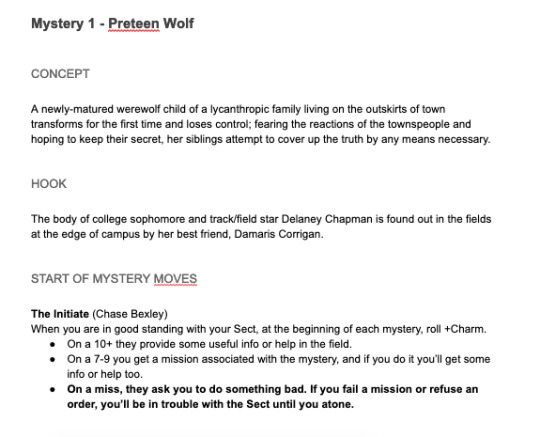
The first page of my notes is always where I put the high-level thematic stuff that I want going on. The Concept for the arc -- in this case, a complicated question of morality, responsibility, and control that comes up when you find out that the monster that’s killing people is just a kid that doesn’t really know any better. I knew that with this arc I wanted to immediately set up the season with the question of: can we say that a monster is intrinsically evil, and if they are not, how does that effect our moral responsibility in re: trying to stop/hunt them?
Some of that came from my own agenda coming into the game, and some of that came from our episode 0, with Andrew flagging an interest in this strict anti-monster sect with rigid morals and absolute obedience, and also with Roman flagging an interesting in the nature and morality of monstrosity by choosing the Monstrous playbook. I figured a question like this would instantly give them both a strong agenda, and build an interesting tension between two of the four main characters if I could get them to butt heads about it.
The hook is pretty straightforward: what direct action or effect of the monster’s presence are they going to notice first, what’s our “opening shot” so to speak. I’ve been reading the essay collection Dead Girls by Alice Bolin lately and feeling guilty about having killed Delaney off before she was ever even on screen, but at the time I chose what felt like a trope-y establishing shot for the season so that it would become very quickly apparent where I was attempting to turn certain other tropes on their head. Anyway, someday we’ll be returning to Deliverance again and all I can say is that we may or may not have seen the last of Delaney Chapman... but that’s all stuff for later.
I also always put Chase’s start of mystery move on the first page of each mystery’s notes for a few reasons -- mostly so I don’t forget to ask him to roll it, but also because his result will, in part, develop the tone that mystery’s going to have. If he rolls a 10, this is going to be a mystery where the Kindred is working closely to solve the same problem, but if he rolls a 9 or below, the group is going to be more splintered, he’ll have fewer resources on hand, and on a 6 or below, they’re going to be actively obstructing him in some way. In play, I bold the result he rolls on this page so that I don’t forget, weeks and weeks later when we’re recording the third session in the mystery, what it was that he rolled, and so I can look back later and remember the progression of his relationship with the sect.
Anyway, after all of that’s set in place, I move on to firming up the details of the monster -- powers, attacks, weaknesses, all of that good stuff. Most important is the MONSTER TYPE, which is one of my favorite things about Monster of the Week.
For anyone who hasn’t taken a look at the Keeper preparation sheets for Monster of the Week ( HERE! ) I’ll put in a screenshot of what I’m talking about so that it makes sense.

The first thing I do in creating each monster is pick its type/motivation. Some of them are really obvious, but sometimes having the opportunity to pick an unexpected or non-traditional motivation for a traditional monsters is even better. I’ll elaborate more on that some day when I do one of these posts for a later mystery, because Clara is pretty straightforward in terms of monster type. Here are her full stats:
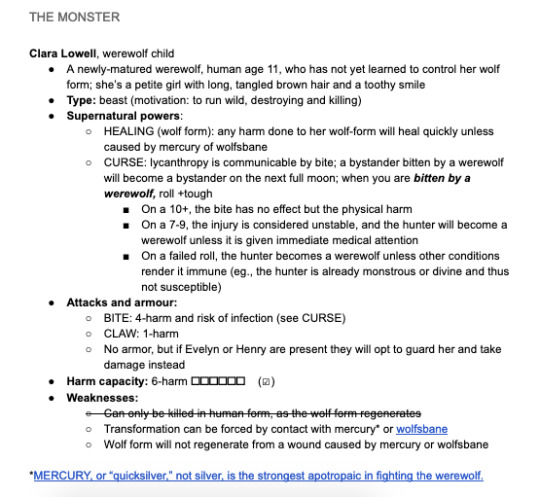
Now-- I’ll admit, at the end of the day Clara maybe wasn’t the monster in this arc. I went back and forth a lot on how to frame this arc in terms of monsters and minions, because the crew was never actually meant to fight or kill this kid. But, again, I was so interested in setting them up immediately against someone that made them question their internal concept of “monster” that I went with it. She was for me, ultimately, the central focus of the arc: the cause of the conflict, the motivation for the other involved characters, etc., even if she didn’t end up being the climactic conflict of the whole arc.
Clara didn’t appear on screen nearly as much as I expected her to: I’m not sure I ever got as far as her physical description as written here. I picked her type as BEAST because, in her uncontrollable werewolf form, that was what she would do -- so if they hurt her, and she transformed in response to that injury, that was what she’d do.
I also write this neat custom move for werewolf bites, but then none of the PCs got bitten by anyone. Still, I stand by the possibility of time-pressure and tension inherent in that 7-9 option.
As for weaknesses, my understanding of the werewolf healing process changed a little bit in play as I started to describe it happening to Evelyn, so between sessions I crossed out the original idea. I honestly have no idea, in retrospect, where I was going with the second bullet point, but thus is the fun of digital ephemera, it still lives in this google doc even though I have clearly ignored it for the rest of forever.
That link about mercury, for the record, goes to an instructables page I found for “how to kill a werewolf” -- Andrew still gets mad at me that “quick silver” not being literal is the reason he has to clarify whether anything I say is a metaphor or literal, but I thought it was way more interesting than Chase’s already having the perfect weapon (his silver knife) on hand.
Minions are up next:

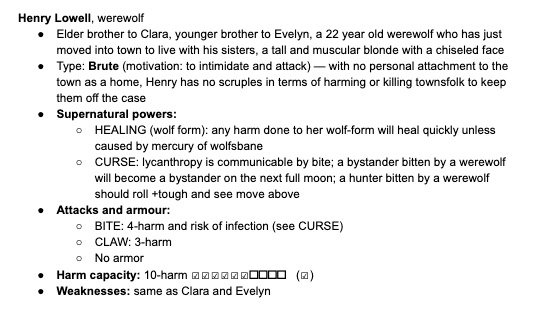
As you can see, most of the heavy lifting here was in picking their Bystander Types since all three of them were werewolves with basically the same ability. I even copy and pasted from Clara to the point where I forgot to change the pronouns in Henry’s “supernatural powers” section. You can also see the little copy-and-paste checkboxes I use to represent harm on Henry’s stats -- there was so much happening at the end of that battle that I never fully caught up with filling those checkboxes in, and I think I also had them in my paper notes (which we’ll talk about later in this post).
The big motivation here was to differentiate Evelyn and Henry as two sides of the coin: both doing “bad” things to protect their sister, but going about them in different ways, with Evelyn -- who has an investment in this town, a life here she needs to protect in addition to protecting her sister -- being subtle, less destructive, really focused on protecting more than on doing whatever it takes, where Henry -- who has just moved back, and has no attachment to Deliverance itself except his family -- was going to do anything it took to get people off Clara’s scent, killing anyone who got suspicious.
You can see that I’ve face-cast Evelyn, here -- I do this for maybe 25-30% of the NPCs I make for this show, either ones I think are going to be particularly important or ones where an image of them just immediately comes to mind. In addition to Evelyn, I think I have actors in mind for Damaris, Van, Larkin, Blanche... Maybe that’s it? I also originally had one for Remedy (blonde Zoe Kravitz) but some incredible fanart has swayed me to having at least 3 different mental images of Remedy.
I should note that my actual writing process for these notes is not in the order they appear in the doc: at this point, I usually try to at least sketch out the countdown because I’m in the mindset of thinking about the monster and what they’re going to do -- and then I fill in the bystander and location details to suit the countdown, making any adjustments to the countdown that I need to to accommodate new ideas.
But, in my notes Bystanders and Locations are next, so:
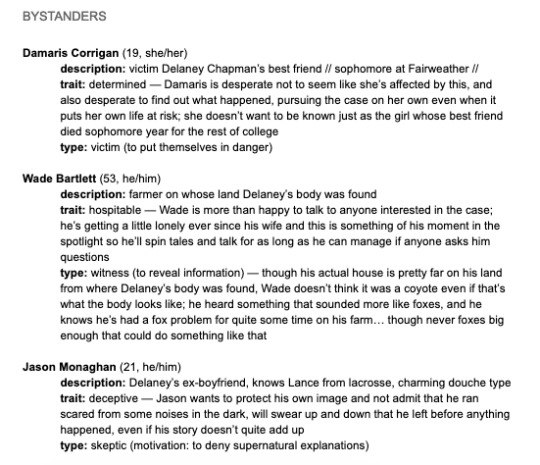

First thing of note: somehow, Sheriff Commander-Jones’ wife, the medical examiner, never made an appearance. She is just chilling in the background of this show, waiting for someone to need to talk to a coroner at the morgue, happily married to a very overwhelmed Sheriff. There are a ton of details here that never came up, and one of the things I learned from this first mystery is that I’d over-prepped the hell out of it. My bystander notes these days are a lot simpler: name, pronouns, age, brief physical description, type/motivation, and a one-word trait usually is about it.
(Melissa was going to be so good, I’m still so sad I’ve not found another way to bring her into things. Maybe someday...)
You can also see here the common symptom where I leave something (Yasumoto’s trait) blank to come back to and then instantly forget about it and it just stays blank forever. Also, I don’t know why the hell I wrote “charming” in Jason’s description. He was never truly meant to be charming.
I keep the little Keeper list of bystander types/motivations in the doc below all of my pre-made Bystanders in case I need to come up with some on the fly, but more often or not I forget to write them into the notes. Evidence: Remedy is missing from this document after I made her up on the fly when Chase needed healing.
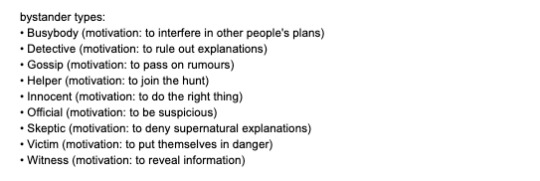
Locations are notoriously my least favorite part of prepping. I’m not good at coming up with interesting locations so I struggle through outlining the important places. I spent a lot more time on it with this arc than I do later on in the show, but my go-to is a few keywords describing the feeling/appearance of the place, and what information they might come across there.
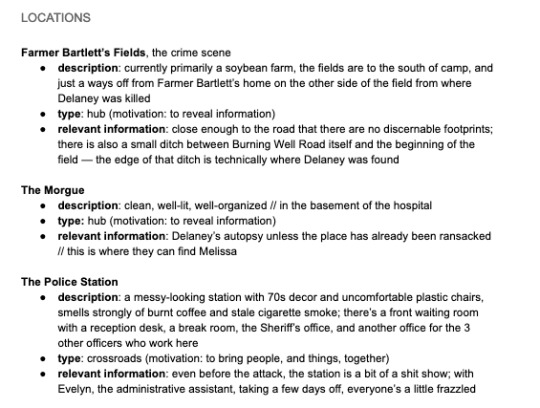

After that, we get to my favorite part of designing a mystery: the Countdown.
For those who haven’t read or run Monster of the Week, the Countdown basically represents the steps of what the monster would do if the hunters didn’t interfere, and it gives a sense of direction as to how things will progress. It’s broken up into 6 steps, and the story can move from step to step when the heroes take too long or fail rolls, etc. Here’s my countdown for the first mystery:

This one was super concrete compared to some of the ones I’ve written. A recent countdown ended “And then the world ends” or something like that, so this one was a nice, concentrated countdown for a first foray into the game.
I italicize countdown lines in my notes as they happen in play: when people stall for too long early on, or when they fail and I get to make an off-screen hard move. I think the shadows line here was activated when they took the time to take Chase back to the farmhouse to get healed, which meant they wouldn’t be able to find the information I had for them in the morgue. The rest of the countdown was altered by their decision to go after Evelyn -- because Evelyn couldn’t go after Damaris, Henry did, and thus didn’t go after the police.
I hang out on the Countdown page while we play, until I need to reference something else: it gives me a broad overview of where things are going to go, so switching back and forth between that and the list of Keeper moves on the Keeper reference sheet helps me improvise my responses to failed rolls and decide what’s going to happen as the characters go to specific place. I like keeping this focused outline of what the monster is trying to accomplish in the front of my brain at all times, because it makes it easier to decide what conflicts might arise and what threats are out and about.
The last section I prepare before we start the first session for the mystery is a broad mystery information section, which isn’t necessarily in the outline of Keeper prep that Monster of the Week provides. For some mysteries I use this a lot, for others it’s just a line or to, but it’s my catch-all space for any information I can’t fit anywhere else but think I might need.
In this case, it was both notes about werewolf transformations and also a sort of CSI-esque explanation of what had actually happened with Delaney and Jason the night before:

Again, most of this information didn’t get used -- and I’ve sense balanced out my over-prepping problem, but I almost always have something I want to remember that doesn’t fit in any of the other prep, so that’s what this section is for.
I think the biggest thing to note here is that a lot of this information is in flux: I’m always playing with what things will work, what things won’t, what will make for interesting decisions based on what the PCs are doing, and adjusting my information and planning from there. Less kill your darlings and more let go of cool ideas when better ones come up, but it’s all about being able to adapt on my feet when things aren’t going to plan. I try really hard not to imagine the full arc of the story and how I think it might go, because when I do they inevitably go in the opposite direction. My focus is more cementing the ideas and themes and questions I’m interested in so that I can find ways for those to come up no matter what the players decide to do.
Now, that’s all the prep that I do before the first session. But most of our mysteries for Deliverance take 3-4 recording sessions, so what do I do during and between?
DURING AND BETWEEN SESSIONS
During sessions, I tend to make notes on paper because it makes less noise while other people are talking than typing does (I am, as anyone will tell you, a notoriously loud typist), so write some brief notes from the session on a page for that session, and then another page of notes of whatever I’ve scrawled down immediately after we finish recording where I make note of where I want the next recording to begin -- what hooks there are for each character/group of characters, what needs to be addressed, what they’ve been in the middle of, etc.
I dug through the pile of papers I brought back with me when I moved back to the US this summer to find my scratch page notes for the first mystery (recorded August-October 2017), which are below -- a few handwritten, and one pre-game section that I decided to type because, if I remember correctly, I was making these notes during a lecture because I had procrastinated until the last minute. Major apologies for my oft-indecipherable handwriting; I’d translate, but most of the time I, too, have no idea what it says.
This one below was my post-session 1 notes, along with my general on-hand notes during the recording of the first mystery -- I’ve got harm checkboxes, Andrew’s description of the farmhouse for reference (which, admittedly, I have not looked at again until just now), and then some notes about where people are headed and what they’ve encountered and/or promised.
Looking back at those harm checkboxes, I think I nerfed Henry’s harm-count because I was pretty sure I was going to kill Chase if I didn’t. I was very much still getting the hang of how much harm monsters can do vs. how much harm hunters can do.

No, I don’t know what those numbers on the top are. I want to say that was Jason’s iPhone password?
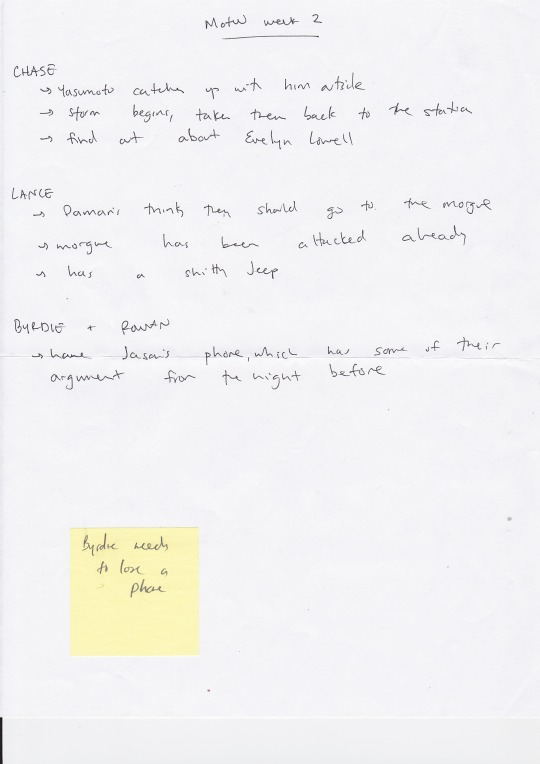
This one above is pretty typical for what my pre-session notes look like in the middle of a mystery -- each character or character group and then a quick note about where they are/what they’re going to be doing. This looks the most like the notes I take these days, now that I’ve been playing the game for a lot longer. They’re fairly sparse! Basically enough to give me an opening introduction as we start recording and then ask “what do you do?” and go off of whatever their answer to that is.
Another important note: much of this NEVER HAPPENS. “storm begins, takes them back to the station” who????? The quickest lesson I learned with this game is to not hold on to anything too tight because better things come up so quickly that you can’t afford to hesitate before abandoning ship and jumping to them.

As you can see, sometimes these notes are a “here’s what happened” or “here’s a thing you need to remember” note, sometimes they’re a “this is an interesting place to start” note, and sometimes they’re a “how the fuck am I going to get them back on track” note. Usually, I’d say, it’s that last one, with this particular group of characters. QUESTIONS are huge, in these notes -- “Where are you going now that Zeke’s kicked you out of the farmhouse?” is, I would say, the ideal kind of note for me to start off a session with.
Anyway, all that to say: for me, the real work of Monster of the Week is asking the right questions. Having a monster is important and having some idea of setting and bystanders is important, but if I had ten minutes to prep a Monster of the Week mystery, I would have: monster, countdown, and a strong hook, and I could probably improvise it all from there.
38 notes
·
View notes
Text
« Western science has systematically ignored the chaos that surrounds us in the form of waterfalls, dripping faucets, earthquakes, and smoke rising from a pipe. Instead, science has made the most of reducing nature to sets of linear equations, observing proportional relationships between force and acceleration, matter and energy, electricity and magnetism. Linear equations such as x = y + 1 are well behaved: they can be visualized by a line on a graph, taken apart and added back together, and used to predict the outcome of an action or explain the workings of a clock. Linear equations can be solved: for every y there is
one right answer for x; for y = 4, x = 5. [...]
Meanwhile, [...] mathematicians regarded nonlinear equations as "pathological," forming "a gallery of monsters.” These equations were decidedly not well behaved. An innocent-looking non-linear equation such as xn + 1 = 2xn cannot be solved to get one right answer because the terms are repeatedly multiplied by themselves (these are known as feedback loops). As a result, a small change in one variable is amplified and has a disproportional, sometimes catastrophic effect on other variables. When you plot points on a graph, nonlinear equations do not form tidy lines or smooth curves—they form loops, recursions, and discontinuities. A line might behave nicely for a while and then suddenly branch into two lines. While the solution to a linear equation enables the scientist to generalize and predict other solutions, nonlinear equations tend to be unruly and individual. Nonlinear systems are unpredictable.
[...] When I first started to read about the emerging science of chaos, I was immediately struck with similarities to characteristics that had been ascribed to the feminine: unpredictability, nonlinear processes, the importance of context, and the inseparable relatedness of the parts to the whole. This brings to mind Gilligan and Belenky and her colleagues' observations that women tend to view knowledge and moral choice within the complex dynamics of a situation—rather than based on a set of rules.
Curiously, the language of chaos theory borrows words from the world of women and the home. Instead of the ideal world of Euclidean points, lines, squares, and cubes, in contrast to the starkly abstract and efficient language of mathematics, concepts in chaos science are described as dust, webs, cups, foam, fudgeflakes, folded-towel diffeomorphisms, smooth noodle maps, curds, and whey. As feminist writers such as Evelyn Fox Keller have shown, metaphors and language shape our thought and affect scientific discourse. Chaos science is shifting how we see the world and, as a voice of the Feminine, is changing science at its roots by changing its language, the language of mathematics.
In many ways, I believe chaos science speaks with the voice of the Feminine—not that it directly furthers the feminist cause [...], but because it focuses on the relevance of attributes that have been negatively valued in Western culture. Ilya Prigogine and Isabelle Stengers, authors of Order Out of Chaos: Man's New Dialogue with Nature, emphasize that “chaos represents not just hitherto unrecognized phenomena but an unjustly neglected set of values.” I believe we can gain insight into the value of the feminine in science by exploring the constructive roles played by disorder, nonlinearity, and noise in complex systems. Like women, nonlinear systems were put aside, as women were relegated to attic offices, so as not to disturb the order of rational discourse. Like women mathematicians who were called monstrosities, the monstrosities brought together under the umbrella of chaos theory are emerging from the shadow of science and making useful contributions to our understanding of nature.
Although nonlinear dynamics were known in the 19th century, they were thought to be irrelevant to science because they could not be solved—just as feeling and warmth have been deemed irrelevant to science. Background "noise" simply interfered with an experiment, just as feeling can interfere with the efficient process of collecting data. Now chaos science is listening to that noise and finding levels of order within the seemingly chance fluctuations. [...] The feeling function's emphasis on context and the importance of personal evaluation is echoed in chaos science. Rather than statistically averaging the impact a person can make, chaos science reveals that an individual making a small change in the “initial conditions” of a situation can have an enormous impact on the final result. Just as chaos has been reconceptualized as extremely complex information rather than an absence of order, so can feeling be valued as a richly complex process.
Throughout the history of science, women have been identified with "Mother Nature" as cyclic, nonlinear, nonrational, and unpredictable. Studies of nonlinear dynamics now show that these qualities are, in fact, vital to life. For example, physiologists now identify chaos with health because nonlinearity in feedback processes serves to regulate and control. In other words, a linear process, given a slight nudge, tends to remain slightly off track. A nonlinear process, given the same nudge, tends to return to its starting point. Arnold Mandell, who studies dynamic systems in the brain, says bluntly, “When you reach an equilibrium in biology you're dead.” Biological systems are open systems that maintain a dynamic equilibrium of flow and exchange with the environment. The masculine Aristotelian ideal of complete order—of everything forever in its place—leads to death. »
— Linda J. Shepherd, Lifting the Veil: The feminine face of science
10 notes
·
View notes
Text
I use the tag #aesthetics on here quite a bit and I thought I’d explain why when, in multiple circumstances, the things I’m referring to aren’t ordinarily associated with aesthetics as such.
For many writers and thinkers, aesthetics refers to a curious branch of art analysis which refers to the sensuous feeling of a work of art and pertains only to its beauty. I’ve never really understood why aesthetics is separated from the categories of politics or ethics or any of the other pragmatic stuff art is so infused with because, to me, it is all relational. Aesthetics, for me, is simply another convenient word for form, and how can form not be intimately connected to meaning and thus connected to that which is political and ethical? For example, a favourite writer of mine is Vladimir Nabokov whose most famous book is Lolita. The high-flying decorous “style” of that book is intimately connected to the very thing it supposes to contrast: the monstrosity of its internal narrator. But even without exploring that very clever and very ontological connection (fanciness with monstrosity), I’m always asking myself why a particular aesthetic style (like Humbert Humbert’s) is valued like it is. Why does it induce a tingle in the spine? Why does it feel good to read purely based on an image or a flash of an association?
I absolutely think these questions can be understood by a materialist conception of history and a robust analysis of ideology; and I also think aesthetics contains a lot more than many people actually like to suggest. For example, it’s my view that the stylistic choices of a novel make up its ontology (no matter what the “actual” reality behind the book is) and that different images and associations (be they similes or metaphors) embody what the work is trying to communicate intellectually, not necessarily visually. The really great thing about language is that it can be used to express something meaningful without it immediately jumping the semantic gulf into the visual. Like when Angela Carter writes of a particular character writhing around like a fish. To me, this (along with other associations previous) conjures a sensation of a fat fish wriggling around. This doesn’t mean I’m imagining that said character has transformed into a fish or that I’m only imagining one thing. What it does mean however is that I am holding two (or more) associations simultaneously in my head, combining them semantically, and imagining the connection visually and non-visually. This is really hard to explain because what I think I’m trying to get across is what I think people’s brains are doing in the midst of reading which is so simultaneous that a linear style of writing (all writing) can’t convey it appropriately.
I guess what I’m really getting to is to saying that the categorisation of different aspects of reading is fraught with anomalies because reading is such a complicated act filled to the brim with zooming and zipping associations which are happening nonstop as more and more information is released to the reader.
3 notes
·
View notes
Text
Lesleigh Owen, Monstrous Freedom: Charting Fat Ambivalence, 4 Fat Studies 1 (2015)
Fat bodies are gendered. Fat bodies are raced. Fat bodies are classed and sexed. They are fascinating, repulsive, empowering, and reviled, often all at once. They are symbols of contradictory, ambivalent, even paradoxical rhetorics. They are hated, reclaimed, ignored, and fetishized. Fat bodies are deemed unworthy of public accommodation and coded in media as sexual and gross, lazy and powerful. These spaces of duality and contradiction are immensely important for many reasons. Fatness is not only defined by what it is not (i.e., “normal,” “healthy,” “attractive,” “moral”) but actively serves as an example that reinscribes those scary, shifting boundaries between normalcy and monstrosity.
Fatness in popular culture and in our lived experiences straddles a host
of cultural lines. As a site of ambivalence and paradox, fatness serves as a powerful mirror, reflecting some of U.S. citizens’ deepest fears and desires. Fatness, that scary, liminal, shadowed place where certainties fizzle and boundaries fade, serves as a bridge between these contradictory categories.
Theorizing and Studying the Ambivalent
A number of theories exist, each of which, like different lenses, could shape this article on fat ambivalence. The first is DuBois’ double consciousness, or the process of viewing oneself simultaneously through one’s own
eyes and the eyes of privileged others and, because of cultural inequal
ties, finding oneself supposedly lacking (DuBois, 2005 [1903]). I could also approach the topic of fat duality using the metaphor of borderlands, ala Anzaldúa (2012 [1987]), cyborgs, using Haraway (1999), or the trickster, per 30 Hill (2011). All of these approaches, focusing as they do on navigating the ambivalence of mixed or partial identities, are enormously useful, but I am more interested in discussing the absolute horror of these dualities, the visceral reactions individuals have to, and the resistant possibilities contained within, the ambivalence represented by fat bodies. In this article, I place U.S. discourses, or rhetorics and practices, into the center of my analysis. How do cultural constructions influence how fat persons understand fatness, and what resistant possibilities emerge when fat bodies straddle contradictory discourses?
The theory most germane to my analysis is Kristeva’s (1982) abjection, which she describes as that which “disturbs identity, system, order. What
does not respect borders, positions, rules. The in-between, the ambiguous,
the composite” (4). Abject bodies are sources of horror, marginalization, and shame; as such, fat bodies are exemplars, existing as they do within spaces of contradiction and chaos. Many theories address ambivalence, even 45binaries, and how we negotiate them as members of Otherized groups.
I am particularly interested, however, in the immediacy, the viscerality, of
the abject. Located quite literally on individual bodies, the concept of the abject captures the horror, fascination, terror, and titillation of fat bodies as
they live, breathe, and represent. Fat bodies are scary and repulsive precisely because they throw cause and effect into question, blur supposedly sharp lines between seeming opposites (think im/moral, over/consumption, a/sexuality), and encourage us to rethink the divisions between the scary and monstrous Other and the safe and socially appropriate Self.
My methodology of choice for this article is critical discourse analysis. This includes analyses of popular cultural and interpersonal representations
and messages about fatness and fat persons. Critical discourse analysis is defined as a research approach or goal that “adequately and relevantly produce[s] insights into the way discourse reproduces (or resists) social and political inequality, power abuse or domination” (Anonymous, n.d.). Foucault identifies discourse as the site for the merging of knowledge
and power. Discourse becomes a “point of resistance and a starting point
for an opposing strategy” (Foucault, 1995 [1977]: 26). Bettie (2003) sees dis- courses and practices as inseparable, defining discourses as “constellations
of ‘knowledge,’ together with institutionalized social practices, which are 65 politicized and result in an array of possible subjectivities” (54). I agree with Bettie that experience (or practices) and discourses cannot be separated.
In this way, popular rhetorics become embodied, creating a cycle with many points of rupture. Therefore, fat bodies as constructed and enacted through dissonant discourses are inherently vast and contradictory and potentially 70 resistant. It is this very plasticity of discourses (as rhetoric and performance)
that allows for contradiction and offers opportunities for resistance.
My proposed project includes charting places where discursive ambivalences occur. I argue the places where opposites coexist destabilize categories and allow individuals to question their legitimacy in organizing experiences. The discursive is personal, and conflicting but coexisting discourses result in ambivalence. Ambivalence is a personal feeling stemming from cultural forces; it is a place where individuals can question and rework anti-fat rhetorics. Likewise, when I discuss monstrousness, I am addressing the effects of situating fatness on the margins. Monsters exist to scare us, and fat bodies are held up in popular and medical cultures as cautionary tales to help scare good girls and boys into normalcy while also lumping into one category (monstrous, or wrong) the resistant possibilities of straddling cultural ambiguity and ambivalence.
“Within mainstream representations of the body, the fat body functions as the abject: it takes up the burden of representing the horror of the body itself for the culture at large” (Kent, 2001: 135).
Other authors and I have written elsewhere about fatness as straddling
the boundaries of consumption and overconsumption, asexuality and hyper- 90 sexuality. While these topics are essential for making sense of fatness in our modern world, I am moved to explore some of the other places where fat encompasses and contradicts cultural contradictions.
I highlight abjection not only to make sense of fatness as a space of ambivalence but also because I think the abject is a space rife with resistant 95 possibilities. The Free Dictionary defines ambivalence as “the coexistence of opposing attitudes or feelings”; it is, in short, the juggling of opposites (“Ambivalence,” 2013). Fatness terrifies us in part because, existing as it does along the margins, it embodies deep cultural ambivalences and contradictions.
In the subsequent sections, I explore four sites of ambivalence as rep- resented by fatness: biological and social, inside and outside, attractant and repellant, and presence and absence. It is my hope that, in the dance of opposites and their uneasy, often paradoxical, coexistence, we can find points of rupture and opportunities for resistance.
The Sociobiological, or the Biosocial
The meaty natures of our bodies make us enormously uncomfortable. Invested as we are in the Western mind/body dichotomy (for an extended discussion, see Bordo’s [1993] Unbearable Weight)—or the privileging of the rational mind over the emotional and “natural” body—most of us like to think of ourselves as masters of our physicalities. Our bodies remain separate from us, docilely awaiting our commands, clay for the determined sculptor. We must merely exercise the strength of will, the story goes, to overcome their unruly fleshiness and triumph in a world of intellect.
Unfortunately, fat bodies are not quite so tractable. They are, in fact, fleshy and stubborn—obviously so. Fat bodies consistently resist our attempts to exert dominance over them and fold them into culturally sanctioned origami. This is never so apparent as when we place fat bodies on diets. Although most of us, regardless of size, will try them, 95% of us will fail at our attempts to dominate our bodies through deprivation (AKA dieting; Garner and Wooley, 1991). Despite the $61 billion per year alone spent on weight loss products in the United States in 2012 (LaRosa, 2011), most of us will ultimately remain just as fat as we were when we began; many, in fact, will become larger (Garner and Wooley, 1991). Our bodies will be not be whittled down.
U.S. citizens hear daily that our bodies are too large and too monstrous. Despite the booming weight loss industry, fat bodies remain. Given the failure rate of dieting, this is inevitable. But diets fail, the pop culture and medical rhetoric goes, because people in the United States lack willpower!
As persistent as those messages have become, modern citizens of the United States, steeped as we are in an online, socially mediated space, many of us experience cognitive dissonance when we engage with these messages and see the actuality of failed diets everywhere in our worlds. As 56-year-old Bonnie, a self-identified fat woman I interviewed during my dissertation research, told me, “[I was] pissed when I had my heart attack. Why was I dancing four times a week for years? The doctor said it was probably some strain placed on my heart by all those years of yo-yo dieting.” Not her fat but the supposed cure for it caused her heart attack. Such spaces of dissonance create possibilities for challenging sizeist rhetoric. Just by being, the fleshy existence of fat bodies shows the weight loss industry as a lie; therefore, is a byproduct of, a targeted demographic, and an obvious failure of weight loss.
According to Morgan and Scott (1993), the symbol of the monster, the abject, exists to embody and assuage our fears of the natural and unruly body. In order to maintain the current social order, which privileges the intellectual and social over the emotional and biological, fat bodies must become monstrous. They are failures. They are the abnormal that delineates
the boundaries of normalcy.
In this way, fat bodies quite helpfully delineate the boundaries between good and bad citizenship. As Cavallaro (1997) notes, which bodies we vilify
tells us a great deal about the bodies of ideal citizens. The cultural discourses we use to construct, categorize, and marginalize the very real, lived experiences of disabled and fat bodies help us define proper citizenship, including the duties and expectations of bodies vis-à-vis the state.
Another excellent example that illustrates the relationship between social and biological can be seen in how clothing shapes bodies. It didn’t occur to me for a long time that my clothing did anything but express my identities and mask my nakedness. Sometime in my early thirties, however, after attending a convention organized by a national size acceptance organization and witnessing several fat bodies of all shapes, sizes, colors, and abilities doing everything from swim to model clothing, I finally understood the message I’d parroted for years: the appearance of fatness is neither homogenous nor purely biological. Watching waistbands settle into indentations in tummies, witnessing bras sliding into grooves under arms and around the back, I realized our very bodies are literally shaped by our clothing options. We wear clothing designed to fit our bodies (theoretically, for fat persons); at the same time, clothes shape the bodies that wear them.
There it is, undeniably, written across bodies too large to hide: We are products of our cultural processes and artifacts as much as we produce them. We do not dominate our environment; we coexist with it, shaping and being shaped by it. In this way, our bodies are both biological and social constructs.
Fatness, Inside Out
Theorists can and have used Kristeva’s (1982) theory of “abjection” to characterize cultural representations of marginalized, Otherized bodies. However, I am more interested in focusing a bit more narrowly on actual bodies, or, more specifically, on our supreme discomfort with their meaty reality. This is nowhere more apparent than when we examine orifices, those sites of deep ambivalence and anxiety (Kristeva, 1982). Abject bodies are, in part, defined by an exaggeration of their relationships with orifices, an exaggeration that blurs lines between self and world (Bakhtin, 2005).
Whether naturally occurring or not, holes in our bodies make us nervous. This is in part because we regard our innards—our selves, if we buy
into the Western body/mind duality—as contained within our skin. We move through our scientific, rational, bureaucratic U.S. society as if we have very
few biological needs, as if we are brains in (unfortunately fleshy) jars (Weber,
1958 [1920]). Our orifices, those small but significant points of ingress and egress on our bodies, belie this myth, prove that we are meaty organisms
that must be biologically maintained. These holes in our bodies scare us precisely because they call two Western ethics into question: the supremacy
of the social over the biological (addressed in the previous section) and the belief in our discrete (read: boundaried) individuality (Bakhtin, 2005).
Fat bodies live. They breathe. They sneeze, sweat, menstruate, eat, talk, drink, urinate, vomit, belch, and defecate. In fact, many bodies do every one
of these things, but fat, similar to other abject bodies, are more regularly linked to them. Fat bodies are regarded as disgusting in part because they
are considered more biological, more tied to their processes, their orifices.
Fat people, who are, the story goes, universally out of shape, sweat more. They also supposedly eat more; in fact, fat persons serve as visual shortcuts for gluttony. They certainly excrete more. Finally, fat people are dirty, a word we tend to associate with coming into contact with bodies and nature.
And then we have fat persons’ skins. Skin is quite literally liminal; it forms the tangible boundary between in and out. As such, it is a highly contested space. In our postmodern, U.S. culture, in which we use visual elements to gauge morality and worth, we often are our skin, much more so than the tendons, muscles, and bones beneath (Jameson, 1984). Skin is merely our most obvious bodily organ, and yet we regard it as the stationary 205 boundary between self and world. As Bakhtin (2005) and Kristeva (1982) might argue, our skin, and all the fluids it contains, form the boundaries of our self, our individuality). Any time we stretch, puncture, burn, color, or permanently alter it (in non-mainstream ways), we compromise this fragile
and all-important barrier. We become monstrous (Shildrick, 2002). In stretch- 210 ing the skin in a way different than that of “normal” bodies, fat bodies become grotesque. Fat tummies push through space, sometimes ahead of
the rest of fat bodies, fat calves drape over ankles, fat underarms woble and ripple beneath bones. It is flesh uncontained, bodies gone wild. Fat persons compromise the cultural requirement of taut boundaries that 215 contain proper—and dare I borrow from Foucault and say “docile,” or self-regulating?—selves (Foucault, 1990 [1976]).
It is not, however, only the potential of “letting ourselves go,” both bodily and ethically, that fat skin threatens. Fat bodies rend space. They arch forward, to the side, their meaty reality punching holes in the space bubbles 220 dividing us into individuals. These bodies defy the tiny spaces allotted to us, individually and interpersonally; they invade and redefine the public sphere. Fat bodies are uncontained.
In short, fat bodies transgress the boundaries of self versus other, individuality versus community. All bodies interrupt others’ personal spaces from time to time, of course, but fat bodies, constructed as they are as “too big” and extrusive, anger many of us with their insistence on occupying more space than normative bodies. All bodies occupy certain spaces, but bodies we’ve deemed “too big” give us permission to express our frustration with these uniform, confining spaces; we can channel our anger onto these “wrong” bodies rather than these constructed spaces that reify “appropriate” body size. This becomes especially apparent when fat bodies try to navigate a physical, tangible environment built with thinner bodies in mind. In a physical world built with normative bodies in mind, where we expect each person to fit into their standardized, rational allocated spaces, fat bodies seemingly take up too much space.
I am reminded of the ever-ready example of fat folks on planes. On an airplane, my fat body overflows the seventeen inches of seat space allotted it by the airlines; not incidentally, this number is based on studies that report the average U.S. backside measures fifteen inches (Patterson, 2012). To use Kristeva’s (1982) language, my body leaks outside its prescribed parameters. Airlines have constructed these small spaces to maximize their profits, and many (perhaps most) of us do not fit them comfortably. Nonetheless, my body inching past the armrest, the arbitrary barrier of this arbitrarily defined space, can and has infuriated persons sitting next to me. It is their space, they tell me. Yet, wish and try as we might, my body cannot be confined to “my” space. My body’s refusal to conform to these arbitrarily defined social and interpersonal boundaries makes us all uncomfortable, may even infuriate my seatmate. This is due in part to my unruly body calling into question dozens of questions: Is space really divisible? If so, who has the right to divide it, and why? Does the space into which my fatness leaks really belong to my seatmate? Should spaces remain uniform, or should they expand or contract as needed? Where does their space end and mine begin? And, if space is ours, is part of us, where do they end and I begin?
Fat bodies, those embodiments of liminality, challenge boundaries between inside and outside, or what we’ve come to regard as who we are and what belongs to us. Inside versus out, self versus body, even us versus them: fat bodies in all their fleshy glory threaten these boundaries, thereby calling their legitimacy, their very existence, into question. Fat bodies are reminders that our one-size-fits-all isn’t—and perhaps shouldn’t.
Deliciously Gross
Representing excess in appetites and lack of willpower, fat bodies should/will/do horrify us. Proper bodies are neat, tidy, easily categorized
and stored. We are taught to hate corpulent bodies, to find them hideous.
Yet, at the same time they repel us, fat bodies exert a strong pull we are unable to refuse. We hate fatness, and yet, there is something so appealing, we cannot help but discuss it, analyze it, measure it, ponder it, wonder what it feels like, inside and out. Whether we are fat ourselves, we revel in it every single day.
Fat persons are monsters, neither quite human nor devoid of humanity, neither and both strange and familiar; as such, they are disturbing and ambivalent beings that exert the twin and opposite forces of attraction and repulsion (Shildrick, 2002; Braidotti, 1999).
How I hate you! You’re gross! Can I touch? LeBesco (2004) captures this contradiction in her appropriately titled Revolting Bodies. Fat bodies, she claims, serve as symbols of what is revolting, disgusting, horrifying. They embody the threat of what we are or could become, writ large. At the same time, they are revolutionary, powerful transgressors of social boundaries and dictates. Fat bodies are, as the title of Braziel and LeBesco’s (2001) anthology suggests, out of bounds. We are fascinated, horrified, titillated by their embodied ambivalence, their transgressive nature.
In this rational, bureaucratic world, ruled by visuality and numbers, fat bodies loom as statistical outliers. By daring to be “too” big, fat bodies bypass and belie categories based on statistical averages. My previous example of airplane seats provides one example; others include seatbelt length, weight limits on everything from exercise equipment to carnival rides, size of clothing and medical equipment, and so on. Many of these examples exclude fat persons by virtue of not accommodating their body sizes. This is often humiliating, sometimes dangerous, and occasionally even fatal. Fat folks do not fit; neither do they fit in. For better or worse, fat bodies defy markers of averageness, that modern representative of “normalcy.”
Even if they wanted to, many or even most fat persons cannot embody cultural definitions of health, beauty, and docile citizenship. This can be
both dehumanizing and liberating. Regardless of whether or not this is true,1 295 those who are not fat may well regard fat persons as free from the dictates of health and beauty. This is no small matter, as, at least for women, beauty has become a cultural requirement, a “third shift” that helps determine their moral worth (Wolf, 1991; Featherstone, 1991). As Wolf (1991) claims, pressures for women to participate in the cult of beauty rose in direct proportion to the legal rights they have won throughout the 20th century. Beauty is now a cultural imperative; not “doing” it in some way is not an option for women in the United States.
Many regard fat persons as escapees from the tyranny of beauty, people
who tunneled their ways outside the walls confining everyone else. They may be ugly, but by god, they are free. True, not, or something in between,
this belief inspires both envy and fury. How dare fat folks go about their lives, thumbing their noses at the very institutions into which so many women and
men buy stock every day? We fear them, we hate them for reminding us of
the permeability of the boundaries between health and disease, beauty and ugliness. We are in terror of becoming these ugly and unhealthy beings . . .
yet, how wonderfully freeing failure must feel.
Many of us live in terror that fat persons have somehow “gotten away with” something. We can find examples in language of this simultaneous resentment and envy. One example is the phrase “letting oneself go.” This is used constantly in magazines, on daytime talk shows, in warnings from friends and parents to new brides and college frosh (usually of the feminine sort). What does this mean? Explicitly, of course, it is a warning not to succumb to bodily appetites and risk gaining weight and losing one’s visual appeal. Implicitly, however, “letting oneself go” implies gaining freedom from some kind of imprisonment. “Letting oneself go seems to me to imply not only a physical looseness but perhaps also a rather scary escape from the dictates of oppressive beauty ideals” (Hartley, 2001: 65).
The second example comes in the form of that ubiquitous statement “She cannot get away with that.” Once again, the phrase usually works to police body presentations, in this case, clothing choice. Translated, it means “He has donned clothing in an attempt to represent a certain kind of sexiness; however, tied as ‘sexy’ is to notions of thinness, youth, and ability, his fat body stretches the boundaries of these definitions. I am left with the choice of either recognizing the category of ‘sexy’ as arbitrary and oppressive or dismissing this body as deviant.” In fact, the person can “get away with it”; she already has! This speech act is a recognition of the transgressiveness of fat bodies (“getting away with it!”), an attempted neutralization of the threat, and a reclamation of one’s investment in an unequal status quo.
Fat bodies are monstrous, but there is freedom in being a monster. This horrible freedom draws and repulses us, marking fat bodies as sites of deep horror, resentment, attraction, and desire.
The Living Dead
If one believes popular rhetoric, fat persons scarcely have time to live, skirting the edge of death the way they constantly do (Kent, 2001). Given the representational absence of genuine fat personhood, and in spite of living in bodies that actually do have pulses, fat persons experience their own identities and selves in a negative space, a place of cultural absence. In Butler’s (2006) Precarious Lives, she discusses how such rhetorical absences of actual experiences renders bodies invisible and therefore unlivable. Fat bodies cannot be recognized, fat voices heard, fat experiences recognized, when fat persons’ existences remain buried under rhetorics of disease, damnation, and death. Fat persons do have not enough space allocated to them, both physically and discursively. This absence of fat subjectivity, or personhood, renders their lives unlivable, their voices mute. Fat persons as individuals rather than pathologies are, as Coleman says of stigmatized persons, symbolically dead to us (Coleman, 2010).
Fat persons are the walking dead; they are mindless, ambulatory appetites, trapped in limbo between life and death, unthinking slaves to their undead body’s appetites. According to Canguilhelm (2005), the opposite of life is not death but the incompletion and distortion of monstrousness. Fat people represent such death and incompletion.
This sounds dire, but death is also a metaphor for the end of some- thing and the beginning of another. Precisely because they are rejected as objects of beauty and health, fat persons can move beyond objectification and into subjectification. Free from many cultural dictates, fat persons can explore new, and possibly more inclusive categories of “health,” “beauty,”
and “productivity.”
Discussion: Resistant Possibilities in Ambivalence
Clearly, fat bodies in their ambiguous, fluid, and liminal states are deeply threatening. They simultaneously create and straddle, define and defy, the boundaries between social and biological, self and other, attractive and repulsive, presence and absence. The consequences are vast: Researchers have reported a 66% increase in cultural and interpersonal sizeism (Puhl and Heuer, 2009); fatness is reviled as a social threat surpassing terrorism (Biltekoff, 2007); more than 50% of doctors regard their fat patients as awkward, unattractive, ugly, and noncompliant (Foster et al., 2003); fat persons experience many of the same, stigma-related ailments as many persons of color and persons with disabilities (Muennig, 2008); fat persons bring home thinner paychecks than their non-fat counterparts (Colliver, 2005; Associated Press, 2004); and perhaps most damaging of all, fat folks live in a material and symbolic world built for smaller bodies that do embodied citizenship “right.”
This does not mean the ambivalence characterizing fatness is universally disempowering and harmful. As we saw above in the discussion of the terrible freedom of fat persons from the tyranny of health and beauty, resistant possibilities exist within abjection. Ambivalence means the coexistence of opposites; when an entire group of people represent two conflicting discourses, the legitimacy of these rhetorics, mindset, and actions are called into question. Ambivalence can be a key to questioning both sides and navigating a space between or around them.
It is in the in-between spaces, I argue, that opportunities for change and growth exist. Why else would be these spaces cause us such pain and discomfort? Fatness reconstructs cultural inequalities and, by literally embodying ambivalence, contains possibilities for their reconfiguring. “It is, above all, the corporeal ambiguity and fluidity, the troublesome lack of fixed definition, that marks the monstrous as a site of disruption” (Shildrick, 2002: 76).
Finally, I can’t help but think it is the very abjection of fatness that makes
it possible for fat persons to define themselves. In demarcating and excising
an entire group, we create an identity category where none existed before. This provides a sense of commonality and community, which is essential in
the formation of social movements. Fatness is what normal bodies are not;
from this outsider’s perspective, fat persons have the opportunity to critique
the definitions that their exclusion helps form and maintain.
Conclusion
In this article, I chart some of the ambiguities and ambivalences embodied by fatness. I address fatness as sociobiological, as delineating and blurring boundaries between self and other, as creating desire and resentment by representing the horrible freedom from health and beauty dictates, and as living a fat, undead existence. In the prior section, I discuss abjection as a site for disruption and challenge to the unequal social order that marginalizes fat persons.
As I hope has became abundantly clear, one of the recurring themes when discussing fatness is a profound ambivalence. Stigmatized individuals constantly skirt two worlds: as Goffman (1963) would call them, one’s “own” and the world of “normal.” Likewise, the topic of fatness is one that elicits profound contradictions, even paradoxes. It is within and between these instances of categorical, intellectual, and emotional ambivalence that lie possibilities for resistance. Whether it is establishing community, reclaiming one’s right to personhood, deconstructing the legitimacy of such categories as “attractive” and “healthy,” or advocating for greater legal rights for persons of size, these borderlands, these spaces of ambivalence and paradox, are rife with potential for change.
Note
In reality, fat persons come in all varieties of “health” and “beauty,” although I would argue we need to remain critical of these categories.
References
Ambivalence. 2013. The Free Dictionary. http://www.thefreedictionary.com/ ambivalence, accessed June 13, 2013.
Anonymous. n.d. Critical discourse analysis. Wikipedia, The Free Encyclopedia, http://en.wikipedia.org/w/index.php?title=Critical_discourse_analysis&oldid=215519810, accessed June 11, 2013.
Anzaldúa, G. 2012 [1987]. Borderlands/La frontera: The new Mestiza, 4th ed. San Francisco, CA: Aunt Lute Books.
Associated Press. 2004. Study: Obese women earn 30 percent less. Washington Post, 430 March 3. http://www.washingtonpost.com/wp-dyn/articles/A27580-2004Mar3.
html, accessed November 11, 2005.
Bakhtin, M. 2005. The grotesque image of the body and its sources. In The body: A reader, ed. by M. Fraser and M. Greco, 92–95. London: Routledge.
Bettie, J. 2003. Women without class: Girls, race, and identity. Berkeley, CA: 435 University of California Press.
Biltekoff, C. 2007. The terror within: Obesity in post 9/11 American life. American Studies, 48(3): 29–48.
Bordo, S. 1993. Unbearable weight: Feminism, Western culture, and the body. Berkeley, CA: University of California Press.
Braidotti, R. 1999. Signs of wonder and traces of doubt: On teratology and embodied differences. In Feminist theory and the body: A reader, ed. by J. Price and M. Shildrick, 290–301. New York: Routledge.
Braziel, J.E. and K. LeBesco, eds. 2001. Bodies out of bounds: Fatness and transgression. Berkeley, CA: University of California Press.
Butler, J. 2006. Precarious life: The power of mourning and violence. New York: Verso.
Canguilhelm, G. 2005. Monstrosity and the monstrous. In The body: A reader, ed. by M. Fraser and M. Greco, 187–193. London: Routledge.
Cavallaro, D. 1997. The body: For beginners. London: Writers and Readers Publishing, Inc.
Coleman L.M. 2010. Stigma: An enigma demystified. In The disability studies reader, ed. by L. J. Davis, 216–231. New York: Routledge.
Colliver, V. 2005. Obese workers getting smaller pay: Stanford study ties lower wages to higher health care costs. San Francisco Chronicle, May 12. http://455 www.sfgate.com/cgi-bin/article.cgi?file=/c/a/2005/05/12/BUG1HCNN6A1.DTL, accessed May 13, 2005.
DuBois, W.E.B. 2005. The souls of black folk. In Understanding society: An introductory reader, 2nded., ed. by M.L. Andersen, K.A. Logio, and H.F. Taylor, 177–178. Toronto, Canada: Thomson Wadsworth.
Featherstone, M. 1991. The body in consumer culture. In The body: Social process and cultural theory, ed. by M. Featherstone, M. Hepworth, and B.S. Turner, 170–196. London: Sage.
Foster, G.D., T.A. Wadden, A.P. Makris, D. Davidson, R. Swain Sanderson, D.B. Allison, and A. Kessler. 2003. Primary care physicians’ attitudes about obesity and its treatment. Obesity Research 11(10): 1168–1177.
Foucault, M. 1990 [1976], The history of sexuality: An introduction, vol. 1. New York: Vintage Books.
Foucault, M. 1995 [1977]. Discipline and punish: The birth of the prison. New York: Vintage Books.
Garner, D.M. and S.C. Wooley. 1991. Confronting the failure of behavioral and dietary treatments for obesity. Clinical Psychology Review 11: 729–780.
Goffman, E. 1963. Stigma: Notes on the management of spoiled identity. New York: Simon and Schuster.
Haraway, D. 1999. The cyborg manifesto and fractured identities. In Social theory: The multicultural and classic readings, 2nd ed., ed. by C. Lemert, 539–543. Boulder, CO: Westview Press.
Hartley, C. 2001. Letting ourselves go: Making room for the fat body in feminist scholarship. In Bodies out of bounds: Fatness and transgression, ed. by J.E. Braziel and K. LeBesco, 60–73. Berkeley, CA: University of California Press. 480
Hill, S.E. 2011. Eating to excess: The meaning of excess and the fat body in the ancient world. Santa Barbara, CA: ABC-CLIO.
Jameson, F. 1984. Postmodernism, or the cultural logic of late capitalism. New Left Review, 146 (July-August): 53–92.
Kent, L. 2001. Fighting abjection: Representing fat women. In Bodies out of bounds: Fatness and transgression, ed. by J.E. Braziel and K. LeBesco, 130–150. Berkeley, CA: University of California Press.
Kristeva, J. 1982. Powers of horror: an essay on abjection. New York: Columbia University Press.
LaRosa, J. 2011. U.S. weight loss market worth $60.9 billion. 80% of dieters now do it themselves, highest level ever. Press release, Marketdata Enterprises, Inc., May 31. http://www.prweb.com/releases/2011/5/prweb8393658.htm, accessed
June 7, 2013.
LeBesco, K. 2004. Revolting bodies?: The struggle to redefine fat identities. Amherst and Boston, MA: University of Massachusetts Press.
Morgan. D.H.J. and S. Scott. 1993. Bodies in a social landscape. In Body matters: Essays on the sociology of the body, ed. by S. Scott and D. Morgan, 1–21. Washington, DC: Falmer Press.
Muennig, P. 2008. The body politic: The relationship between stigma and obesity-associated disease. BMC Public Health 8(128). doi:10.1186/1471-2458-8-128.
Patterson, T. 2012. Airline squeeze: It’s not you, “It’s the seat.” CNN Travel, May 30. http://www.cnn.com/2012/05/30/travel/airline-seats, accessed June 7, 2013.
Puhl, R.M. and C.A. Heuer. 2009. The stigma of obesity: A review and update. Obesity 17(5): 941–964.
Shildrick, M. 2002. Embodying the monster: Encounters with the vulnerable self. London: Sage.
Weber, M. 1958 [1920]. The Protestant ethic and the spirit of capitalism, trans. by T. Parsons. New York: Charles Scribner’s Sons.
Wolf, N. 1991. The beauty myth: How images of beauty are used against women. New York: William Morrow and Co.
#health#weight#ambivalence#sexism#misogyny#body image#fetishization#othering#rejection#marginalization#racism#classism#healthism#lookism#sizeism#sexuality#oppression#disgust#physicality#bodies#capitalism#appearances#fat#self-image#liminality#deviation
0 notes
Text
Belief--A Short Phantomquill Fic
Contains: Simon Blackquill, the Phantom, Bobby Fulbright (spoilers, no triggers. 1839 words)
“It’s kinda freaky, sir. He’s been completely bland and, like, dead inside this entire time, but the moment he heard that you’d be coming, he got all loud and cheerful! Like how he was when he was being that detective!”
Simon did his best to not react to the guard’s words, but he could not even begin to block them out.
He hated to give such drivel his attention, but he could not summon his usual composure and disdain as he walked, accompanied down the hall by the chatty security guard. The prison complex alone was enough to put his stomach in a hard, painful knot. The purpose of his visit turned the knot into tangible, physical pain.
“Cease your nattering,” Simon snapped as the guard began another sentence.
“I’m just saying, sir, it’s pretty disturbing.” The guard saw the look on Simon’s face and held up a hand to ward off the metaphorical daggers. “Okay, okay, forget I said anything. Here he is.”
Simon stopped outside the doorway as the guard swung the door open. The man gave Simon a puzzled look as he stayed still, but Simon paid no attention. He was checking himself; squaring his shoulders, lifting his head, straightening his spine, and militantly clasping his hands behind his back. He briefly fixed the guard with the cold stare he intended to keep on his stiff face for the remainder of his visit. Then, after three measured breaths, he walked into the room.
The man--the stranger--on the opposite side of the glass perfectly matched his surroundings. Clean. Unremarkable. Undecorated. Unfeeling. If Simon had seen him passing by on the street, he would have forgotten the face within seconds. If he had noticed him at all. But the moment Simon Blackquill walked into the room, the unremarkable stranger looked at him and smiled.
It was completely out of place on that bland face. It was a wide, rich, warm smile, showing off straight white teeth and expressing a familiar affection that sent a chill up Simon’s spine.
“Mr. Blackquill! It really is you! Why, I almost thought a joke was being played on me when my guards informed me I had a visitor!” the phantom said as Simon stiffly sat down in the empty chair available to him. The bland man in the bland uniform and the bland room eagerly leaned forward.
“Stop it,” Simon said through his teeth. “If you’re trying to get under my skin or somehow garner sympathy, I can tell you right now that-”
“Oh! You misunderstand me, Mr. Blackquill. I apologize. I suppose I am putting on a good face--ha!--for your benefit, but it’s really mostly for myself!” The phantom sighed and frowned, briefly reaching up and touching his own cheek. “It’s so uncomfortable to be without my personalities, I... well. I suppose it’s... frightening.”
The phantom’s face moved and arranged itself in perfect expression of everything a normal person would emote during the words he spoke, but with the simplicity and blandness of the face, it lacked any true feeling. His eyes, however, were different.
There was a gaping void of terror behind those pale eyes as he said, “I can’t stand to be nothing in front of people.”
“Are you deaf? You will not garner sympathy from me, monster,” Simon growled, resting his hands flat on the counter before him. While the man before him felt the fear of emptiness, Simon’s insides boiled with fear of seeing something of substance.
“I have no more reasons to lie to you, Mr. Blackquill,” the phantom said softly. Perhaps consciously, perhaps not, he mirrored Simon’s posture and the position of the prosecutor’s arms. “I am a dead man now.”
“As you deserve.”
The phantom smiled a perfectly melancholy smile, and his eyes darkened with pain. “A hard judgement to hear from the man I so staunchly advocated to save from the very same fate! No, no, I know. An ironic thought. After all, Simon Blackquill is truly innocent and put his life down in the name of a friend, Bobby Fulbright is nowhere to be seen, and I was determined to see you to your execution or untimely death.”
“Incredible. You’re capable of understanding the basics of your crimes.” Simon crossed his arms--then uncrossed them when the phantom did the same.
“I took no joy in trying to have you killed and my crimes kept hidden, Mr. Blackquill! I found your martyrdom to be quite pleasantly poetic, in fact. But one does what one must to ensure their survival.” The phantom tapped his index fingers together in a gesture too reminiscent of his former identity’s gesture.
“You killed my mentor. You killed untold innocents. Can you even comprehend the magnitude of what you’ve done?! Do you feel even the slightest remorse?!”
“No,” the phantom said, simply and without the slightest feeling in his voice.
“You disgust me.” Simon slammed a hand down on the table and stood, beginning to turn away. The guard by the door opened it.
“You were the only thing that made me feel anything besides the need for survival, Mr. Blackquill.”
Simon froze.
“Please try to understand, Mr. Blackquill.” The voice that came through the speaker was the voice of Bobby Fulbright, shaking slightly with fear and need.
Slowly, Simon turned back toward the window, though he did not sit again.
“I realized... all too many years ago that there are no true limits in this world besides the laws of science. I could break this microphone and never speak to you again. I could commit suicide at this very moment, right in front of you. You could draw your blade and murder the guard behind you. There are no true reasons for you not to--only the reasons we, as human beings, impose upon ourselves.” The phantom slowly, delicately wrapped his arms around himself. His hands were neither long-fingered nor thick, neither bony nor fatty, but the pressure they applied to their arms was visible. “What is there to truly prevent us from committing acts of great beauty or monstrosity?”
“We are not without the substance of humanity. Morality and reservation are built upon humanity. Which you apparently lack,” Simon answered coldly.
“Can you show me humanity, Mr. Blackquill? Can you distill it to a visible form, put it in my hand, and demonstrate its solidity and immutability?” The phantom held his hands out as if to give Simon the opportunity to do just that.
Simon answered the gesture with a look of hatred. “The mere fact you ask such questions proves your inhumanity and monstrosity.”
The phantom slowly returned to his self-hugging position.
“I am in no position to say whether you’re correct or not, of course. But the essence of my point is unquestionable--there are so many possibilities that people don’t act on, bound only by what they consider... humanity. I chose to act without bounds, without reasons. I chose to just act. I chose and chose and chose, because once I let go, there were no reasons not to choose--there were no reasons not to act. I experienced a freedom that you can only understand as a concept, Mr Blackquill.” The phantom closed his eyes. Tears that had been welling up now slid down his cheeks.
Slowly, Simon sat back down. The words, the voice, and the tears drew his eyes to the phantom’s face, and he found himself unable to look away.
“Being able to feel was so inconvenient, so cumbersome, Mr. Blackquill. It was... upsetting, if I recall correctly. Isn’t that funny? So I put it away. I stopped feeling. There were no true reasons to stop me, after all! There was only my own sense of whimsy and ability! Oh, Mr. Blackquill... you can’t even begin to imagine the things I have done. You cannot imagine the joy and the pain I have given to others,” the phantom said. Bobby Fulbright’s voice sounded so small, so sad.
“You don’t know that,” Simon whispered.
The phantom gazed into Simon’s eyes, tears still running down his face. They slipped down his throat and dropped from his chin, leaving darkened circles on his plain clothing. The void behind those pale eyes threatened to draw Simon in and never let him back out.
“No,” the phantom murmured, “I suppose I don’t. Of course. For all your aloof glances, all your bitter words and insults, you cared for me. You were comforted by me. Weren’t you? The one man who refused to fail you.”
Simon could not quite swallow or speak past the lump in his throat. His vision blurred with barely restrained tears.
“Would it comfort you now to know that, on some level, I meant it? I, or Bobby Fulbright, whichever you may choose... As much as I felt anything, I felt sincere in my words to you.” The phantom lifted a hand and rested his fingertips against the glass at the level of Simon’s heart.
“You killed my mentor. You would have killed her daughter. You meant to kill me. You lied to me. How can you say that?” Simon heard his voice shake despite his attempts to control himself.
“I told you, Mr. Blackquill. I can do anything if I so wish. And I wished to mean what I said to you. I wished to feel what I appeared to feel.” The phantom’s fingers curled against the glass and, finally, the pain in his eyes spread to the rest of his face. His mouth pulled into a trembling grimace and his brows lifted and knitted together.
“I wished so hard for you, Mr. Blackquill. I tried to remember what it was like to feel. I tried to remember what it was like to do things for real reasons.”
“Don’t,” Simon breathed, pushing himself back in his chair.
“I tried so hard to love you, Simon. I did. Please believe me.” The phantom was gasping now, practically clutching at the glass between himself and Simon. Bobby’s voice shook and cracked.
“Stop it.” Simon stumbled to his feet and stepped back, putting a hand to his mouth in some attempt to hold back his own feelings.
“Please, Mr. Blackquill. Simon. Please believe me. You did once, didn’t you?” Bobby’s voice rose in desperation and the phantom put his other hand to the glass. That plain, unremarkable face was twisted with fear, pain, and...
No.
Simon turned away.
“No. Please. Please! It’s all I have left! It’s the only good thing I have left!”
Simon stumbled to the door, practically shoving the guard aside as he grabbed the door handle and swung it open.
“You have to believe me, Simon! I love you!” Bobby screamed, pounding his hands on the glass. “Let me have this! Let me mean this one thing! I love you!”
The screams cut off as the guard shut the door. Simon ran down the hall, almost crashing into the door in front of him in his haste. He pulled it open with shaking hands and kept running.
#phantomquill#ace attorney#simon blackquill#bobby fulbright#the phantom#fanfic#REALLY SAD SHIT HERE YO#(ooc)#(mun)#simon#bobby#phantom
31 notes
·
View notes
Text
The Impossible Fish
“It’s… impossible,” said Dr. Cannon.
“Improbable,” said Dr. Webb. “Very little is truly impossible.”
“Well, this is,” said Dr. Cannon. In front of us stood Dr. Friede, and in front of Dr. Friede, there it was: this hulking, barbaric, globular, breathing object. It was a ghastly specimen of an impossible geometry, immense, spitting and mewling away on the dissection table.
“This,” said Dr. Friede, “is a fish.”
“It simply isn’t,” said Dr. Cannon. “The physiology is completely at odds with the class, so far as I’m aware – certainly with any species I can think of. There are no fins, no gills. It isn’t even in water.”
“Ah!” said Dr. Friede. “But this is what is so intriguing.” He gave the beast an unceremonious shove. It rolled across the table with increasing speed before dropping off the side and plunging into an inflatable kiddie pool laying in wait. The resulting thunderous geyser of water somehow dissolved into a delicate plop. The four of us leaned over the pool. Sure enough, there it was. A fish.
“It’s a fish,” said Dr. Friede.
“I don’t understand,” said Dr. Cannon.
“It’s remarkable,” said Dr. Webb. He began to chuckle. I stuck my hand into the water, feeling around. The fish – like a mid-sized guppy, I thought, and blue – circled my hand, then flitted between my fingers. It certainly felt like a fish. I looked up at Dr. Friede and said, “Wherever did you find this?”
Dr. Friede, perhaps surprised to hear me speaking, took a moment to answer. “I’d rather not say.”
“You must have invented it, then,” said Dr. Cannon. “Some trick of the eye.”
“No, Charles,” said Dr. Friede. “I can assure you its provenance is legitimate, as is its status. Subject it to any tests or examinations you’d like, so long as its in water. It will pass with flying colours. It’s only when you take it out that… well, that thing happens.”
“How do I know the other thing even exists?” said Dr. Cannon. “And what is it?”
Dr. Friede caught Dr. Webb’s eye. The two knelt to lift the pool. They struggled back to standing position, as if supporting a considerable weight (which it certainly didn’t appear was the case; the fish looked rather small). On the count of two, Dr. Friede and Dr. Webb poured out the contents of the pool. Water splashed across the table and onto the tile, and, lo and behold, the blubbering monstrosity sat in front of us once more, no blue guppy to be seen.
“So you see,” said Dr. Friede, “I think I’ve found an impossible fish.” There were some moments of quiet before he continued. “I know it will be controversial. That’s why I’d like one of you gentlemen to study it and publish findings with me.” Dr. Friede paused, then turned awkwardly to me. “Sorry, Nadine, but I feel a partner of significant professional standing will help the cause immensely.”
“No offense taken,” I said.
“Well, as amusing as I think it would be,” said Dr. Webb, “I have to decline. This falls too far outside anything I could claim as expertise.”
“I decline as well,” said Dr. Cannon.
“A shame,” said Dr. Friede. “I suppose I’ll have to investigate this impossible fish on my own.”
——
I know for a fact that Dr. Cannon did not think it was a fish. He grumbled as much, and constantly. Every pipette I’d hand him or reading I’d jot down was another excuse to rail against Dr. Friede’s cavalier approach, or else his myopia. “Surely he’s not setting out to redefine taxonomy,” he’d say. “Jonathan’s a pompous, foolhardy farce of an academic, but that would be beyond the pale.”
Dr. Webb, on the other hand, seemed broadly tickled but wouldn’t share his thoughts, at least with me. “It’s quite the project,” he’d say. “Fascinating.” No position was ever formally taken. I did, however, catch him skimming Dr. Friede’s reports more than once, always furtively and with a tiny smile.
What did I think? I suppose I wasn’t sure. At the time, I was still finishing my PhD. I was a mere speck compared to these titans of thought, all of whom seemed to disagree. I had lab hours every weekday, however, so naturally found myself wondering. It didn’t make sense that it was a fish, at least in the strictest sense. I may not have been at the top of my class, but even I could tell you that. Despite this, I couldn’t shake a feeling. I’d felt this mystery at my fingertips. And what I’d touched certainly had to be.
——
The university was at a funny juncture. Funding was elusive and money was tight (though when wasn’t that the case?). The Vice Chancellor was particularly focussed on those projects that were, if you’ll pardon the contextual pun, splashy. And so, in what I suspect was a monetarily-motivated move, the university threw its considerable weight behind Dr. Friede.
It was formally deemed the Impossible Fish and it was everywhere overnight. Nature featured it in both academic and more consumer-friendly contexts. VICE filmed an online feature about it. Dr. Friede went to the White House. SNL spoofed it (an “Impossible Pop Star”; the sketch, featuring Katie Perry, wasn’t very good). The public was presented a concept that was entertaining, if confusing. It was catchy enough and bendable to metaphor. So suddenly, whether or not it was Impossible, a Fish this thing was.
——
It was a Tuesday night, long after everyone had left the lab, when I had my first conversation with the Fish.
I may have invited said conversation, but only accidentally. Dr. Friede and I kept the Fish in a tank at the back of the lab, as it tended to freak out visitors otherwise. Dr. Friede had just gone home for the evening. I remained to do some final tidying up. I was wiping down the glass and talking nonsense to myself, as I often do when I’m alone. It was innocent. I assure you.
“Fish, fish, fish,” I said. “Are you a monster? Or are you a fish? What a funny fish, or faux fish, as it were.”
“I am a fish,” said the Fish.
I stopped everything, instantly. The voice I heard had no clear origin. It wasn’t behind me, nor to my side, nor in the distance. It felt like it was in me, but not of me. And even though I had no reason to think so, I knew it was the Fish. It had to be. I didn’t question it. Instead, I said, “hello.”
“Hello,” said the Fish.
“How’s it going?” I said.
“Not so bad,” said the Fish. “This tank is kind of small.”
“Sorry about that,” I said. “I’ll ask Dr. Friede if we can get a larger one.”
“Please do,” said the Fish.
I nodded. I processed. “So you’re really a fish, then, huh?”
“Of course,” said the Fish. “You see me. You’ve felt me. You know me.”
It was all so ridiculous. “I know I have,” I said. “I know you do.”
“Are you surprised?” said the Fish.
“Oh, it’s not that,” I said, fumbling for the right phrasing. “It’s just….” There wasn’t any getting around it. “I’ve seen you out of water.”
“How could you judge me by that?” said the Fish.
“I don’t know,” I said. “It seems a sensible enough way to judge things.”
“Have you ever heard the term ‘Fish out of Water’?” said the Fish.
“Of course I have,” I said. “It’s a metaphor, or idiom, or something. A turn of phrase intended to encompass someone ill-suited for something or somewhere. Because, you know, the flopping.”
“Have you paused to consider that there might be a different origin – a different intent – entirely?” said the Fish.
I paused and considered. “No,” I said. “I have not.”
“Nadine,” said the Fish. “This is what a fish is. Me. I am a fish.”
I stared at the Fish hard, and for a good long while. Eventually, I decided. “Hello, Fish.”
“Hello.”
“Goodnight, Fish.”
“Goodnight.”
I finished tidying up and left the lab. I felt strangely euphoric. It was a fish after all. And it had spoken – to me! I felt important, special, valued. It didn’t even trouble me a few days later when I realised I’d never told the Fish my name.
——
Two weeks passed. I hadn’t fully written off my conversation with the Fish. I had, however, began to question how much of it had been embellished in my memory. Sometimes – often – recollection is coloured that way, forced into a rose-tinted, romantic realm and out of its natural state. But then the Fish spoke to me again.
It was the same as before, this voice projecting from within me. We made some small talk. It asked again about the tank. I said I’d follow up. We spoke again at the end of the week. Soon we spoke every day, eventually even those when I didn’t visit the lab. I found I could respond to the Fish by thinking about words instead of saying them, even if it was initially alarming. I surrendered to the disorder and unpredictability of our conversation. I let it intrude upon my mind. I did not love the Fish, nor hate it, nor fear it. It was a fish, after all. I simply found it fascinating.
Then the Fish stared asking for things.
I’d gotten the Fish a bigger tank in the end, one that might more comfortably house its fully-realised form. Following that, the Fish asked if I could negotiate time spent in the air, ideally outside of office hours. It took a month or so to convince Dr. Friede to let me supervise these sessions. Then it wanted me to read it things, to feed it things, to attend to an increasingly manic set of whims and whimsies. It was hard to keep up.
Meanwhile, Dr. Cannon and Dr. Webb began to complain about my lack of focus on their projects. I was apparently missing details, forgetting specifics – to be blunt, screwing up. Dr. Cannon in particular was livid about the delay in some protein sequencing that he claimed delayed one experiment indefinitely. I didn’t know what to do. I felt like I had no choice. The Fish was with me always, and very difficult to ignore.
After all, the Fish was still perplexing to me, which must have made the situation more intriguing. Attempts to suss things out were, frankly, addictive. Not that the Fish gave me any clarity on the matter, or would ever let me tell. The Fish only spoke to me, it said, and it liked it that way. Should I seek any assistance in my own interrogation, it would be my word against, well, a fish. I had to keep going as things were if I were to ever figure the Fish out. And when something big and impossible and intriguing asks of you, how can you say no?
——
It was months and months and months after the Fish had first showed up when it asked what I now surmise it had always wanted to ask me.
“What if,” said the Fish, “ I didn’t have to be in the tank at all?”
It was a Friday evening. A previous version of me would have been out, drunk and sinking into the depths of some anonymous bar in Bushwick, but this me wasn’t. Something about the Fish’s question jarred. It didn’t feel quite right. So I turned to the Fish and said, simply, “Why?”
“Why?” said the Fish. Its voice dripped with incredulity. “You ask me ‘Why’?”
“Well, yes,” I said.
“You’ve never really questioned me before.”
“I supposed I haven’t had the occasion.”
“I simply like it in the air,” said the Fish. “What’s wrong with that?”
“Nothing, in and of itself,” I said. “But…”
“But what?” said the Fish.
“It just isn’t very fish-like.”
“Oh Nadine,” said the Fish. “I thought we were through with this.”
“Yes, no, we are,” I said.
“I am a fish,” said the Fish. “I am.”
“I know,” I said.
The Fish was quiet for a second. “But what if I want to be something more?”
I held my breath as long as I could. “What’s wrong with being a fish?”
“Nothing’s wrong with it,” said the Fish.
“So what do you want?” I said.
“Nadine,” said the Fish. “Think of the potential.”
“I thought you liked being a fish,” I said. “I thought you were a fish.”
“I am,” said the Fish. “And I am so many other things.” The fish began to grow, its guppy-like qualities mutating with every centimeter it gained.
“But that’s impossible,” I said. I backed away from the tank. “This is impossible.”
“What’s so impossible?” said the Fish. “You’ve seen me like this before. You see me like this all the time.” It was now double its initial size, starting to lose its fish-like shape entirely, and still growing.
“Fish can’t do this,” I said, continuing to back away.
“This Fish can,” said the Fish. “This Fish can do anything.” It grew and grew.
I was nearly at the door by this point. “Why are you doing this?” I said. I found I was somehow in tears.
“You pretty idiot,” said the Fish. It was large enough to fill its tank, which shattered. Glass flew everywhere, grazing the Fish and littering the lab. The Fish wriggled, howling, bleeding, laughing. “I can do WHATEVER THE FUCK I WANT.”
I fled the lab, leaving it and the Fish behind.
I tendered my resignation the very next day. Shortly thereafter, the lab closed as well. Dr. Friede was fired and accused of fraud (this seemed fair, as he’d clearly known the Fish wasn’t a fish for a while). Dr. Cannon found a new post in the equivalent department at a rival university, escaping relatively unscathed. And as far as Dr. Webb was concerned? He’d known better than to engage and had set up an additional lab affiliation so as to sit this project out. It was I alone, for a moment, off to ponder my next steps.
You know what they say.
0 notes
Text
What is this; and why is it here? Who am I?
This is going to primarily be a blog about Goat Control, and various concepts and musings I have about the format, both currently (in its re-re-reemergence in my local scene as an alternative to the contemporary format) and back in the moment, sometimes juxtaposed. It will mostly be to try and articulate some feelings I haven’t yet fully formed and hope this medium will force me to do so. Though, I hope you dear readers can get something out of it as well. I thought of myself as an adequate player at the time, improving up until my first departure from the game following the Perfect Circle format/ introduction of Destiny Heroes. Since then I’ve come and gone in and out of the game to various and mild successes. If you told 14-year-old me I’d long for the days where my “only” complaints about the game were, “Oh, the dude opened trinity on me…” Or “Got sacked by a ripped BLS/Snatch/Ring” I’d probably kick you in the knee. Yet here we are.
My name is Jon Sturick, formerly and firstly TheMysticOne-LV4 (I’m judging my twelve year old self pretty hard, as I’m sure, are you) back in the good old Pojo days, followed by theSAVAGEindian, modeled after theSAVAGEcanadian, and my Jae Kim/Team Savage fanboyism on duelistgroundZ (Sorry OD), jayhawn on several sites and forums and finally the Bluest of Goat Tokens you see here today. This is going to be an unnecessarily long winded, and probably uninteresting to most, history of my experiences with, and tales regarding, the game that consumed and shaped so much of my adolescence. So, if you’re here for goat stuff, it’s coming. I just have some things I’d like to finally write down first.
My history with the game dates back to the North American release in 2002, where I begged my mother to buy me the starter decks on ebay after watching the show, which she did. I’d play with my friends, not entirely sure we were following the rules correctly. This is because I, of course, would play all the high attack tribute monsters played by the characters in the show, letting my friends use “those other cards,” but I’d frequently lose. Therefore, obviously, we must not be playing correctly.
As my collection grew so did my deck. Back in the day there was no main deck limit and my strategy was not very refined. It was along the lines of, “All my cards are cool, so all my cards go in the deck.” -- At least the ones that I can legally play. I still followed the rule that you can only play three copies of a card and adhered to the limited and semi-limited card list. In my elementary school we were allowed to bring in our stuff and do with it what we would during lunch and/or recess. There had been no huge issue after Pokemon Cards came and went. However, one day, I made the mistake of bragging about my Gate Guardian and how much money it was worth ($80 according to ebay at the time). Naturally it got jacked, and I was devastated. It was my only secret rare other than the Gaia the Dragon Champion that I pulled in my first ever pack. Worst of all this little prick was parading it around and had his parents write him a note saying they bought it for him. My family and teacher had some pity for me and bought me a few packs, attempting to replace the missing centerpiece of my collection. The game had three expansions at the time (Legend of Blue-Eyes, Metal Raiders and Magic Ruler) so they got a little of each because they didn’t know the difference. This is blessing in disguise eventually ended up accelerating my first “break” into the tournament scene, as I ended up with staples such as Raigeki, Mirror Force, Heavy Storm, Pot of Greed and an extra copy or two of Fissure, Trap Hole and Man-Eater Bug. These powerful cards would have otherwise been inaccessible to a youngster such as myself.
One day, after agreeing to accompany my mother to the mall on the condition she buy me a pack of cards, I discovered a Yu-Gi-Oh! tournament being run in the back of the store. I ran the idea of participating the next weekend by my mom. She was initially disinclined to acquiesce to my proposal of carting me to the mall at 9am on a Saturday. She also wasn’t thrilled about the prospect of sitting in the mall with me until I was done, either. She eventually agreed after my insistence that I’d be okay alone, and that I’d call her after every round. Not to mention I’d keep the sharpest eye of all time on my things, lest we repeat the disaster that happened in school.
I remember sitting on the bench outside of the comic shop in the mall at 9:30am before my first ever tournament with my tin of cards, containing my deck, before the store opened at 10 and feeling nervous and alone. It wasn’t the typical pre-tournament jitters, peppered with an anxious excitement that I’d eventually come to know and love. I was just scared. I was no stranger to competition as I was naturally quick witted, and able to adapt well on-the-fly, for my age. The consequences of which were my friends and I challenging each other to video game triathlons, decathlons; marathons in every sense of the word (because I’d never sit, always standing, pacing and jumping) in every game we owned, trying to prove our superiority. However, I was not with my friends. This was no test of reflexes or dexterity. There were no mini-games to practice and memorize. I had no way to prepare for what cards would be in their deck, nor could I know what I would draw from my 325 card monstrosity. Eventually people began to file in and I gave the man behind the counter $5, and told him my name. I tried to articulate my strategy, which to him probably seemed like anxious babbling, which it almost certainly was. I was looking for validation or even any friendly notion to calm my nerves. I got no such gratification, so I went in the back and watched some kids play games before the event started.
The pairings were posted, and I noted how long this list of names seemed and the fact there were almost as many people in the back of this store as one of my classrooms. I sat down across from a teenager, and began nervously struggling to shuffle nearly every card I owned. I won this match. I’m not sure how, but I remember being very pleased with myself nonetheless. The next round I was mercilessly destroyed by a different teenager who seemed totally disinterested that I had flipped my trap card that did damage to his life points. Defeat after defeat followed and I went home, tail tucked between my legs, but exhilarated by the prospect of this new challenge. The following week, a similar tale of defeat, but with much less anxiety. I challenged every person who would agree to entertain the notion of playing against this little kid, losing most games. After this tournament one of the older kids there, Jake B, asked to look through my deck. I was wary, because I noted his shock, then amusement and eventual interest in the Mirror Force I flipped on him in my round one loss, but I agreed. I watched, hawkishly, every motion of his hands as he began separating the cards in my deck. First, he asked if I wanted to trade. A quick, “Nope.” was my reply. He then chuckled and sighed and recommended that I run as few cards possible, as close to the 40 card minimum that I could in order to maximize my chances of drawing my more powerful cards. As he helped sort through the giant heap I once called my deck in order to create a considerably more concise pile of cards, I relaxed and realized he was just trying to help. Upon later inspection I noted many of the cards remaining said, “destroy” in the text, or had 4 or fewer stars and relatively large attack and defense.
I insisted on keeping my one copy of Alpha, Beta and Gamma, the Magnet Warriors, in my deck as they had a similar strategy to my beloved and departed Gate Guardian. The next week I found myself thrashing kids who only a week prior showed no interest in our game together, as the outcome, in their mind, was never in doubt. I finished with a score of three wins and one loss, still being metaphorically eviscerated by Hamad, the near-silent Middle Eastern gentleman who sat in the corner. We began the top 8 cut and I was paired against Jake, who was still very intimidating to me, despite last week’s friendly assistance. I managed to win this game as well and was next playing a fellow by the name of Josh Eller. Josh was tall, confident and borderline arrogant, though depending on who you asked, extraordinarily arrogant... and a dick. This brazen confidence could only be displayed by either a master, or a fool. I would quickly come to realize during our match he was certainly the former, as he annihilated me in game one. In game two I drew my most powerful cards early on and was able to overwhelm him. I managed to win game three by protecting my Beta the Magnet Warrior with all manners of traps and removals, just as Jake had showed me. Josh was so upset and frustrated by this loss to such a novice, he punched a hole in the drywall. Despite my understandable fear at the time, that hole soon morphed into a symbol of pride for me. It was a marker of my victory that day that stood, covered by a poster, until the store’s departure from Shoppingtown Mall.
I was in the finals. My excitement was short lived as I had to play Hamad again, and again got pummeled. It wasn’t a disheartening loss, despite its one-sidedness, as the way he played his cards proved to me there was much more strategy than I had previously believed. You didn’t need to, and in fact, shouldn’t, play a card just because there was an instance in which the card can be played. This concept seems simple, but it was foreign to me. I had only ever played card games like Uno and solitaire before. It allowed me to think much more critically and begin to develop strategies on my own and make more insightful reads on my opponents. Deep stuff for a twelve year old. I was hooked. And I belonged.
0 notes